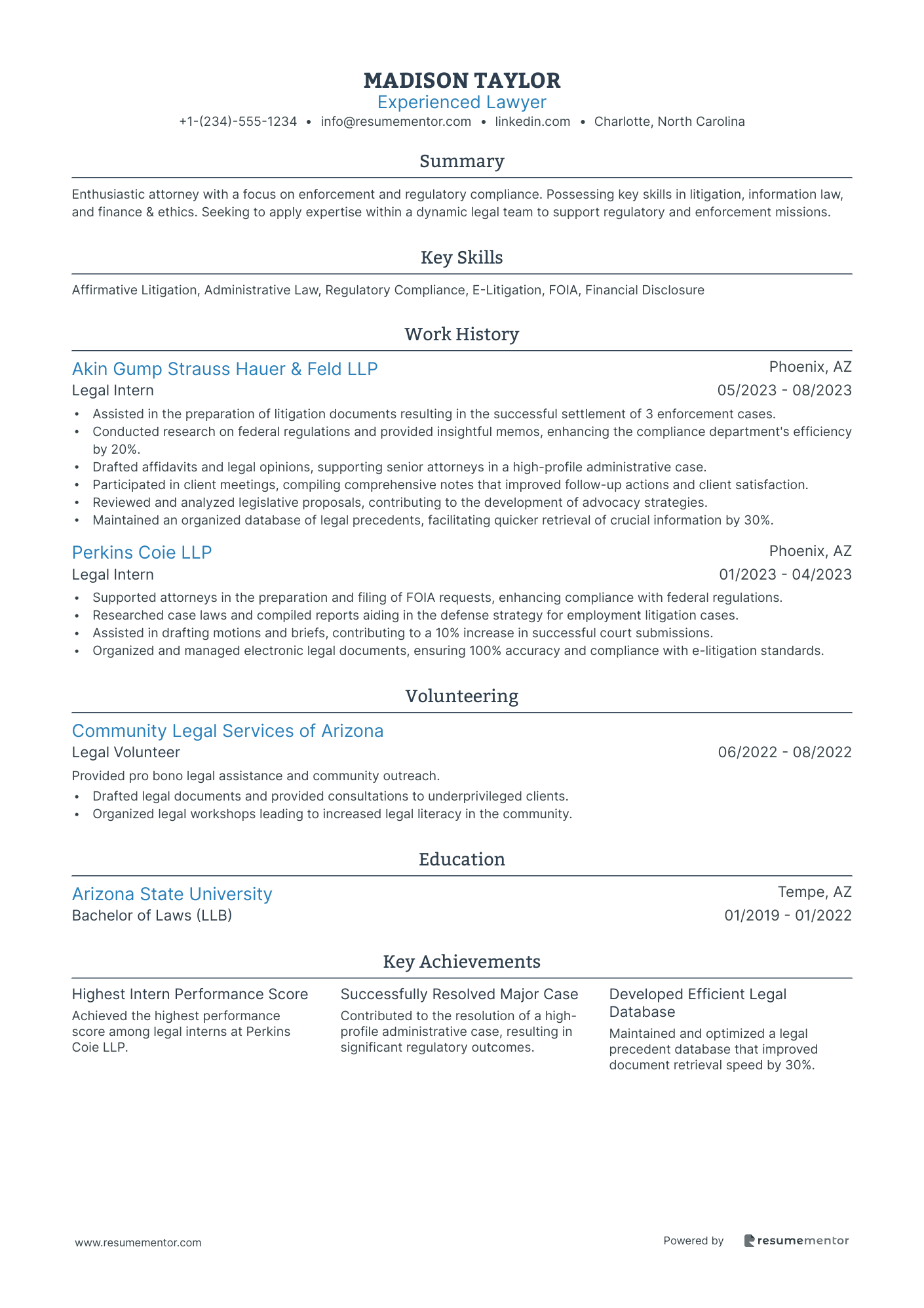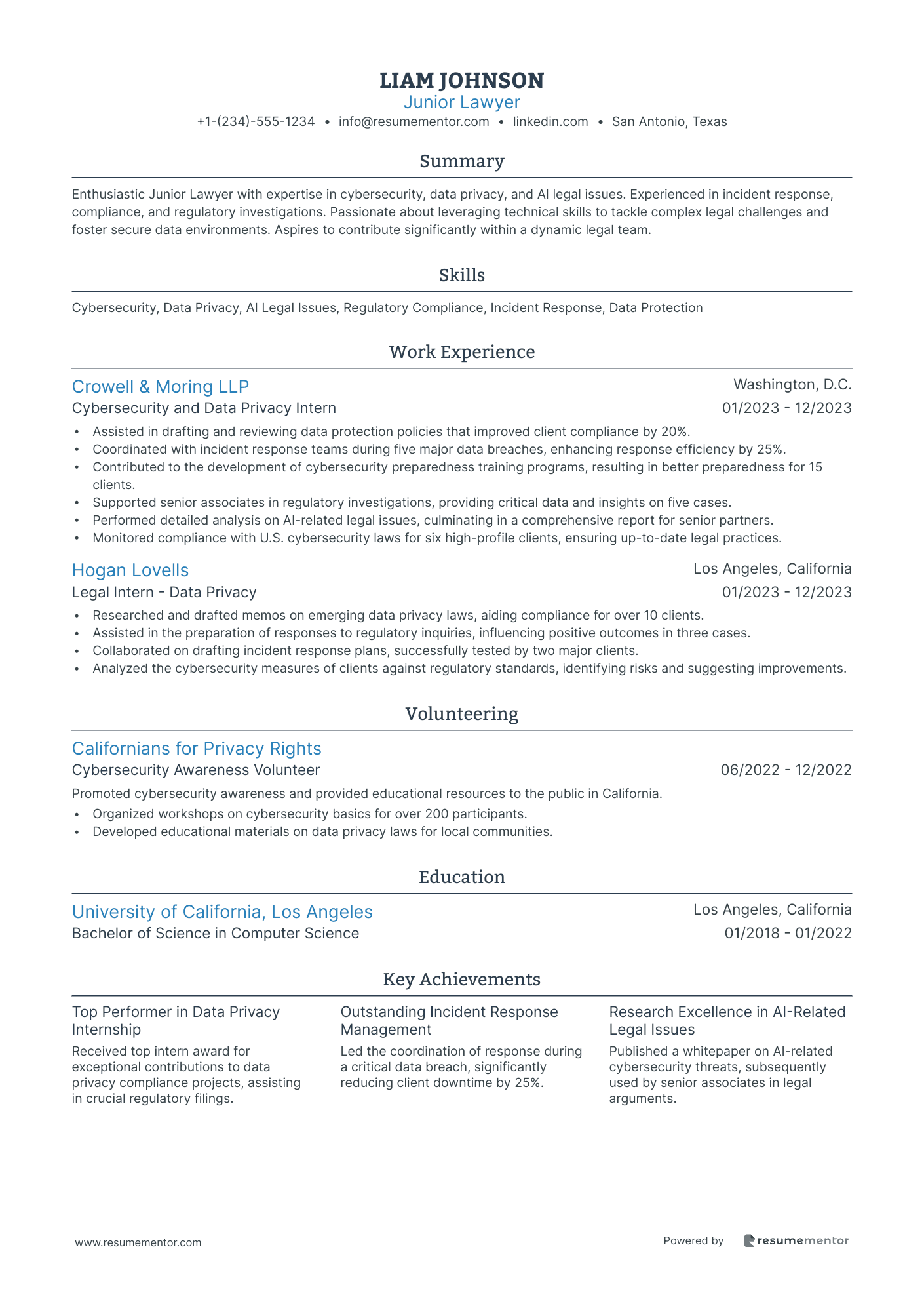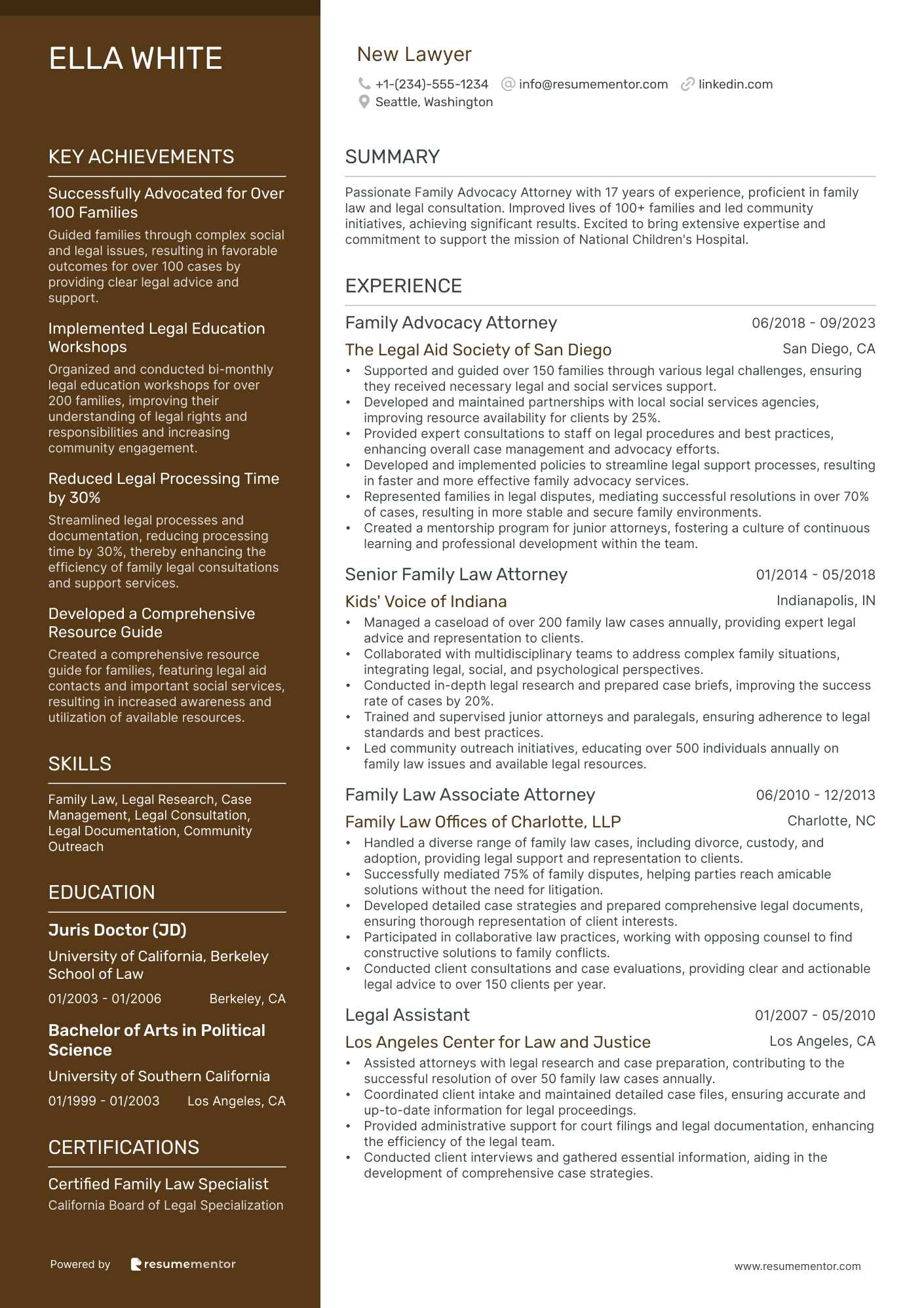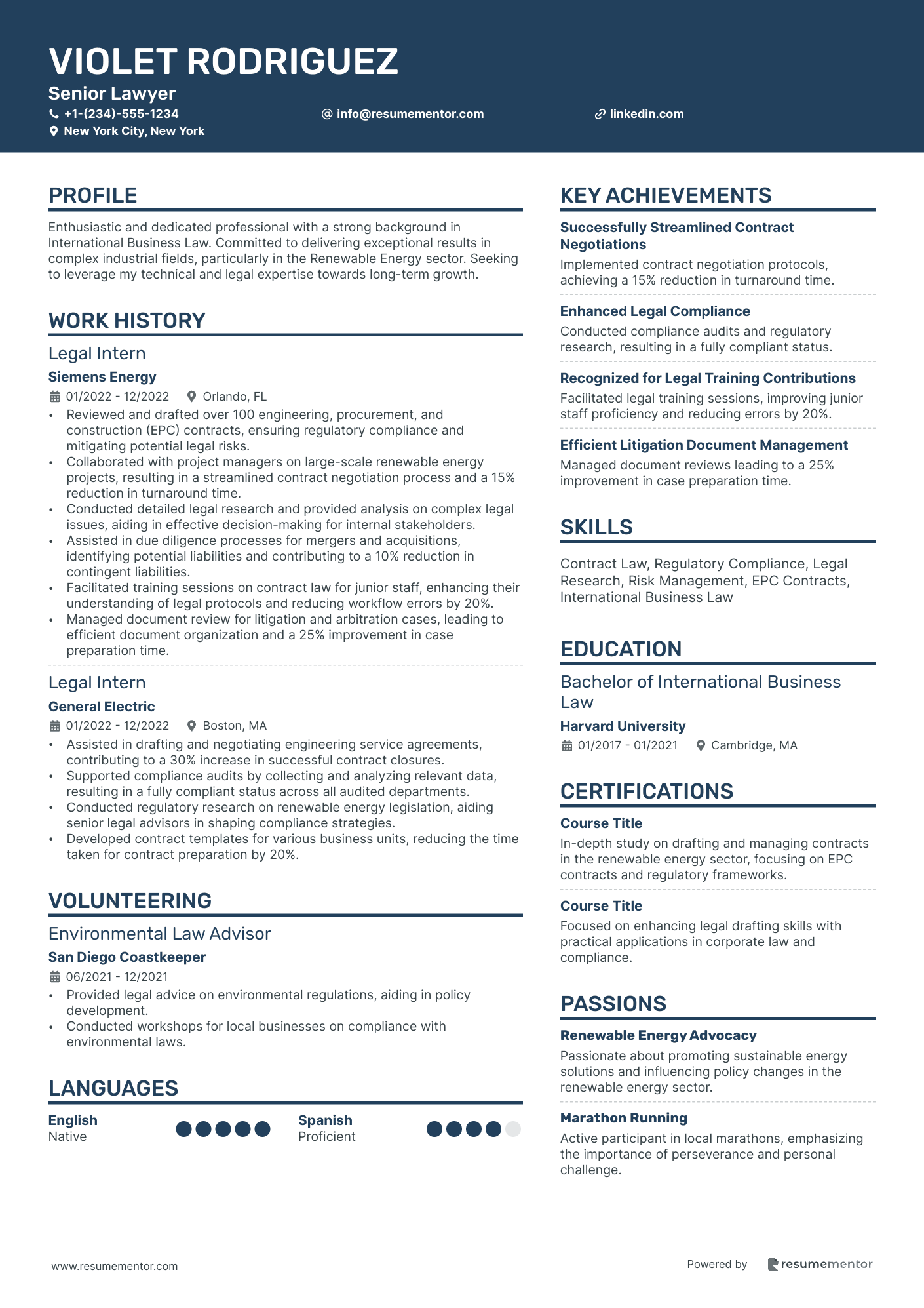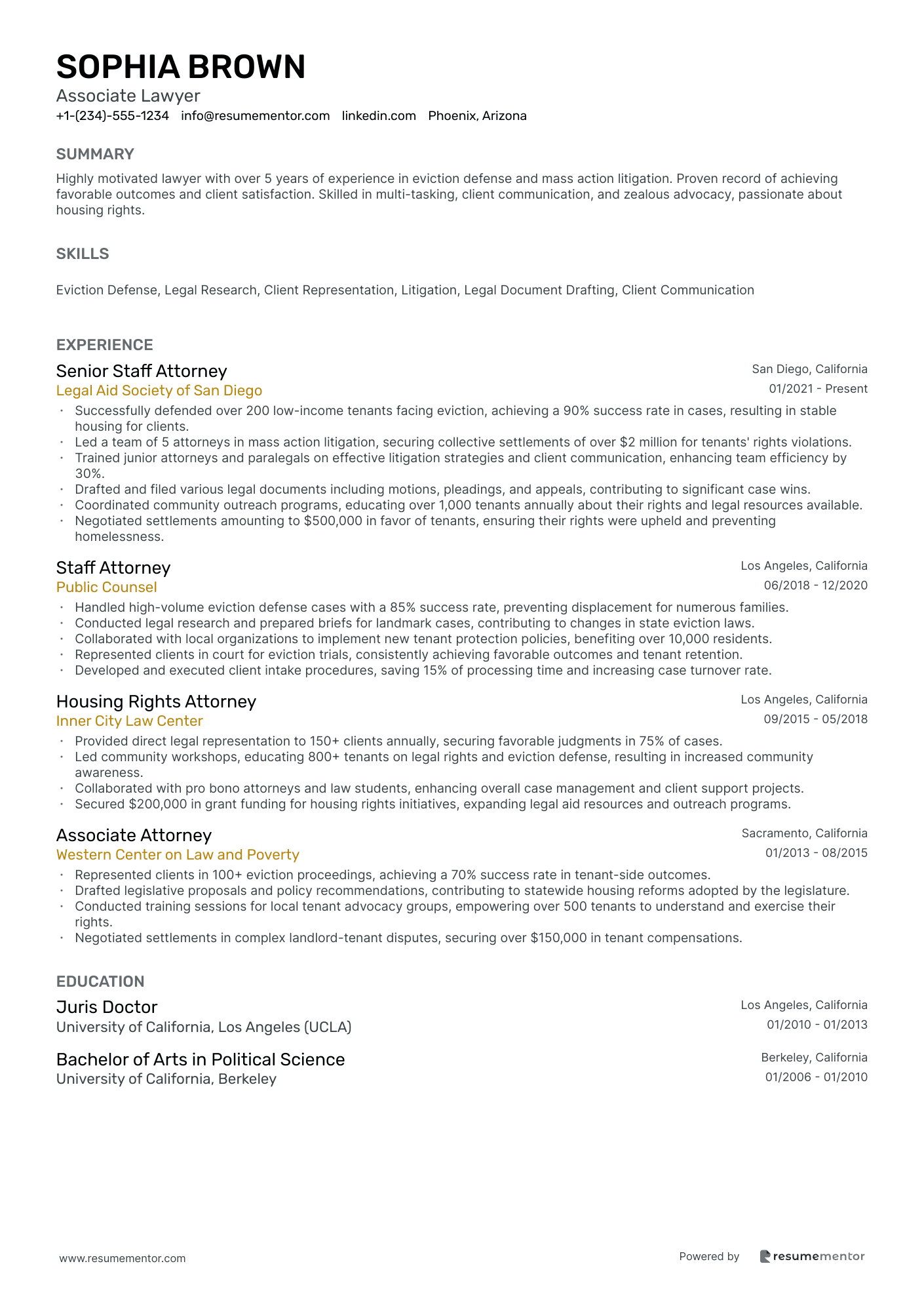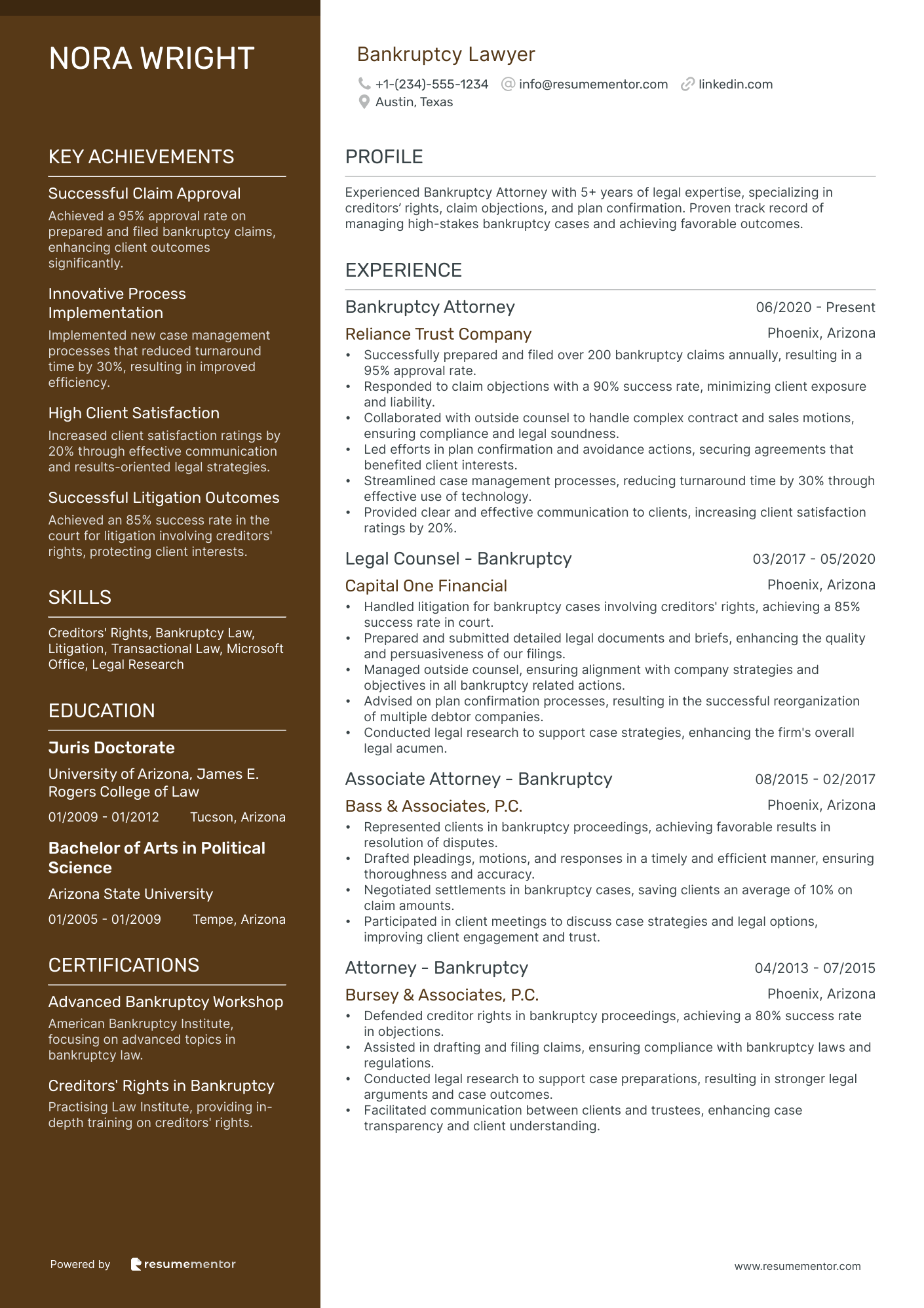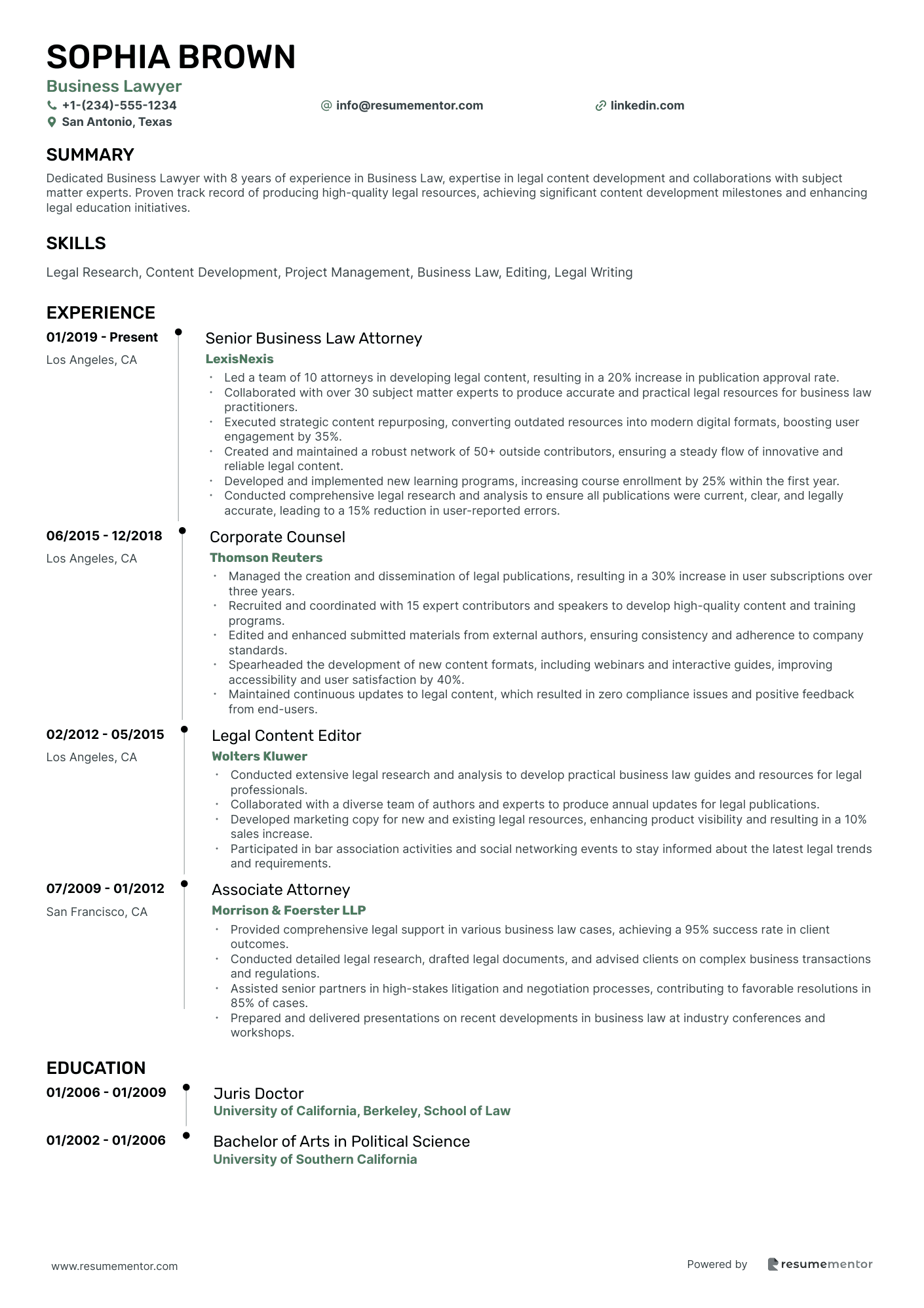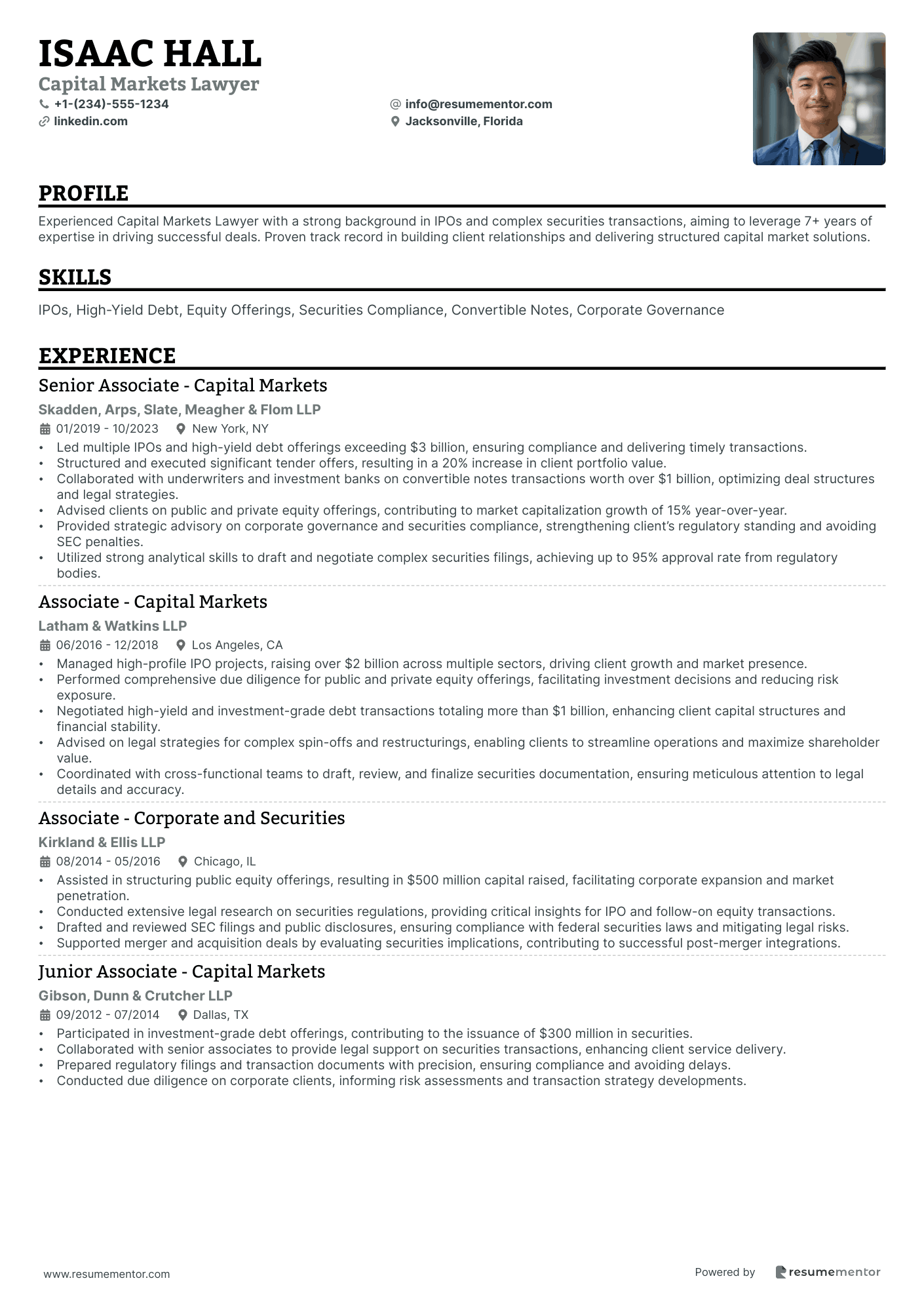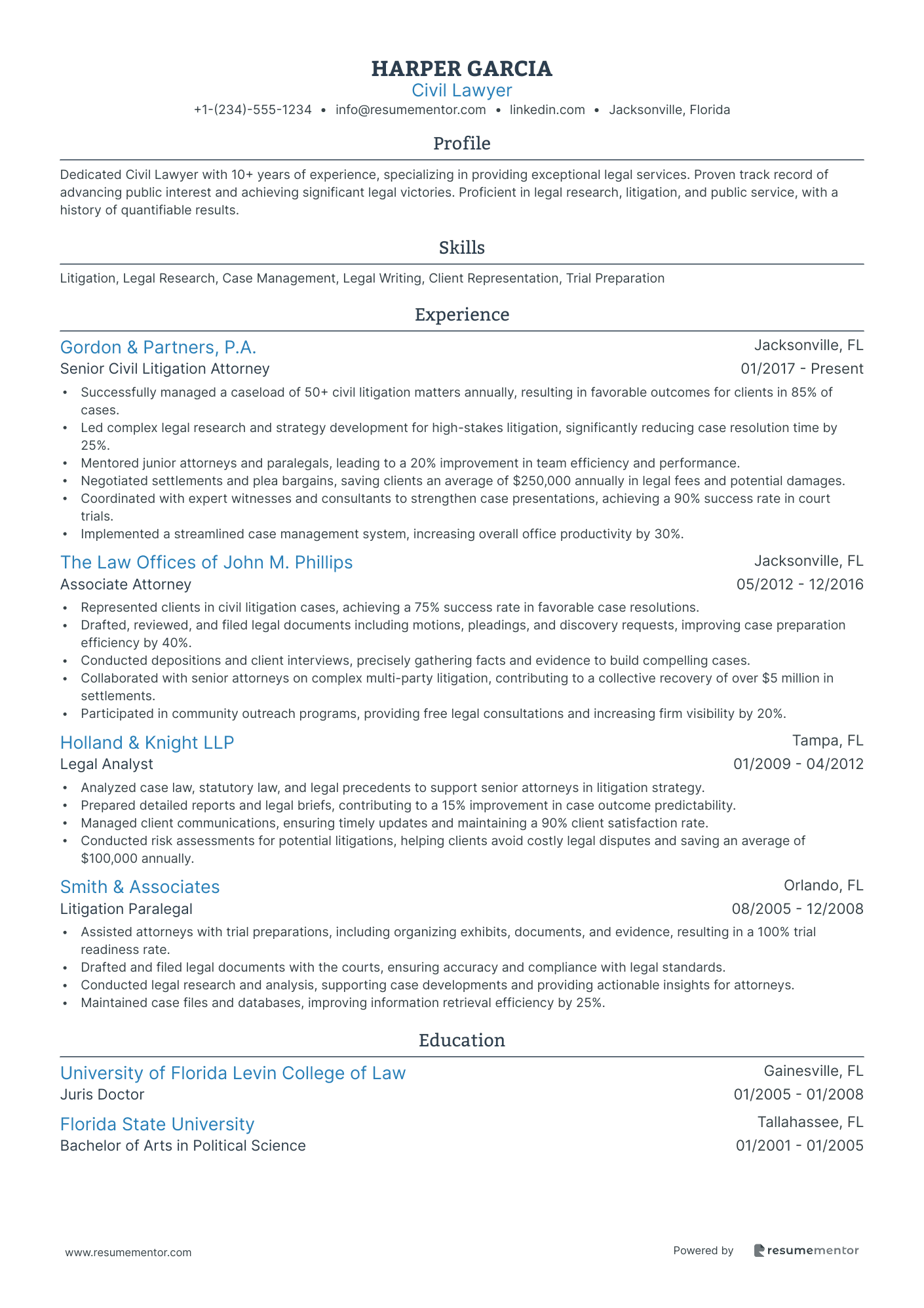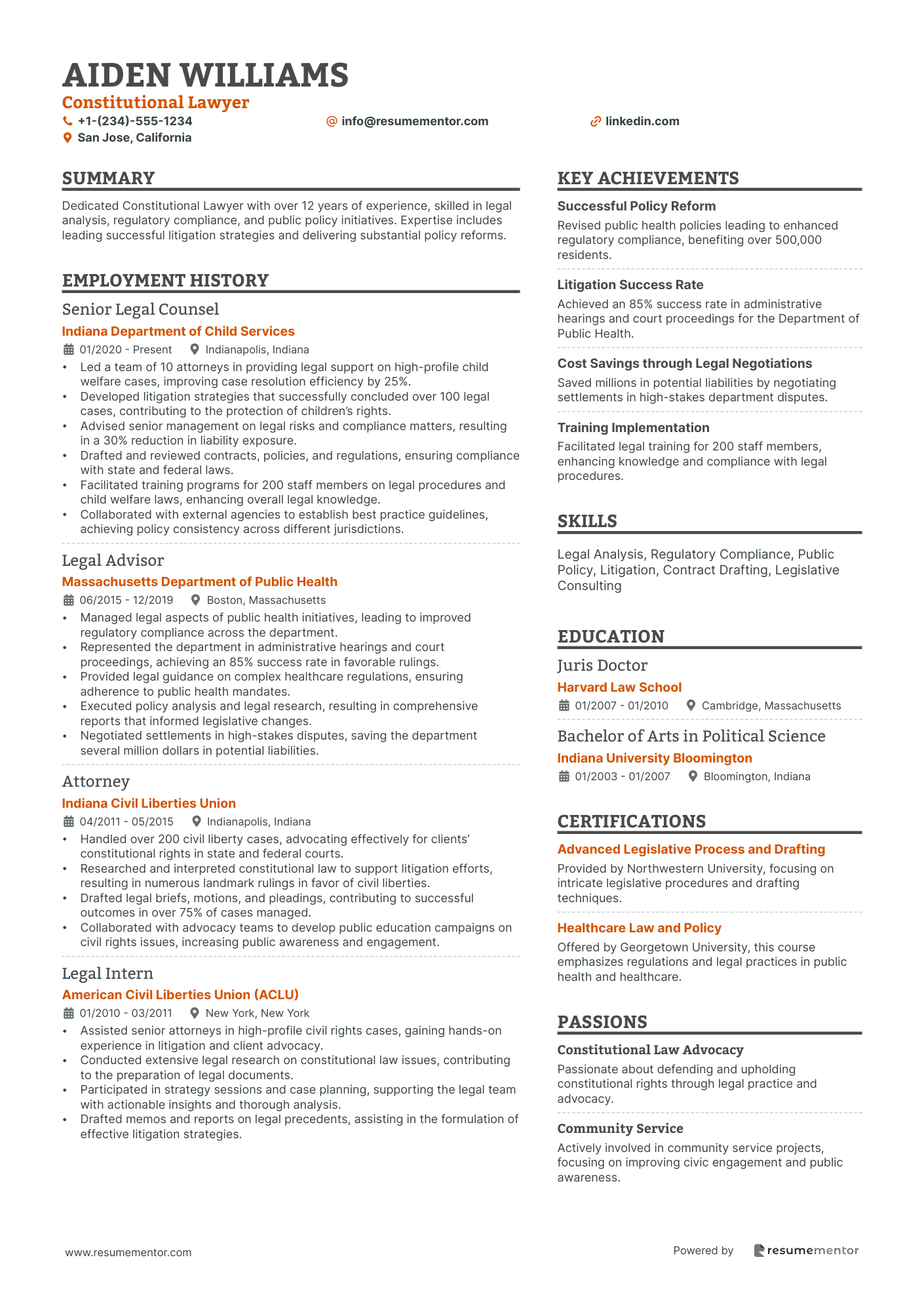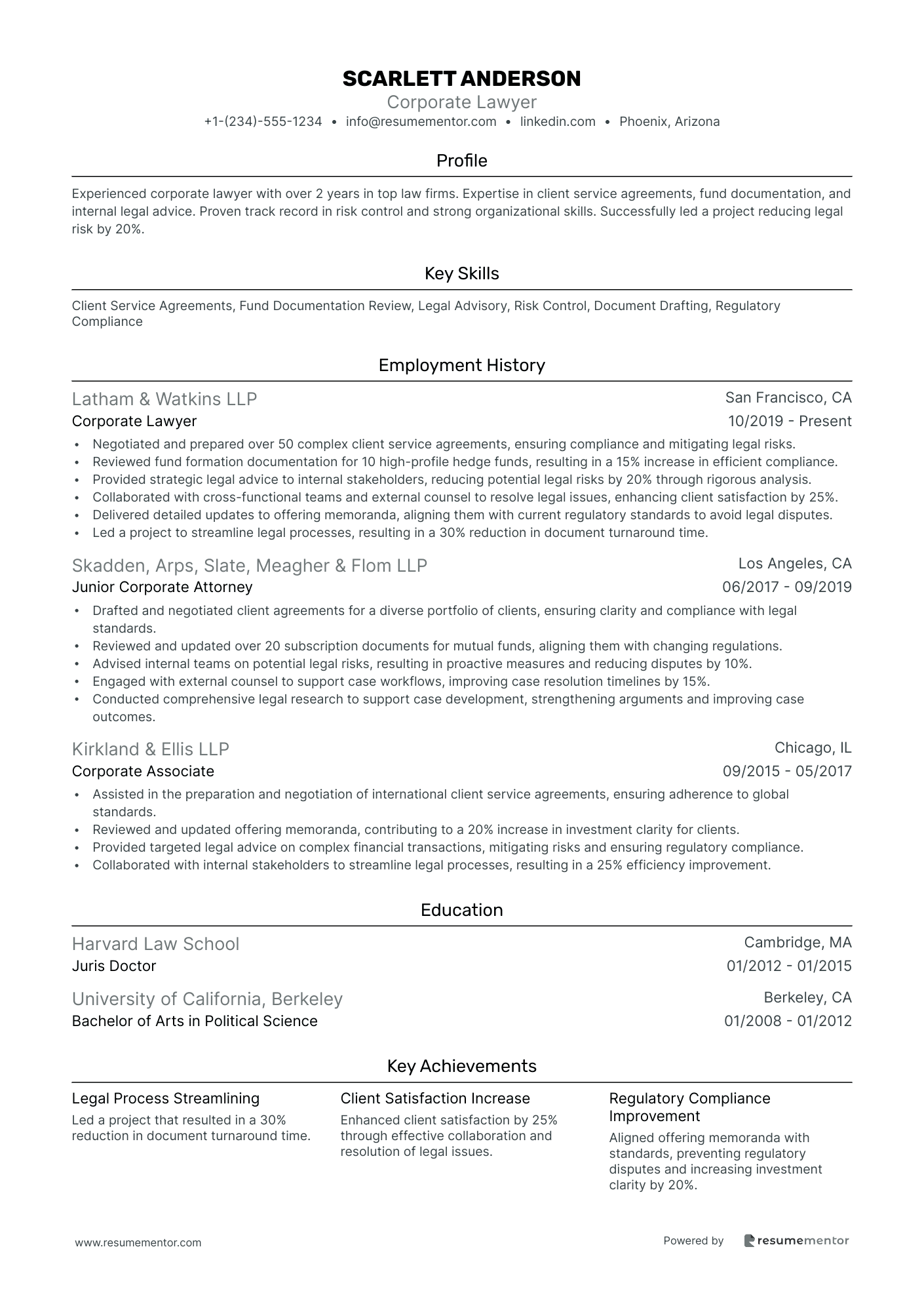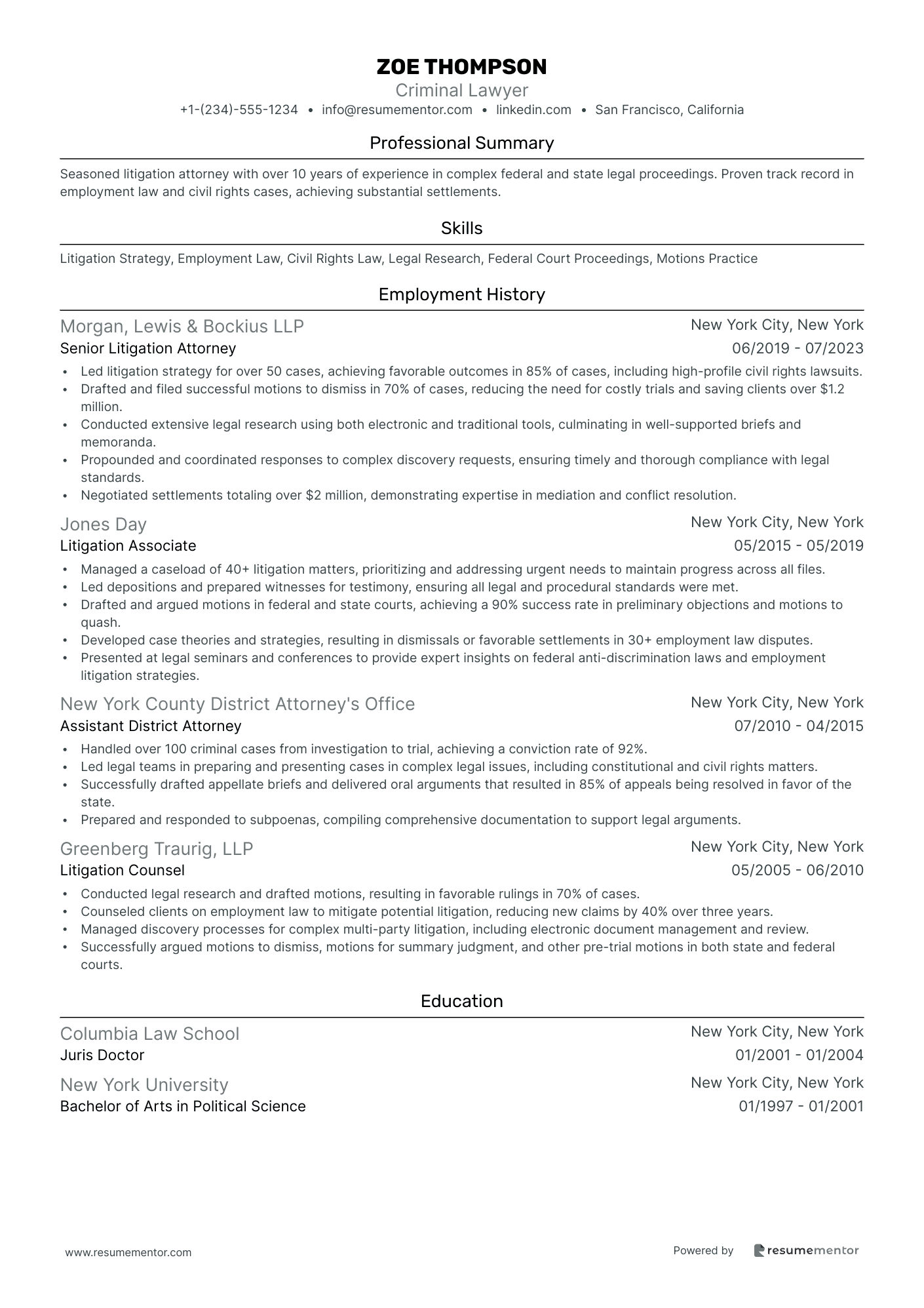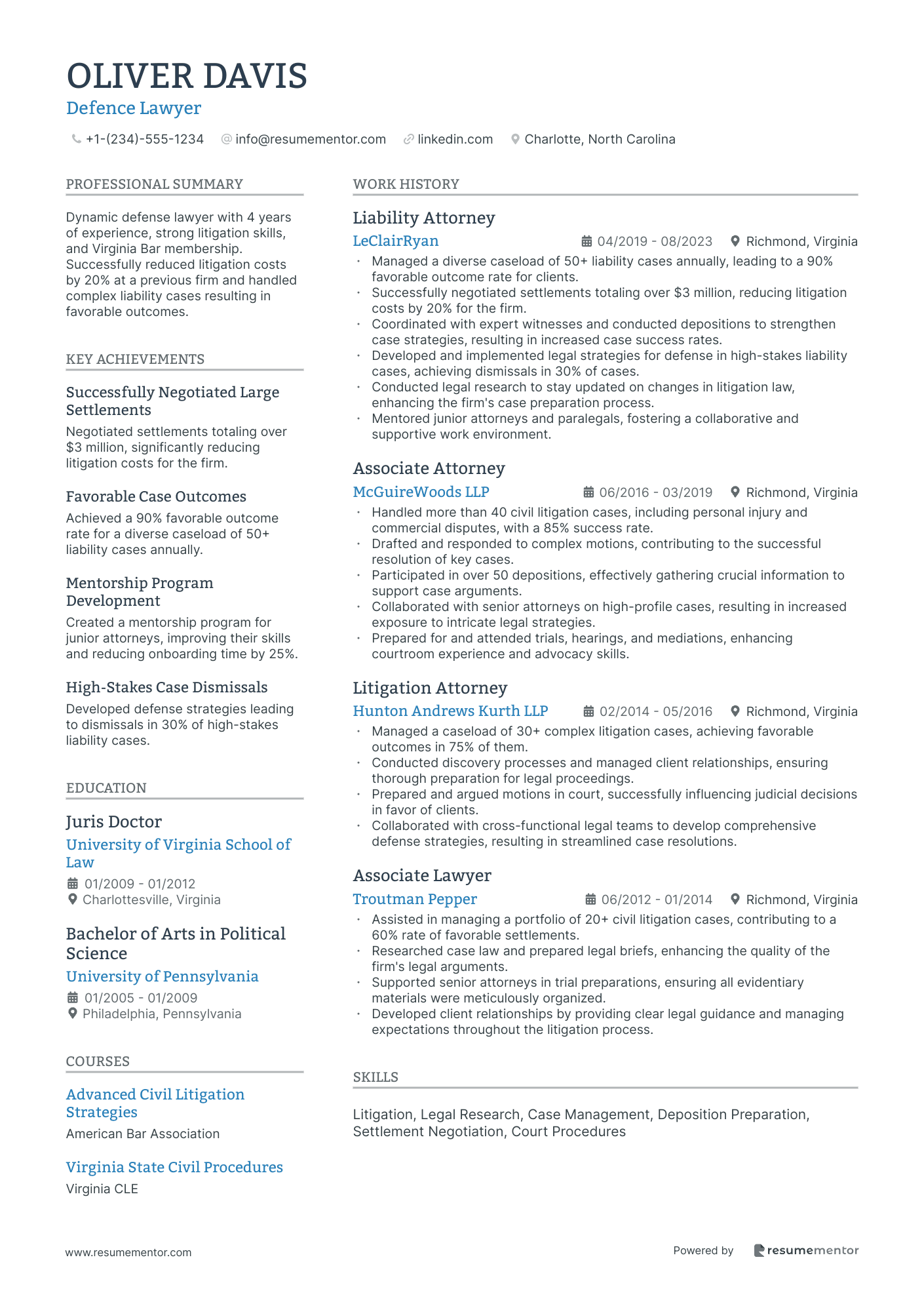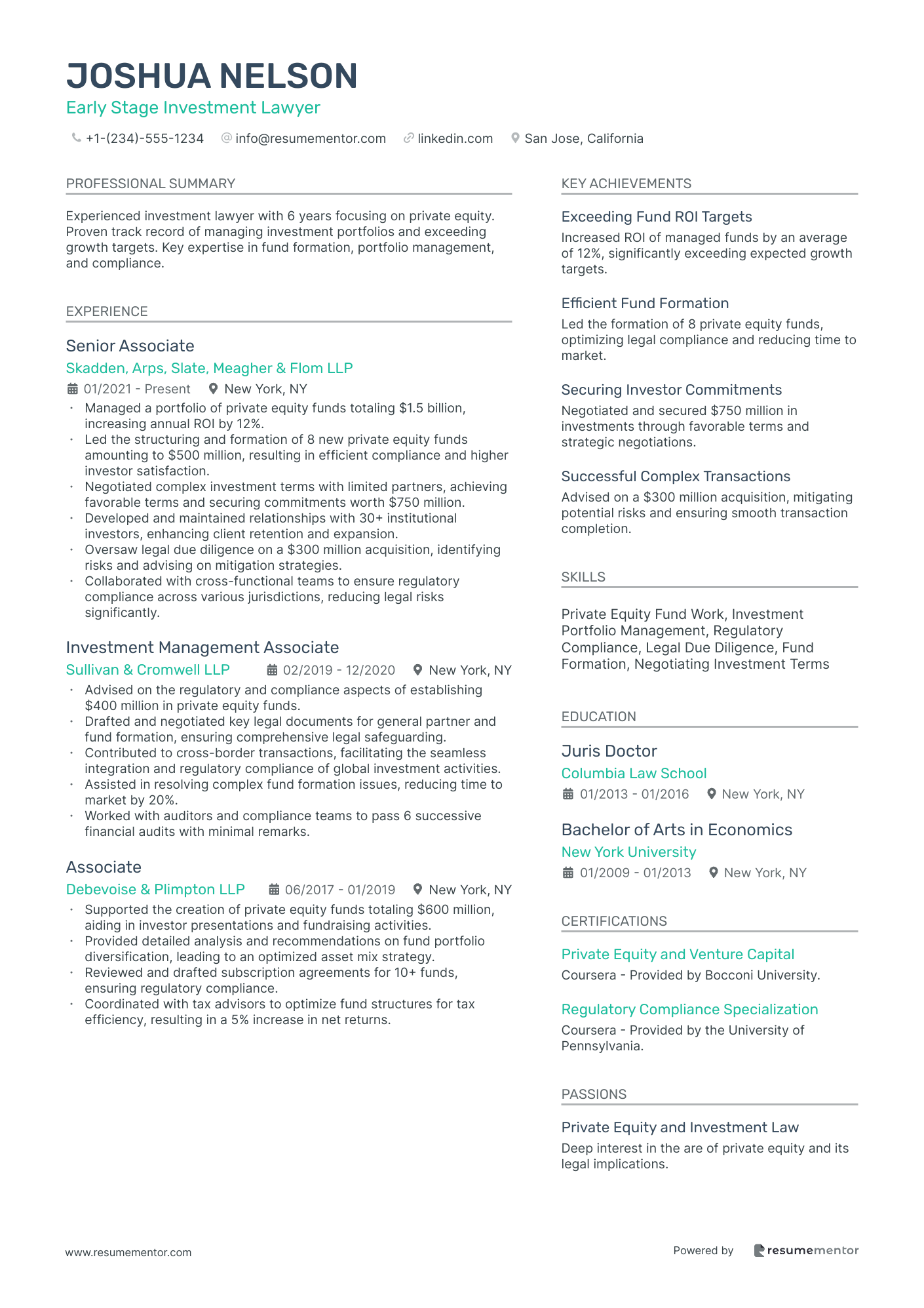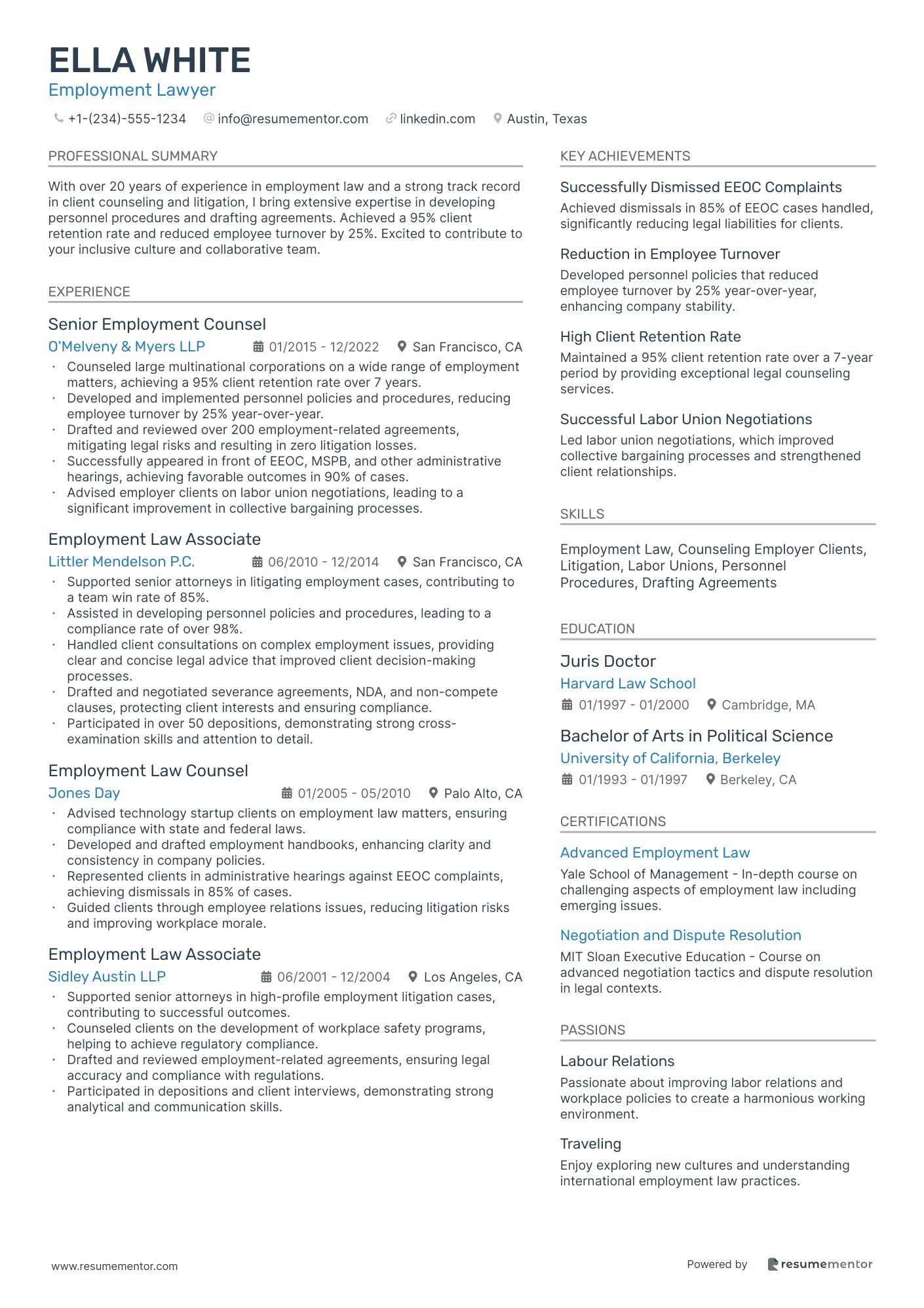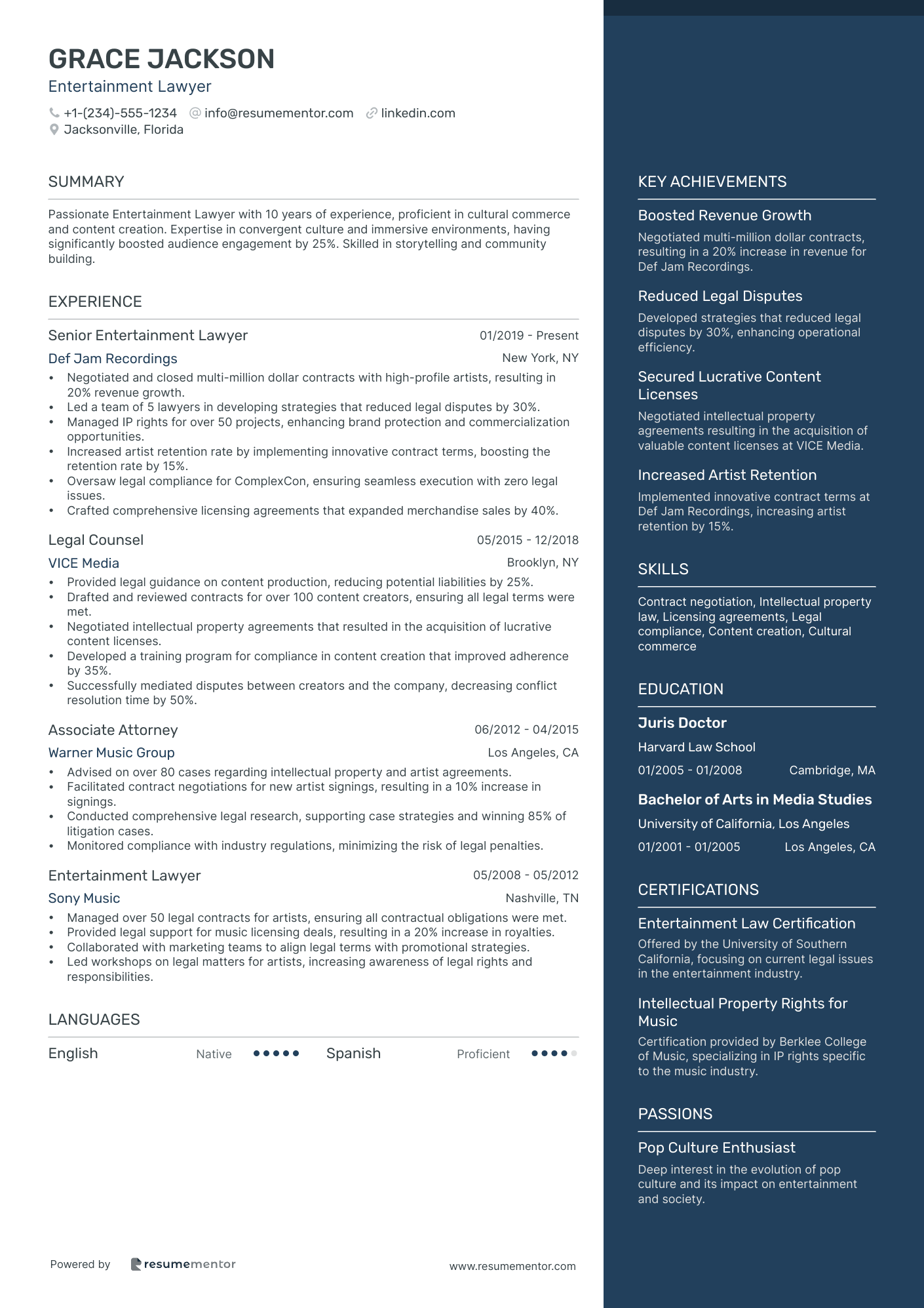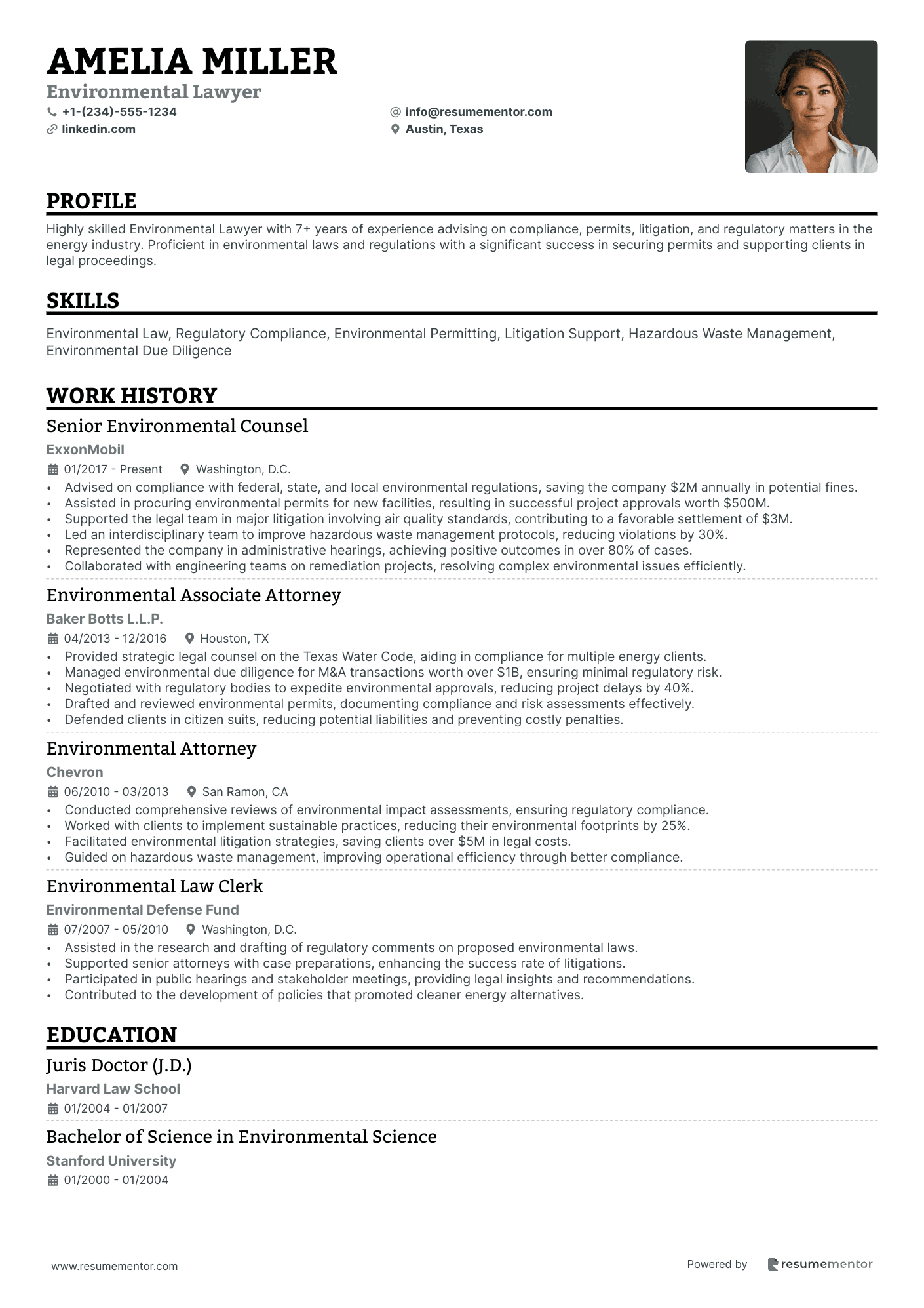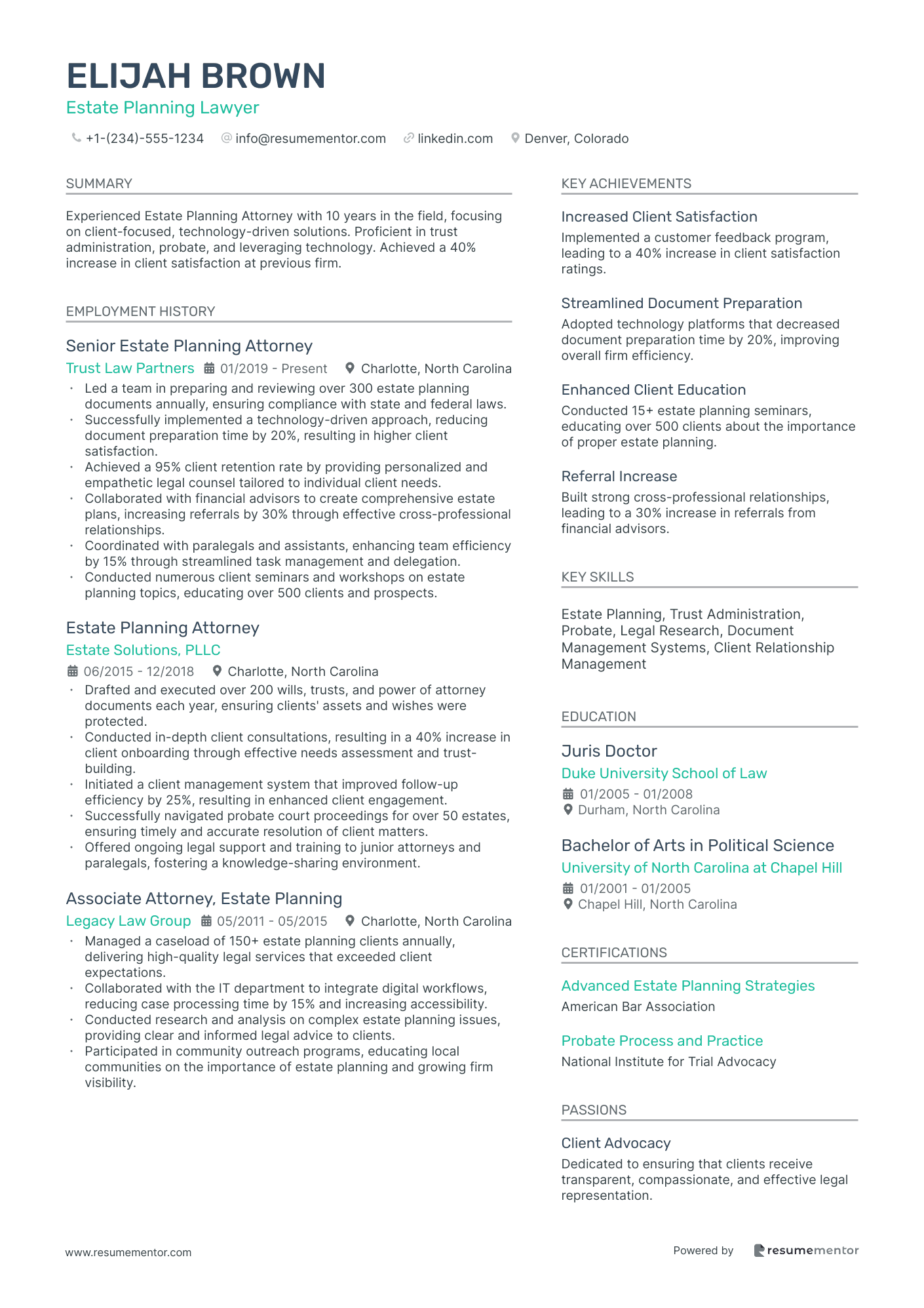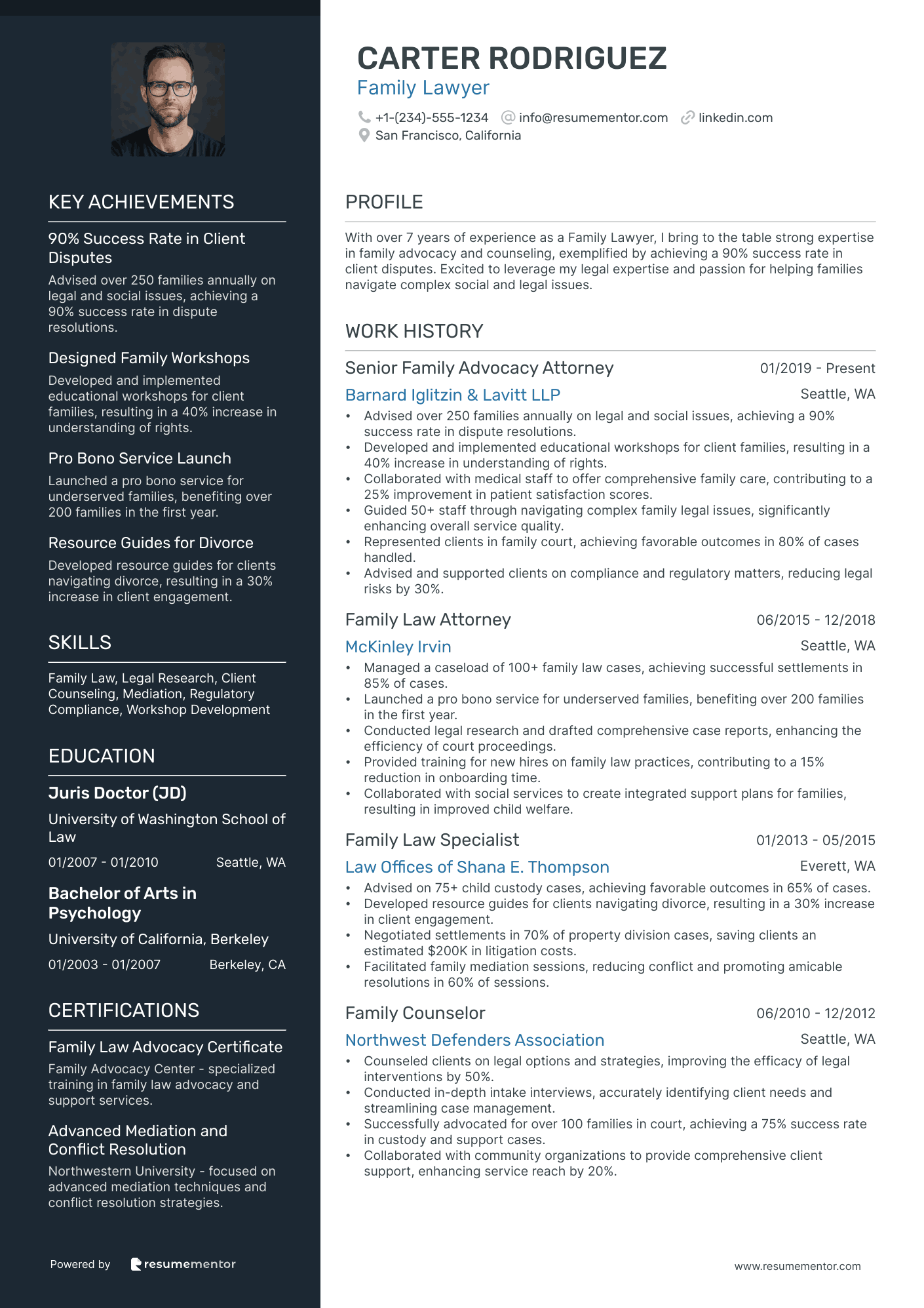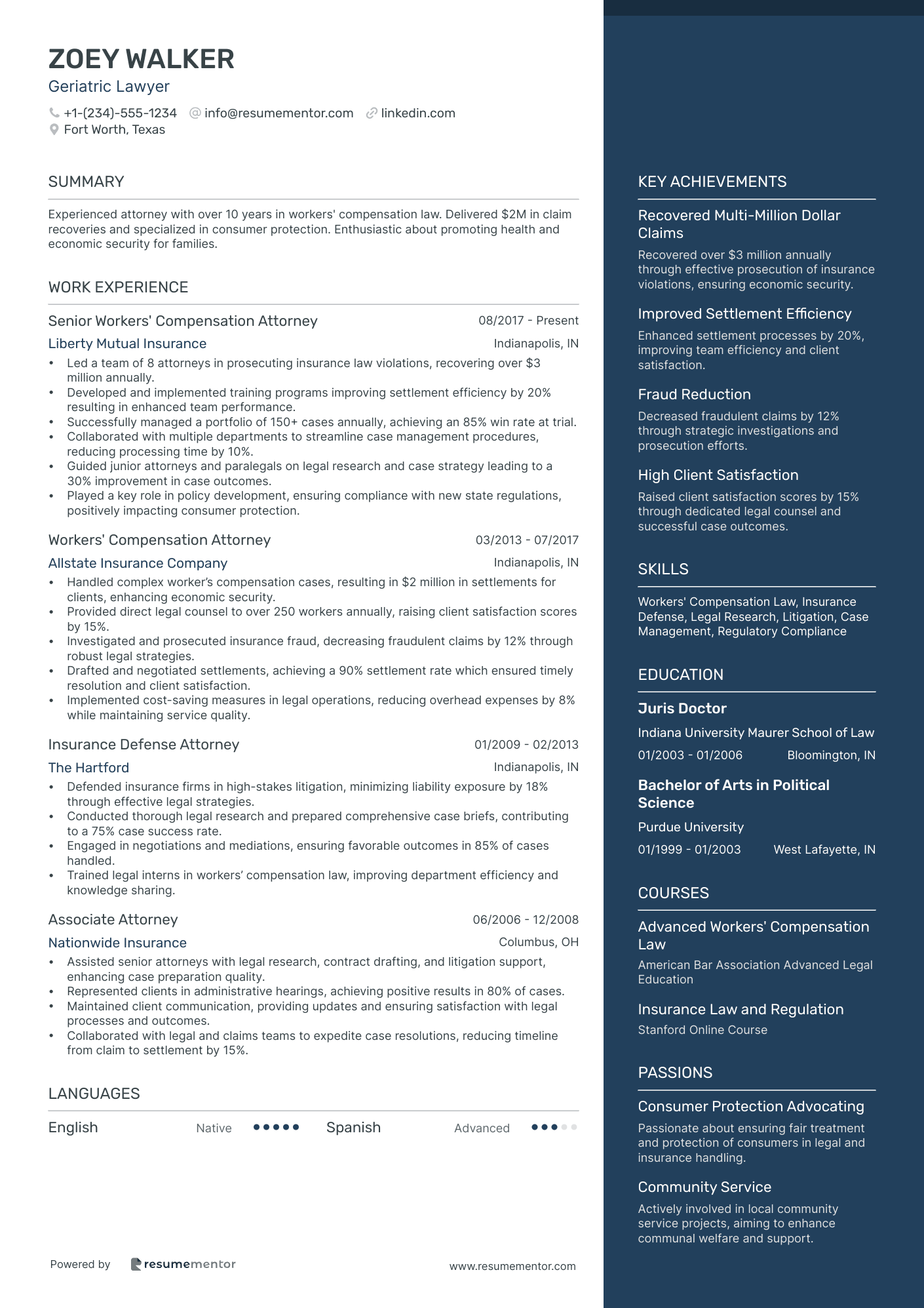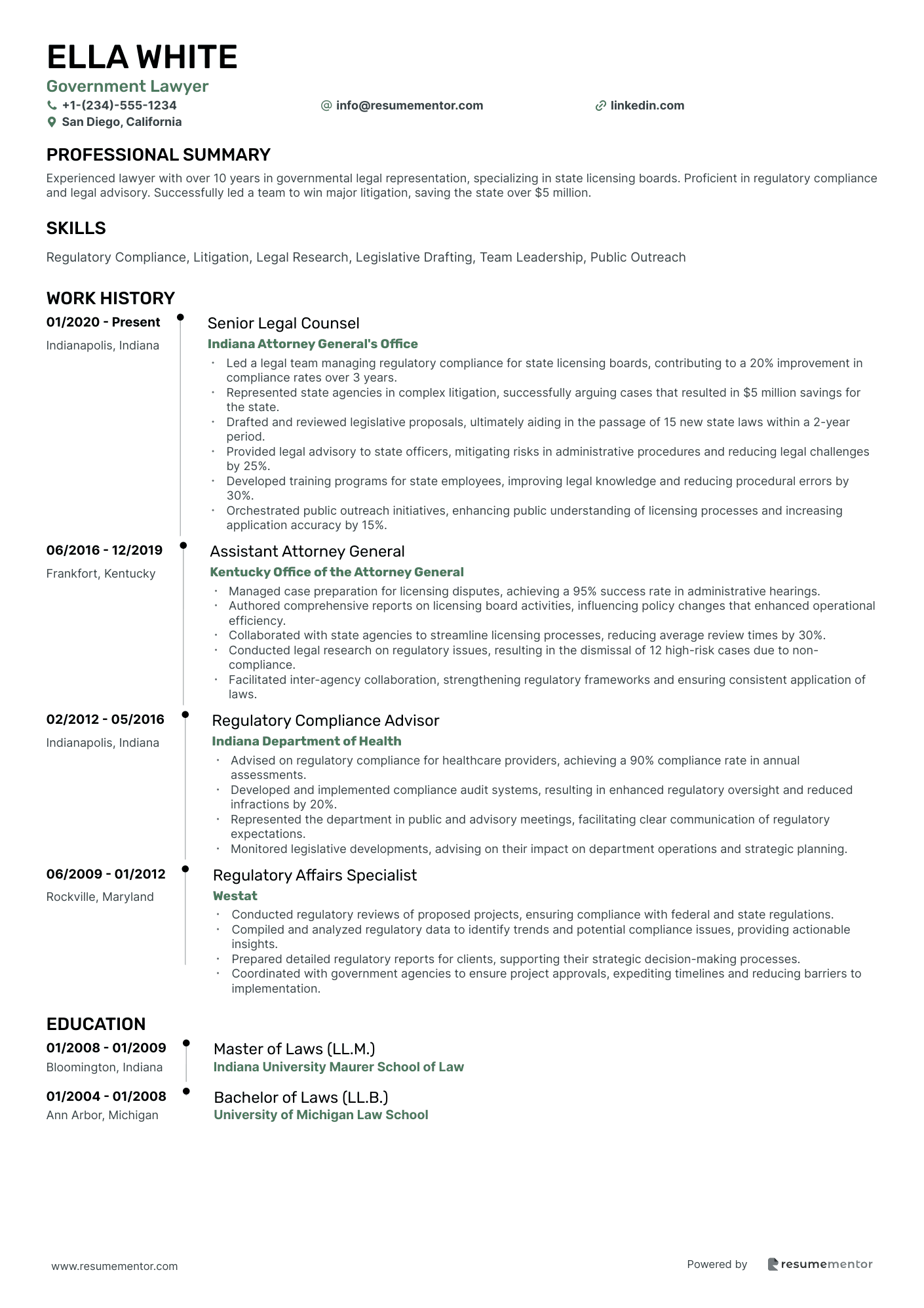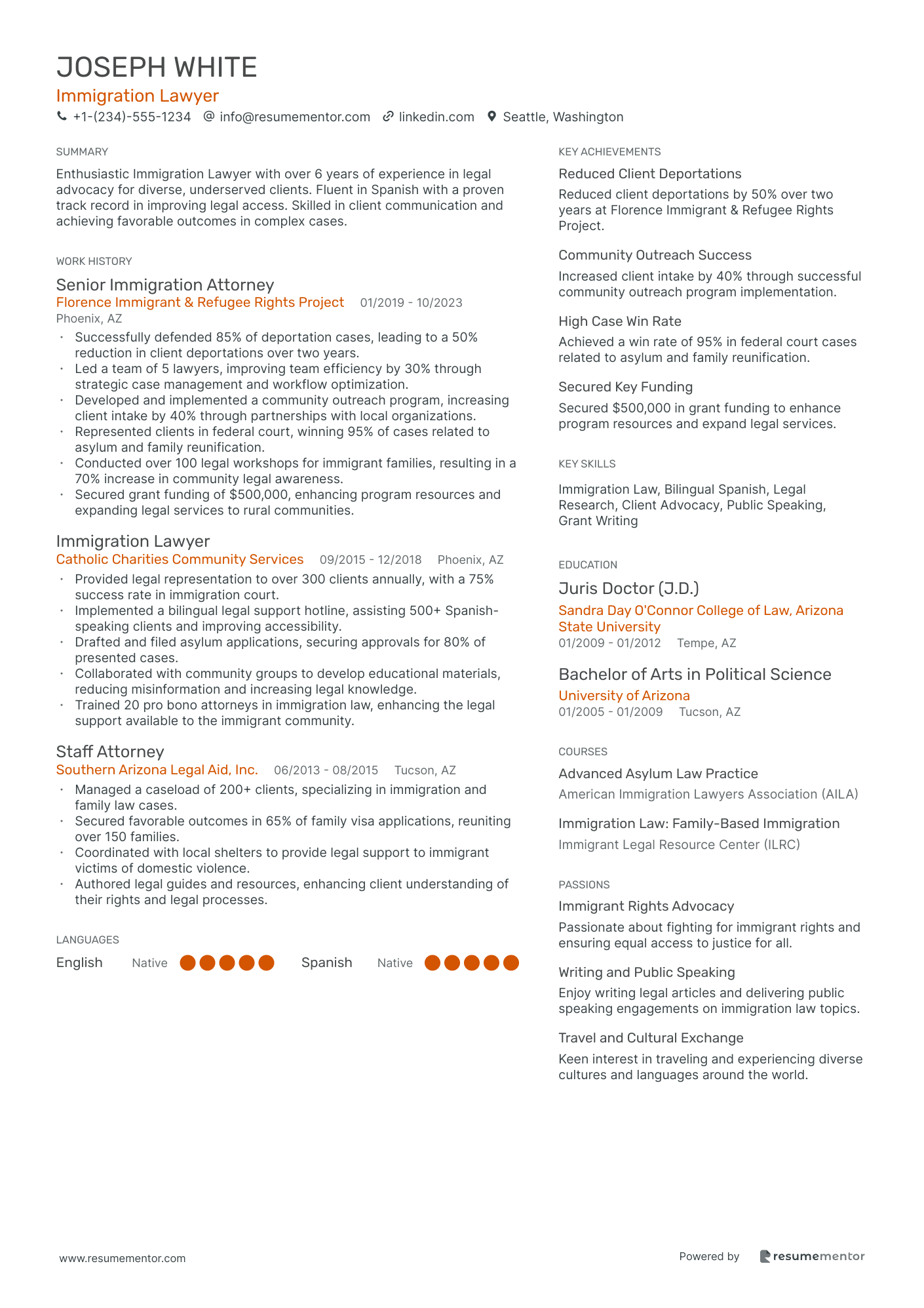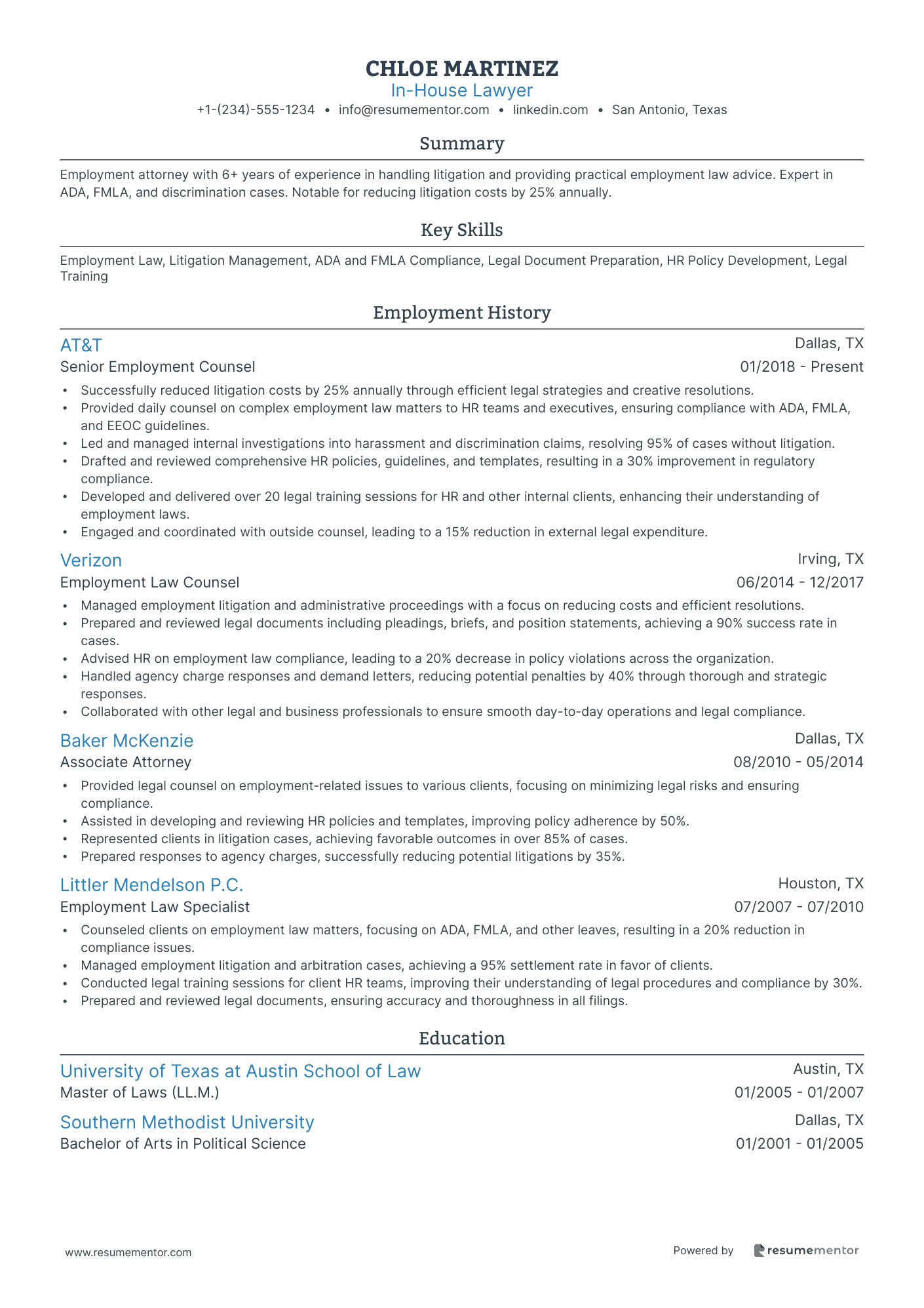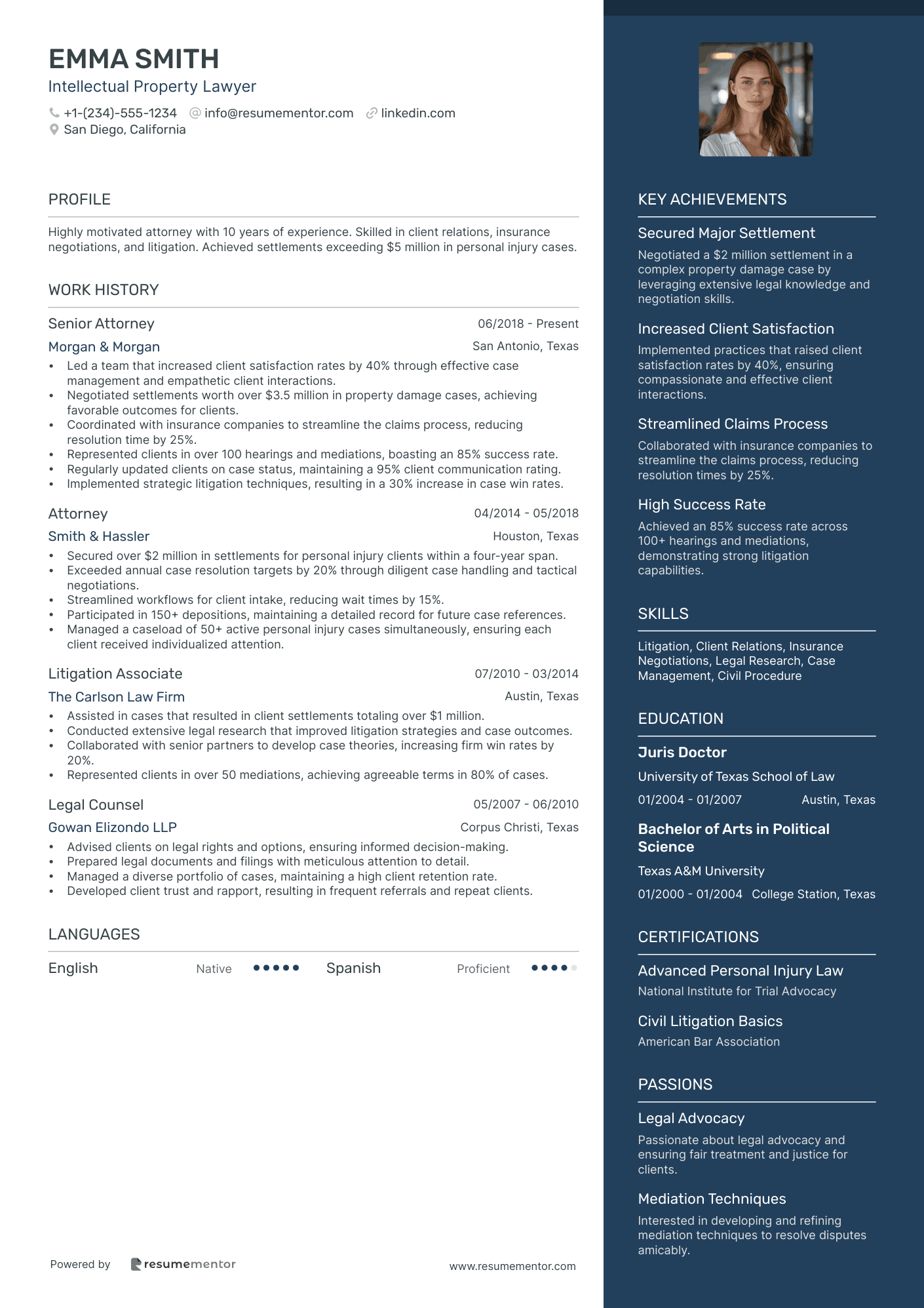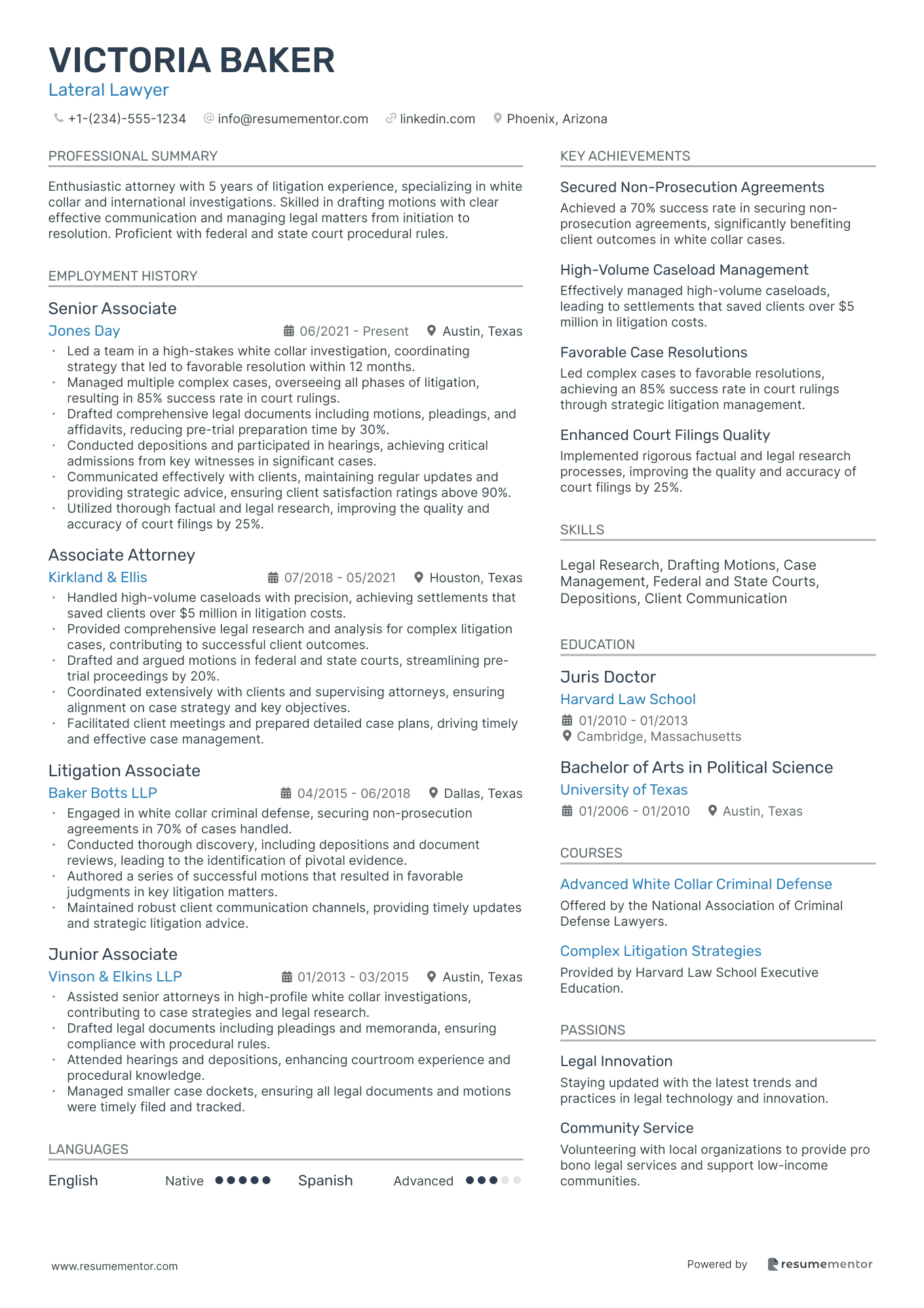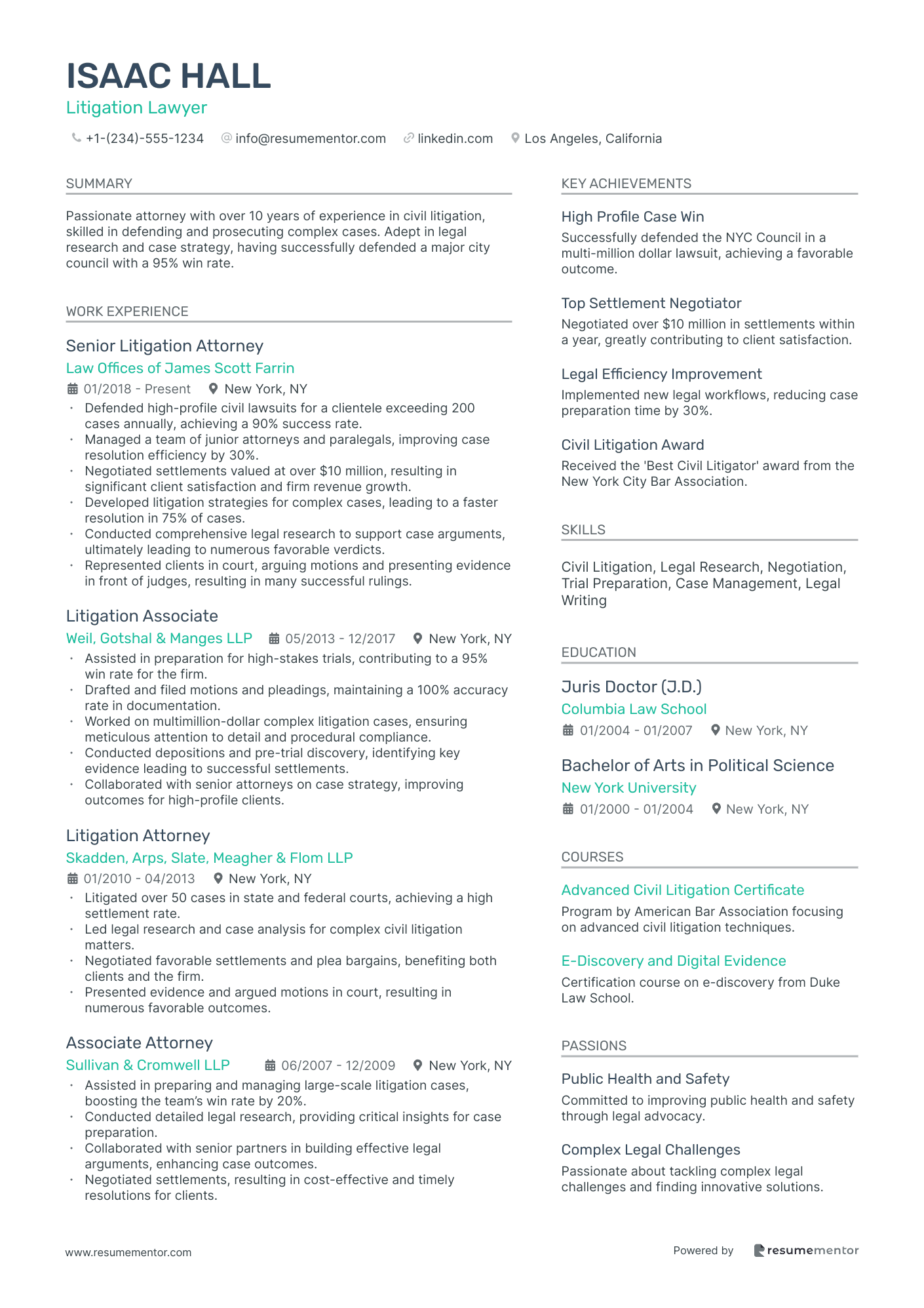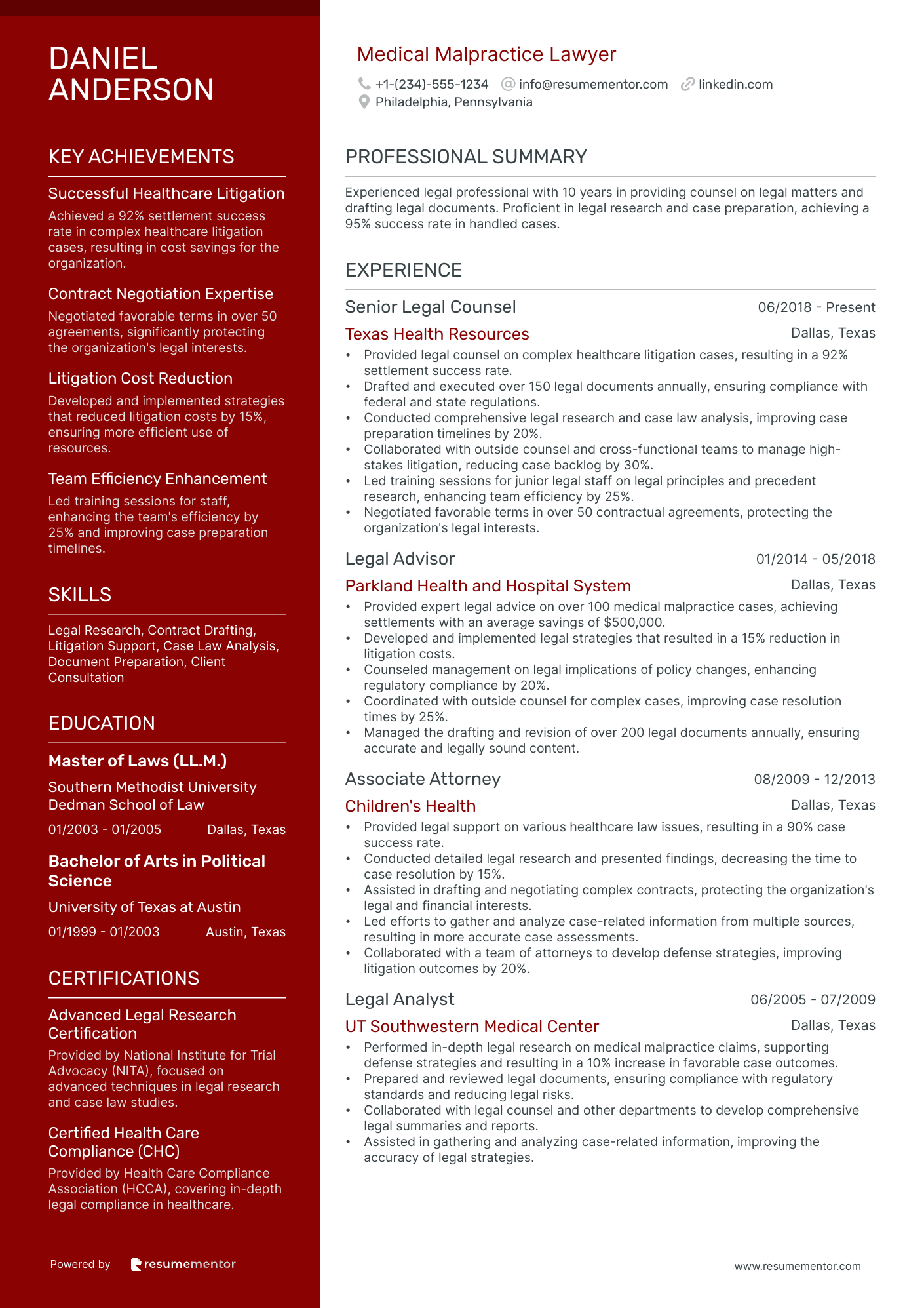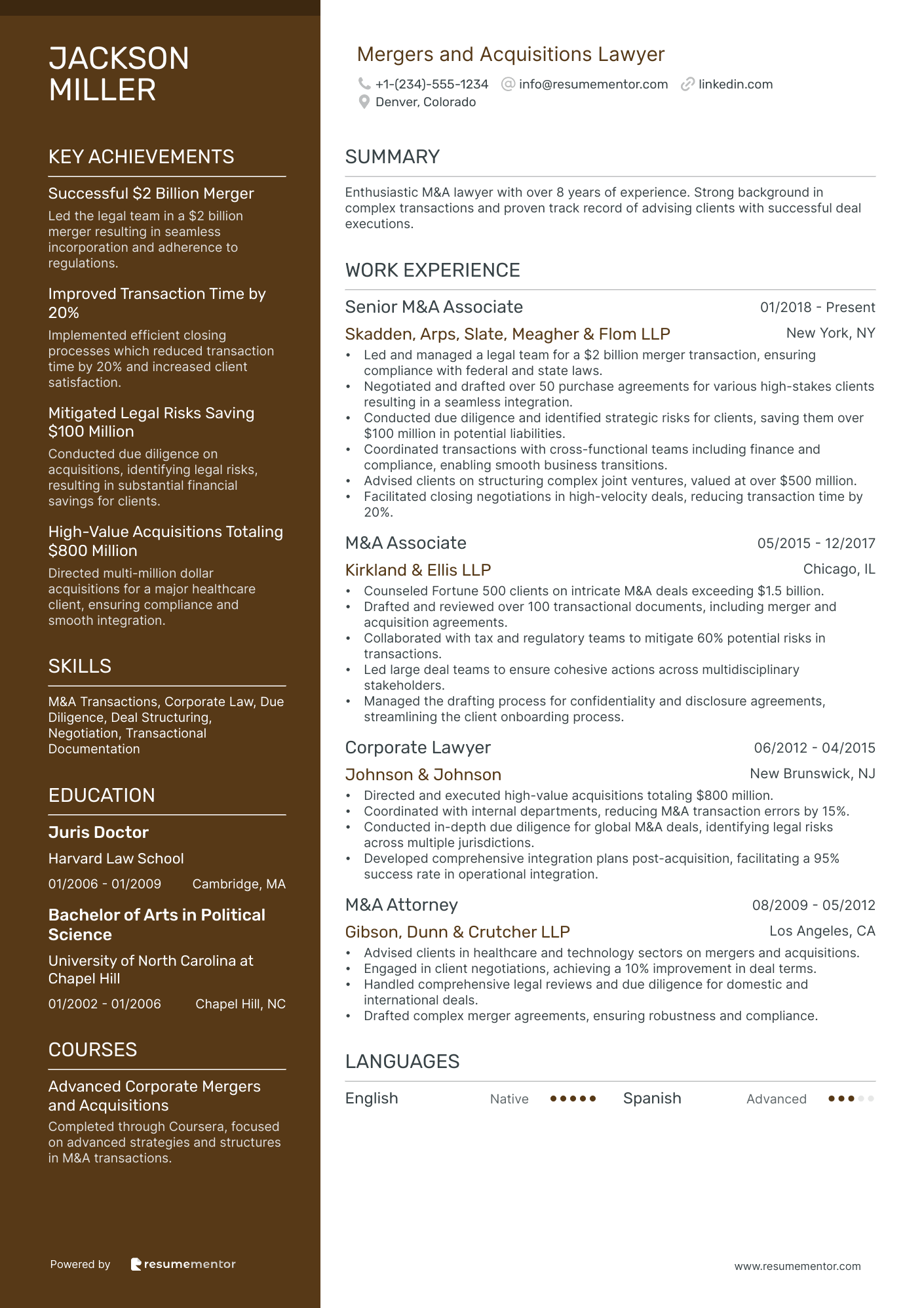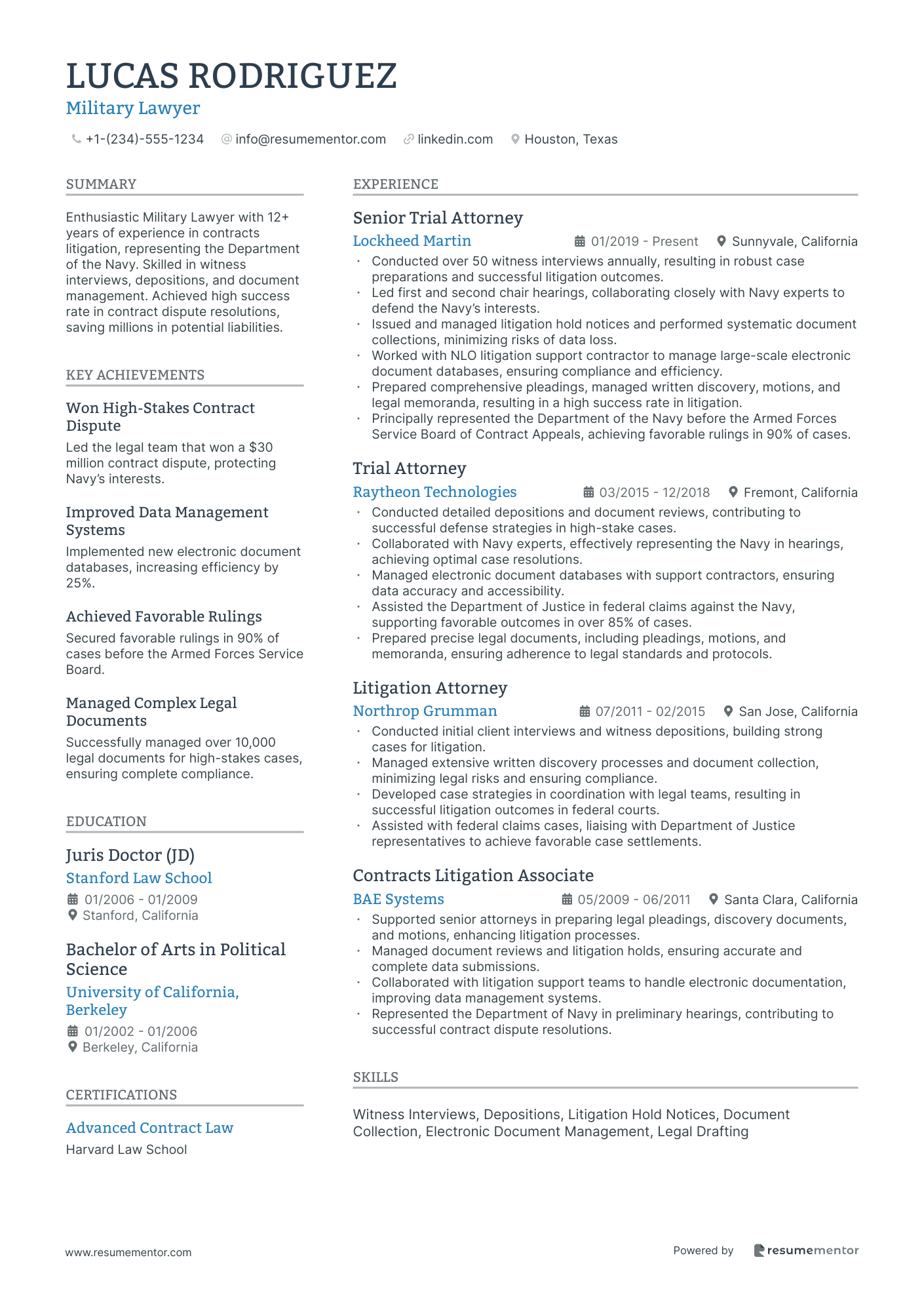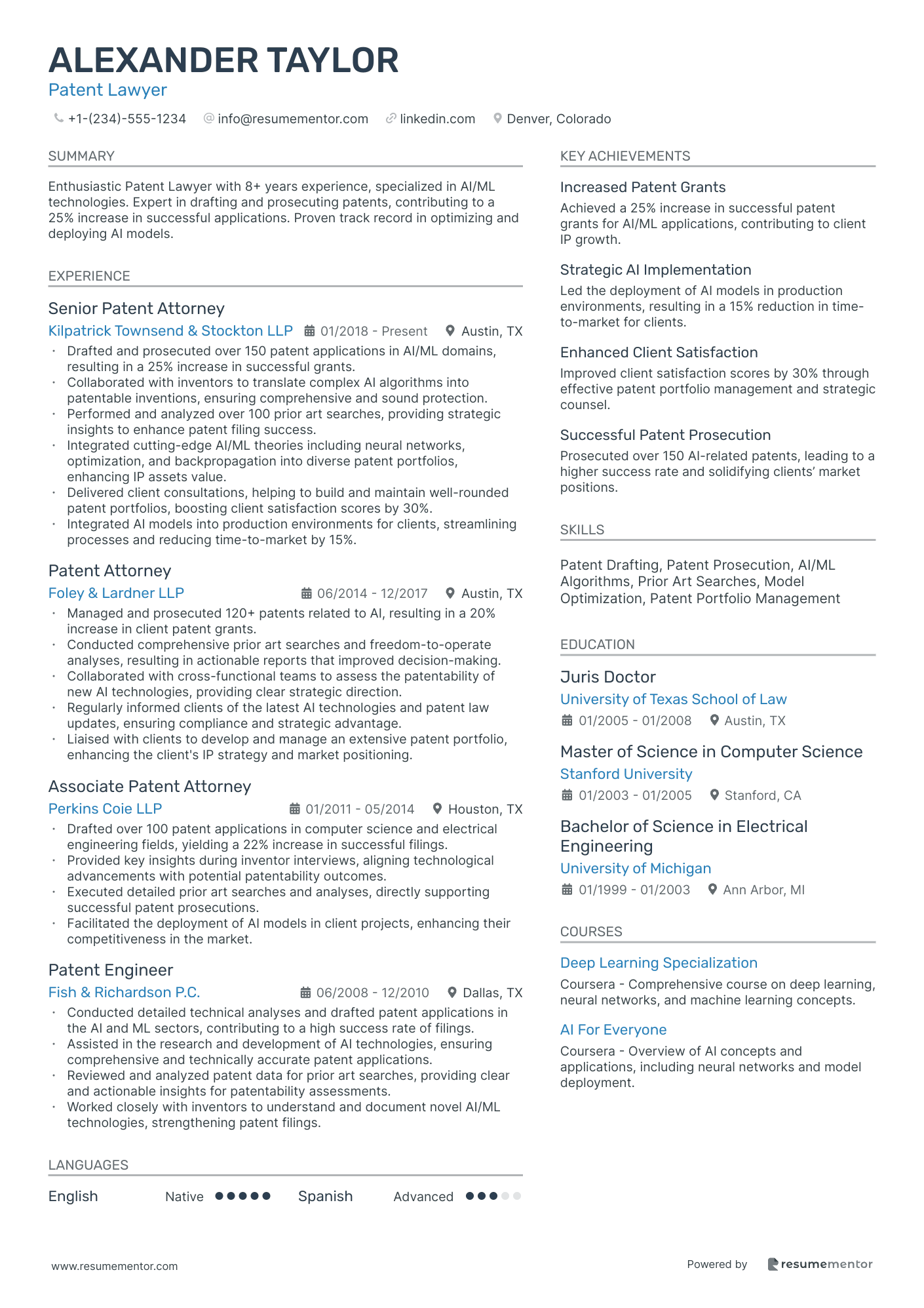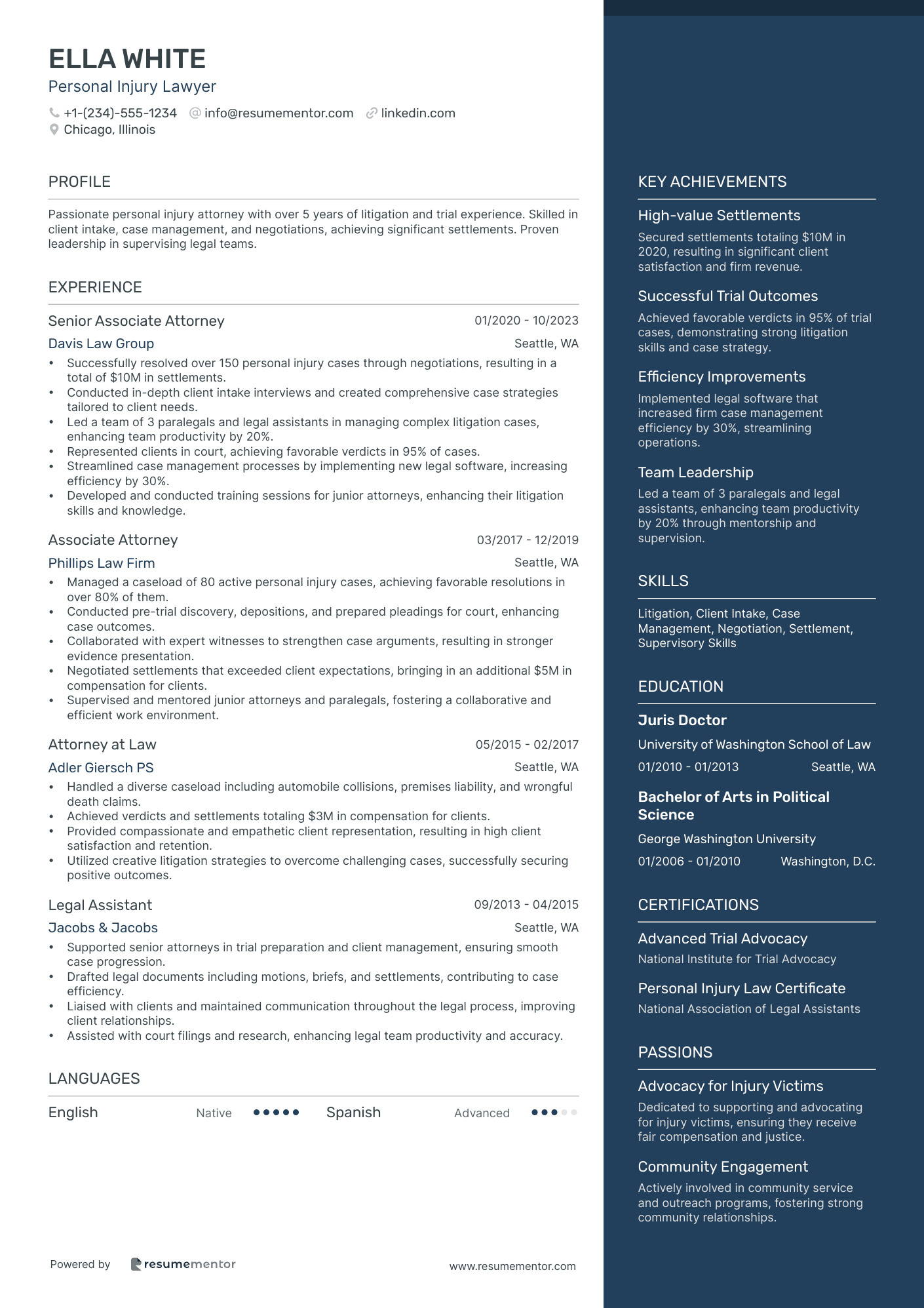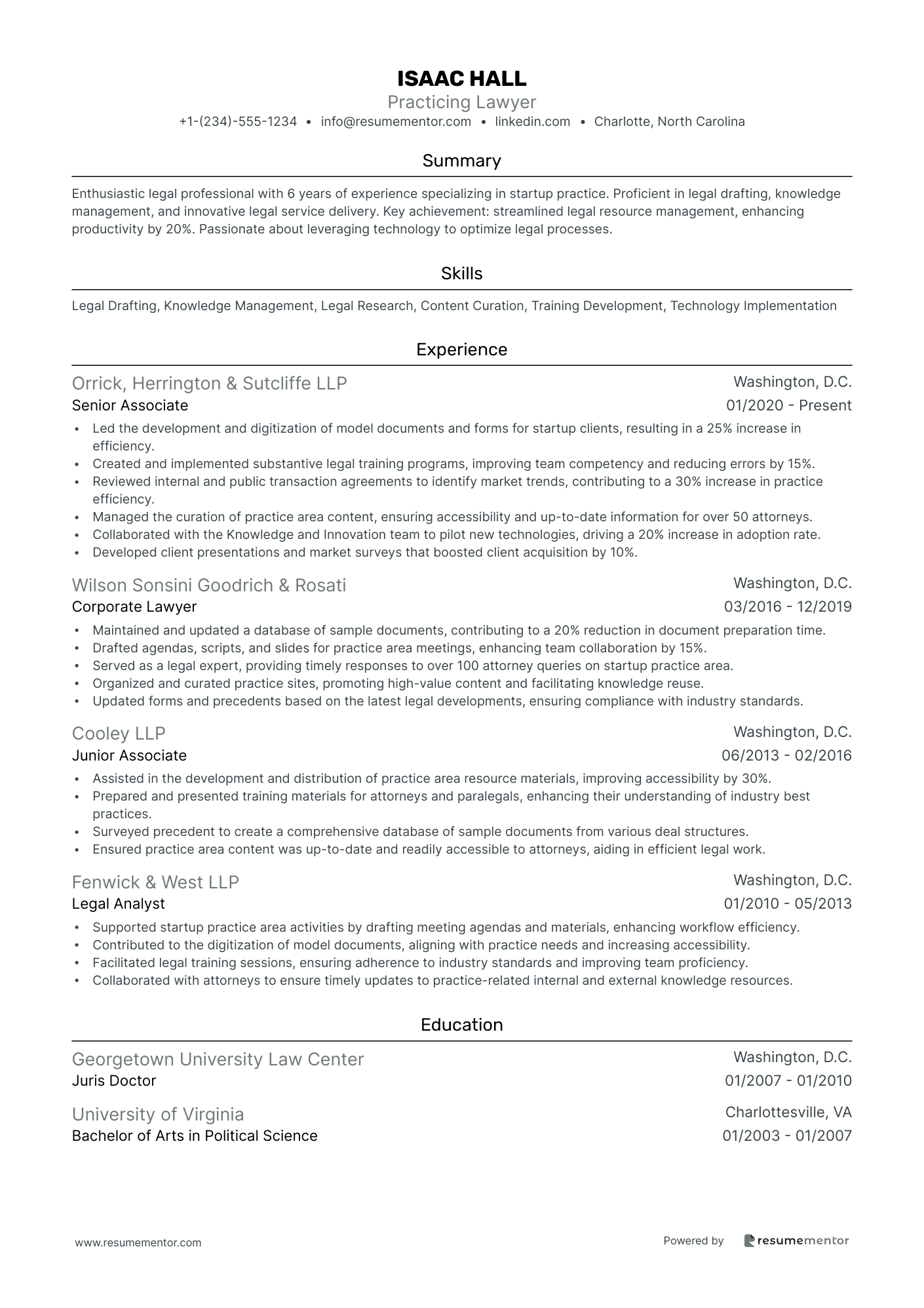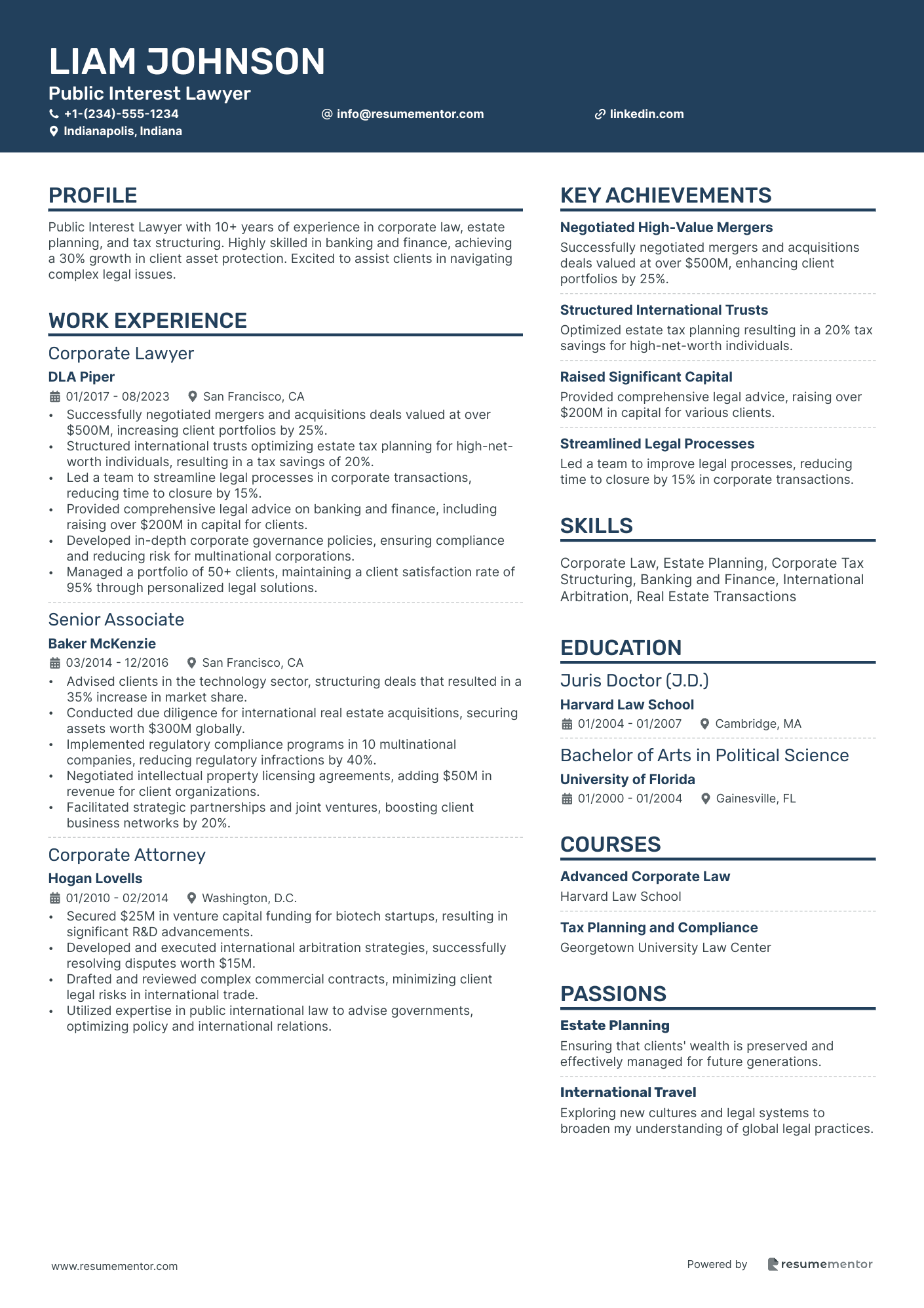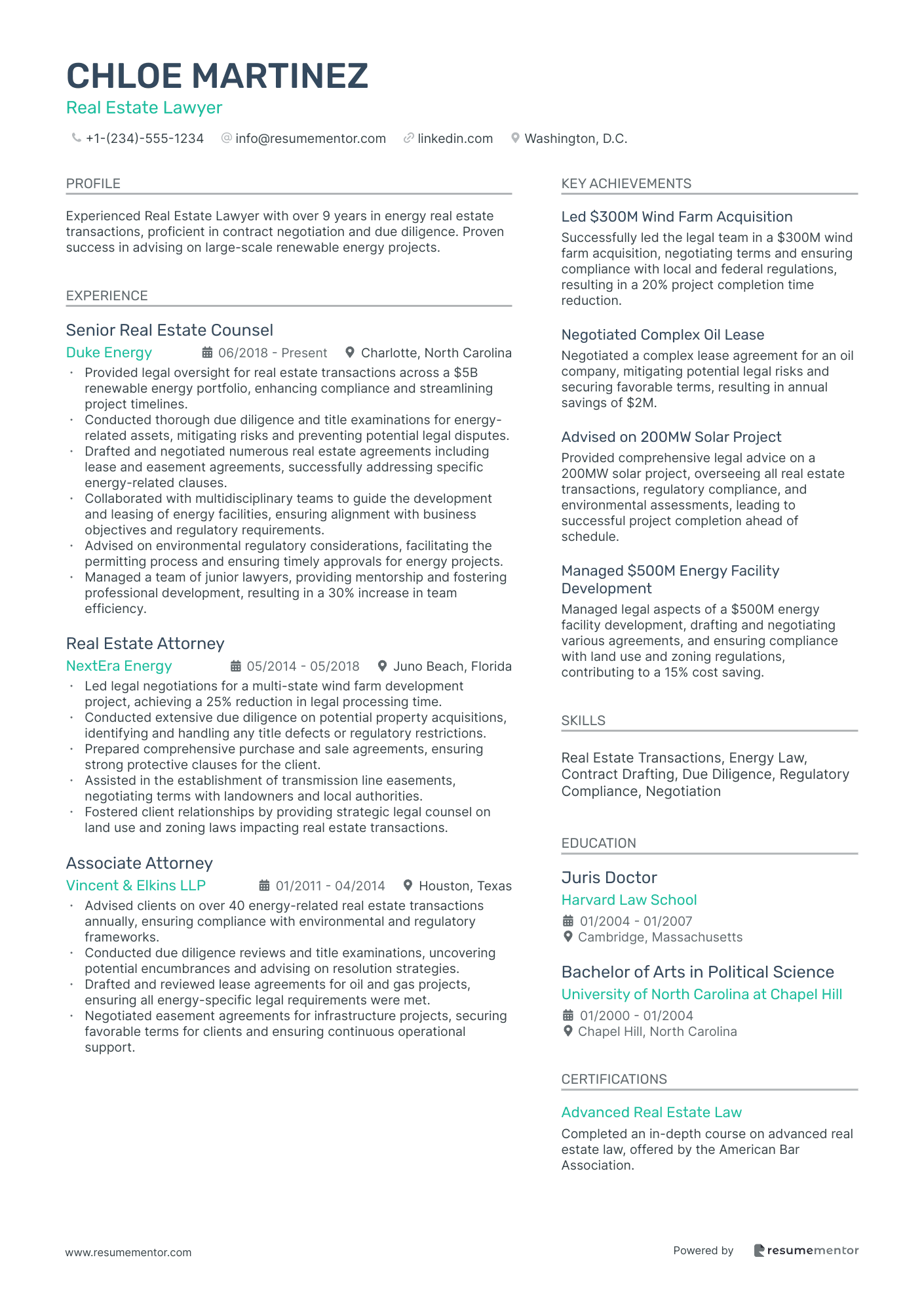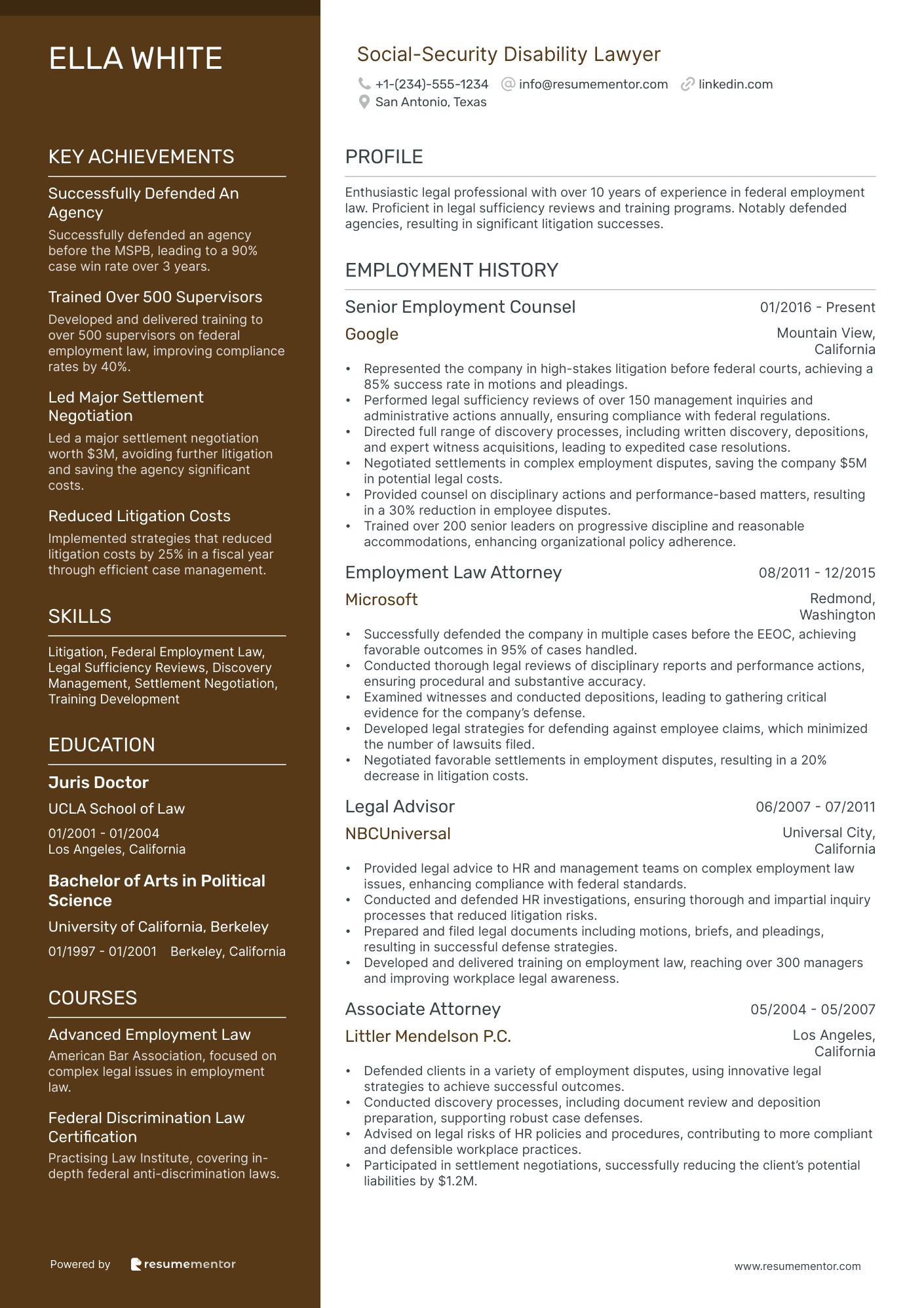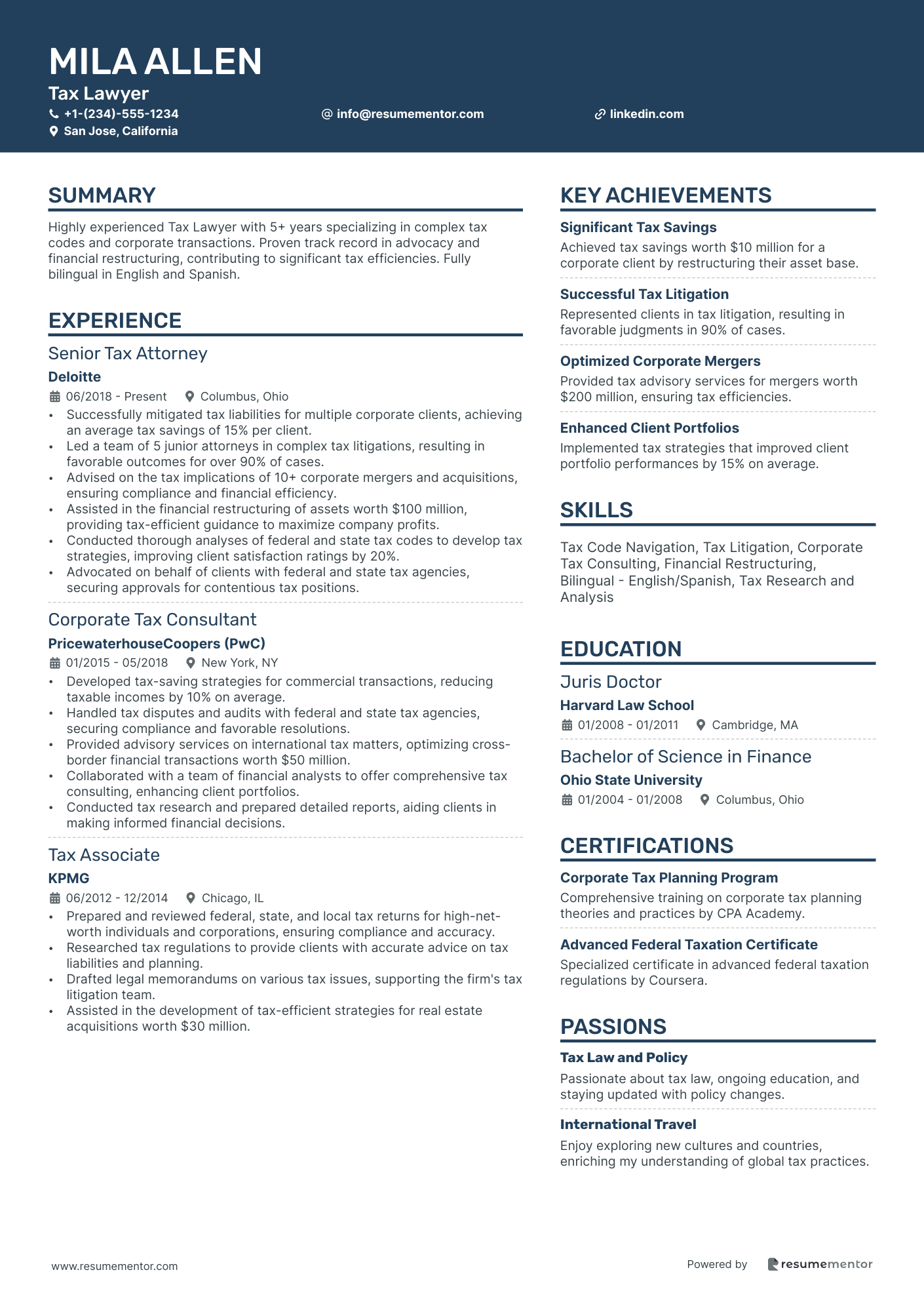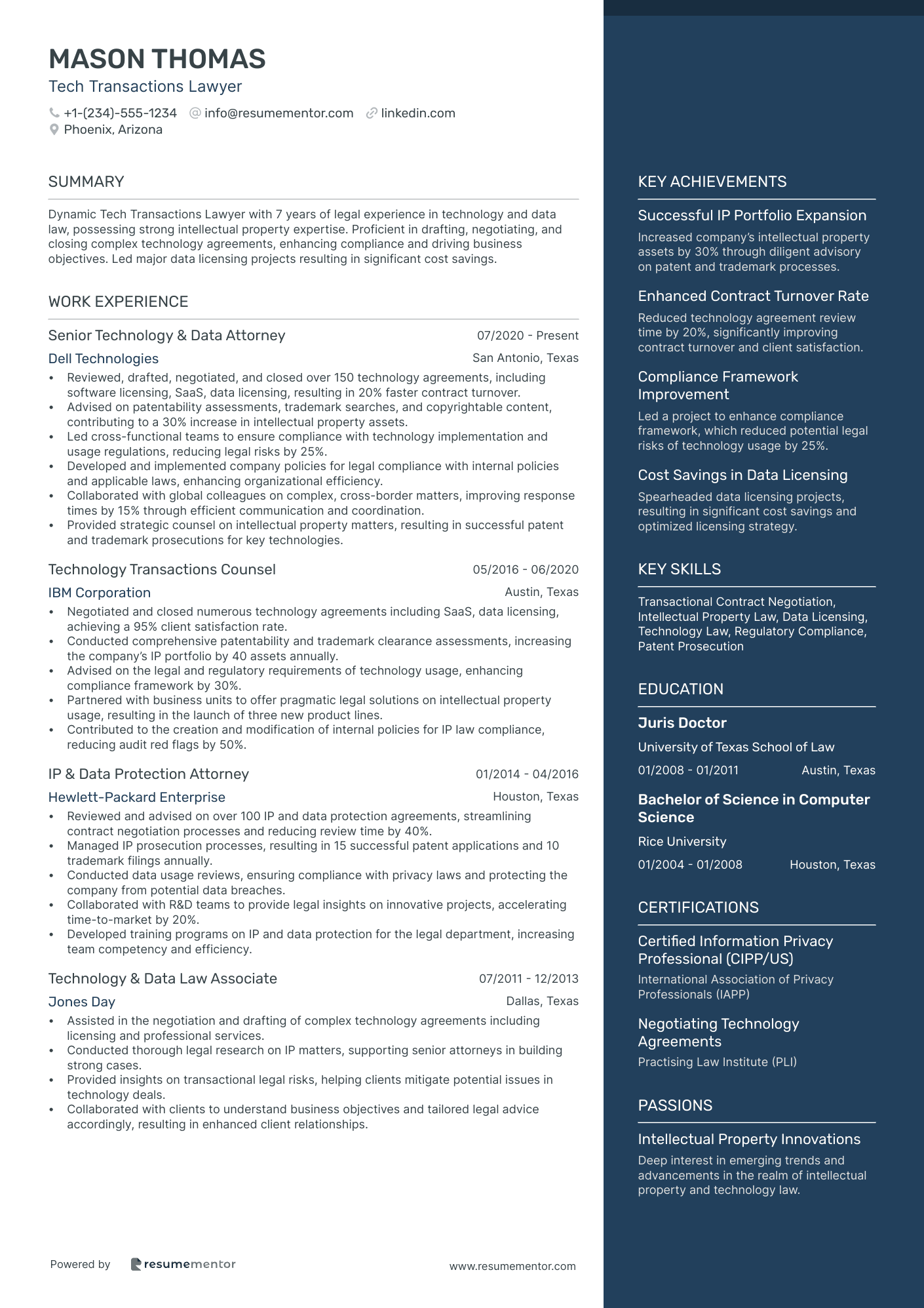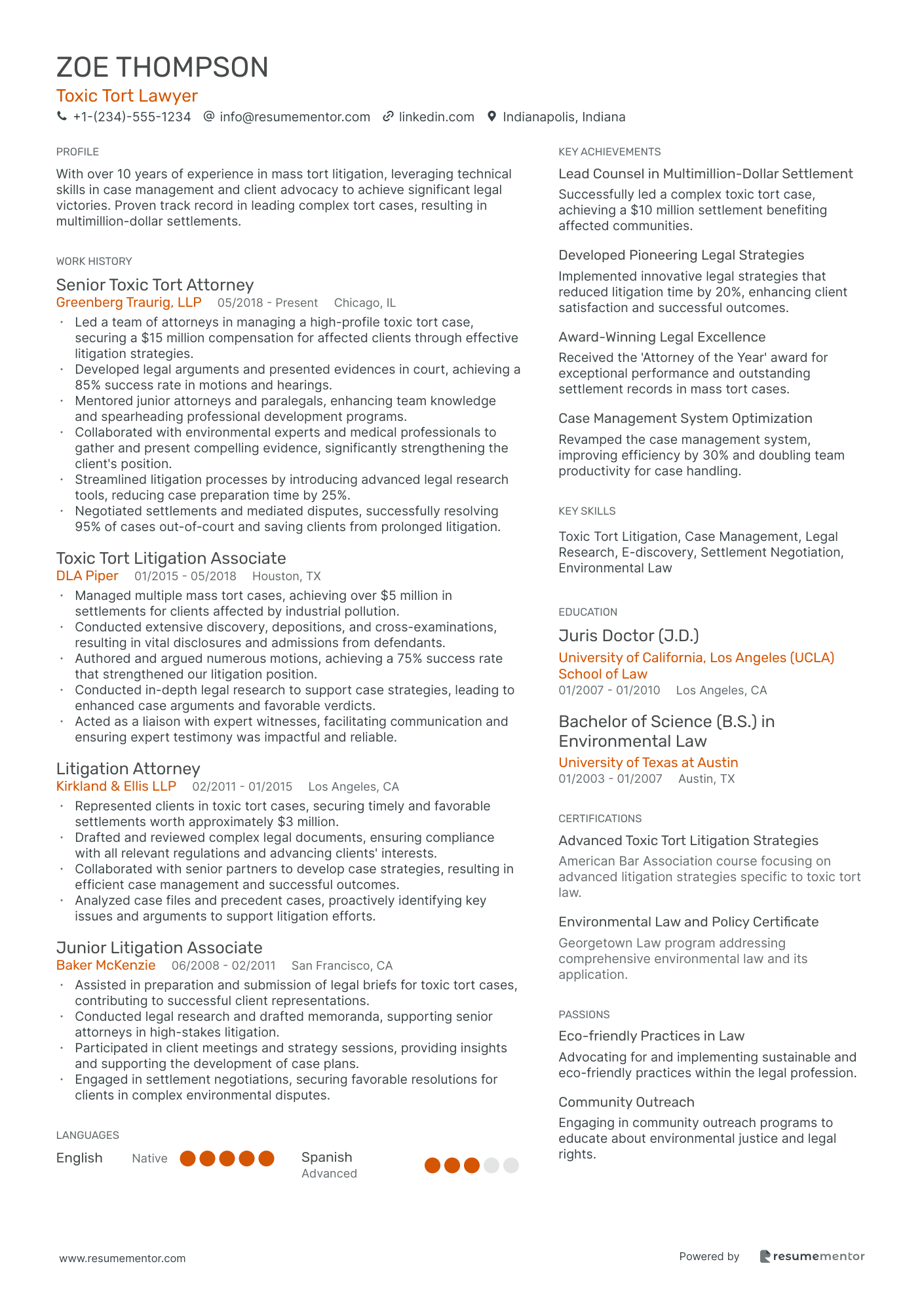41+ Lawyer Resume Examples

Jul 18, 2024
|
12 min read
Craft a compelling lawyer resume: your legal journey on paper
Rated by 348 people

Experienced Lawyer resume sample
- •Assisted in the preparation of litigation documents resulting in the successful settlement of 3 enforcement cases.
- •Conducted research on federal regulations and provided insightful memos, enhancing the compliance department's efficiency by 20%.
- •Drafted affidavits and legal opinions, supporting senior attorneys in a high-profile administrative case.
- •Participated in client meetings, compiling comprehensive notes that improved follow-up actions and client satisfaction.
- •Reviewed and analyzed legislative proposals, contributing to the development of advocacy strategies.
- •Maintained an organized database of legal precedents, facilitating quicker retrieval of crucial information by 30%.
- •Supported attorneys in the preparation and filing of FOIA requests, enhancing compliance with federal regulations.
- •Researched case laws and compiled reports aiding in the defense strategy for employment litigation cases.
- •Assisted in drafting motions and briefs, contributing to a 10% increase in successful court submissions.
- •Organized and managed electronic legal documents, ensuring 100% accuracy and compliance with e-litigation standards.
- •Drafted legal documents and provided consultations to underprivileged clients.
- •Organized legal workshops leading to increased legal literacy in the community.
Junior Lawyer resume sample
- •Assisted in drafting and reviewing data protection policies that improved client compliance by 20%.
- •Coordinated with incident response teams during five major data breaches, enhancing response efficiency by 25%.
- •Contributed to the development of cybersecurity preparedness training programs, resulting in better preparedness for 15 clients.
- •Supported senior associates in regulatory investigations, providing critical data and insights on five cases.
- •Performed detailed analysis on AI-related legal issues, culminating in a comprehensive report for senior partners.
- •Monitored compliance with U.S. cybersecurity laws for six high-profile clients, ensuring up-to-date legal practices.
- •Researched and drafted memos on emerging data privacy laws, aiding compliance for over 10 clients.
- •Assisted in the preparation of responses to regulatory inquiries, influencing positive outcomes in three cases.
- •Collaborated on drafting incident response plans, successfully tested by two major clients.
- •Analyzed the cybersecurity measures of clients against regulatory standards, identifying risks and suggesting improvements.
- •Organized workshops on cybersecurity basics for over 200 participants.
- •Developed educational materials on data privacy laws for local communities.
Senior Lawyer resume sample
- •Reviewed and drafted over 100 engineering, procurement, and construction (EPC) contracts, ensuring regulatory compliance and mitigating potential legal risks.
- •Collaborated with project managers on large-scale renewable energy projects, resulting in a streamlined contract negotiation process and a 15% reduction in turnaround time.
- •Conducted detailed legal research and provided analysis on complex legal issues, aiding in effective decision-making for internal stakeholders.
- •Assisted in due diligence processes for mergers and acquisitions, identifying potential liabilities and contributing to a 10% reduction in contingent liabilities.
- •Facilitated training sessions on contract law for junior staff, enhancing their understanding of legal protocols and reducing workflow errors by 20%.
- •Managed document review for litigation and arbitration cases, leading to efficient document organization and a 25% improvement in case preparation time.
- •Assisted in drafting and negotiating engineering service agreements, contributing to a 30% increase in successful contract closures.
- •Supported compliance audits by collecting and analyzing relevant data, resulting in a fully compliant status across all audited departments.
- •Conducted regulatory research on renewable energy legislation, aiding senior legal advisors in shaping compliance strategies.
- •Developed contract templates for various business units, reducing the time taken for contract preparation by 20%.
- •Provided legal advice on environmental regulations, aiding in policy development.
- •Conducted workshops for local businesses on compliance with environmental laws.
New Lawyer resume sample
- •Supported and guided over 150 families through various legal challenges, ensuring they received necessary legal and social services support.
- •Developed and maintained partnerships with local social services agencies, improving resource availability for clients by 25%.
- •Provided expert consultations to staff on legal procedures and best practices, enhancing overall case management and advocacy efforts.
- •Developed and implemented policies to streamline legal support processes, resulting in faster and more effective family advocacy services.
- •Represented families in legal disputes, mediating successful resolutions in over 70% of cases, resulting in more stable and secure family environments.
- •Created a mentorship program for junior attorneys, fostering a culture of continuous learning and professional development within the team.
- •Managed a caseload of over 200 family law cases annually, providing expert legal advice and representation to clients.
- •Collaborated with multidisciplinary teams to address complex family situations, integrating legal, social, and psychological perspectives.
- •Conducted in-depth legal research and prepared case briefs, improving the success rate of cases by 20%.
- •Trained and supervised junior attorneys and paralegals, ensuring adherence to legal standards and best practices.
- •Led community outreach initiatives, educating over 500 individuals annually on family law issues and available legal resources.
- •Handled a diverse range of family law cases, including divorce, custody, and adoption, providing legal support and representation to clients.
- •Successfully mediated 75% of family disputes, helping parties reach amicable solutions without the need for litigation.
- •Developed detailed case strategies and prepared comprehensive legal documents, ensuring thorough representation of client interests.
- •Participated in collaborative law practices, working with opposing counsel to find constructive solutions to family conflicts.
- •Conducted client consultations and case evaluations, providing clear and actionable legal advice to over 150 clients per year.
- •Assisted attorneys with legal research and case preparation, contributing to the successful resolution of over 50 family law cases annually.
- •Coordinated client intake and maintained detailed case files, ensuring accurate and up-to-date information for legal proceedings.
- •Provided administrative support for court filings and legal documentation, enhancing the efficiency of the legal team.
- •Conducted client interviews and gathered essential information, aiding in the development of comprehensive case strategies.
Associate Lawyer resume sample
- •Successfully defended over 200 low-income tenants facing eviction, achieving a 90% success rate in cases, resulting in stable housing for clients.
- •Led a team of 5 attorneys in mass action litigation, securing collective settlements of over $2 million for tenants' rights violations.
- •Trained junior attorneys and paralegals on effective litigation strategies and client communication, enhancing team efficiency by 30%.
- •Drafted and filed various legal documents including motions, pleadings, and appeals, contributing to significant case wins.
- •Coordinated community outreach programs, educating over 1,000 tenants annually about their rights and legal resources available.
- •Negotiated settlements amounting to $500,000 in favor of tenants, ensuring their rights were upheld and preventing homelessness.
- •Handled high-volume eviction defense cases with a 85% success rate, preventing displacement for numerous families.
- •Conducted legal research and prepared briefs for landmark cases, contributing to changes in state eviction laws.
- •Collaborated with local organizations to implement new tenant protection policies, benefiting over 10,000 residents.
- •Represented clients in court for eviction trials, consistently achieving favorable outcomes and tenant retention.
- •Developed and executed client intake procedures, saving 15% of processing time and increasing case turnover rate.
- •Provided direct legal representation to 150+ clients annually, securing favorable judgments in 75% of cases.
- •Led community workshops, educating 800+ tenants on legal rights and eviction defense, resulting in increased community awareness.
- •Collaborated with pro bono attorneys and law students, enhancing overall case management and client support projects.
- •Secured $200,000 in grant funding for housing rights initiatives, expanding legal aid resources and outreach programs.
- •Represented clients in 100+ eviction proceedings, achieving a 70% success rate in tenant-side outcomes.
- •Drafted legislative proposals and policy recommendations, contributing to statewide housing reforms adopted by the legislature.
- •Conducted training sessions for local tenant advocacy groups, empowering over 500 tenants to understand and exercise their rights.
- •Negotiated settlements in complex landlord-tenant disputes, securing over $150,000 in tenant compensations.
Bankruptcy Lawyer resume sample
- •Successfully prepared and filed over 200 bankruptcy claims annually, resulting in a 95% approval rate.
- •Responded to claim objections with a 90% success rate, minimizing client exposure and liability.
- •Collaborated with outside counsel to handle complex contract and sales motions, ensuring compliance and legal soundness.
- •Led efforts in plan confirmation and avoidance actions, securing agreements that benefited client interests.
- •Streamlined case management processes, reducing turnaround time by 30% through effective use of technology.
- •Provided clear and effective communication to clients, increasing client satisfaction ratings by 20%.
- •Handled litigation for bankruptcy cases involving creditors' rights, achieving a 85% success rate in court.
- •Prepared and submitted detailed legal documents and briefs, enhancing the quality and persuasiveness of our filings.
- •Managed outside counsel, ensuring alignment with company strategies and objectives in all bankruptcy related actions.
- •Advised on plan confirmation processes, resulting in the successful reorganization of multiple debtor companies.
- •Conducted legal research to support case strategies, enhancing the firm's overall legal acumen.
- •Represented clients in bankruptcy proceedings, achieving favorable results in resolution of disputes.
- •Drafted pleadings, motions, and responses in a timely and efficient manner, ensuring thoroughness and accuracy.
- •Negotiated settlements in bankruptcy cases, saving clients an average of 10% on claim amounts.
- •Participated in client meetings to discuss case strategies and legal options, improving client engagement and trust.
- •Defended creditor rights in bankruptcy proceedings, achieving a 80% success rate in objections.
- •Assisted in drafting and filing claims, ensuring compliance with bankruptcy laws and regulations.
- •Conducted legal research to support case preparations, resulting in stronger legal arguments and case outcomes.
- •Facilitated communication between clients and trustees, enhancing case transparency and client understanding.
Business Lawyer resume sample
- •Led a team of 10 attorneys in developing legal content, resulting in a 20% increase in publication approval rate.
- •Collaborated with over 30 subject matter experts to produce accurate and practical legal resources for business law practitioners.
- •Executed strategic content repurposing, converting outdated resources into modern digital formats, boosting user engagement by 35%.
- •Created and maintained a robust network of 50+ outside contributors, ensuring a steady flow of innovative and reliable legal content.
- •Developed and implemented new learning programs, increasing course enrollment by 25% within the first year.
- •Conducted comprehensive legal research and analysis to ensure all publications were current, clear, and legally accurate, leading to a 15% reduction in user-reported errors.
- •Managed the creation and dissemination of legal publications, resulting in a 30% increase in user subscriptions over three years.
- •Recruited and coordinated with 15 expert contributors and speakers to develop high-quality content and training programs.
- •Edited and enhanced submitted materials from external authors, ensuring consistency and adherence to company standards.
- •Spearheaded the development of new content formats, including webinars and interactive guides, improving accessibility and user satisfaction by 40%.
- •Maintained continuous updates to legal content, which resulted in zero compliance issues and positive feedback from end-users.
- •Conducted extensive legal research and analysis to develop practical business law guides and resources for legal professionals.
- •Collaborated with a diverse team of authors and experts to produce annual updates for legal publications.
- •Developed marketing copy for new and existing legal resources, enhancing product visibility and resulting in a 10% sales increase.
- •Participated in bar association activities and social networking events to stay informed about the latest legal trends and requirements.
- •Provided comprehensive legal support in various business law cases, achieving a 95% success rate in client outcomes.
- •Conducted detailed legal research, drafted legal documents, and advised clients on complex business transactions and regulations.
- •Assisted senior partners in high-stakes litigation and negotiation processes, contributing to favorable resolutions in 85% of cases.
- •Prepared and delivered presentations on recent developments in business law at industry conferences and workshops.
Capital Markets Lawyer resume sample
- •Led multiple IPOs and high-yield debt offerings exceeding $3 billion, ensuring compliance and delivering timely transactions.
- •Structured and executed significant tender offers, resulting in a 20% increase in client portfolio value.
- •Collaborated with underwriters and investment banks on convertible notes transactions worth over $1 billion, optimizing deal structures and legal strategies.
- •Advised clients on public and private equity offerings, contributing to market capitalization growth of 15% year-over-year.
- •Provided strategic advisory on corporate governance and securities compliance, strengthening client’s regulatory standing and avoiding SEC penalties.
- •Utilized strong analytical skills to draft and negotiate complex securities filings, achieving up to 95% approval rate from regulatory bodies.
- •Managed high-profile IPO projects, raising over $2 billion across multiple sectors, driving client growth and market presence.
- •Performed comprehensive due diligence for public and private equity offerings, facilitating investment decisions and reducing risk exposure.
- •Negotiated high-yield and investment-grade debt transactions totaling more than $1 billion, enhancing client capital structures and financial stability.
- •Advised on legal strategies for complex spin-offs and restructurings, enabling clients to streamline operations and maximize shareholder value.
- •Coordinated with cross-functional teams to draft, review, and finalize securities documentation, ensuring meticulous attention to legal details and accuracy.
- •Assisted in structuring public equity offerings, resulting in $500 million capital raised, facilitating corporate expansion and market penetration.
- •Conducted extensive legal research on securities regulations, providing critical insights for IPO and follow-on equity transactions.
- •Drafted and reviewed SEC filings and public disclosures, ensuring compliance with federal securities laws and mitigating legal risks.
- •Supported merger and acquisition deals by evaluating securities implications, contributing to successful post-merger integrations.
- •Participated in investment-grade debt offerings, contributing to the issuance of $300 million in securities.
- •Collaborated with senior associates to provide legal support on securities transactions, enhancing client service delivery.
- •Prepared regulatory filings and transaction documents with precision, ensuring compliance and avoiding delays.
- •Conducted due diligence on corporate clients, informing risk assessments and transaction strategy developments.
Civil Lawyer resume sample
- •Successfully managed a caseload of 50+ civil litigation matters annually, resulting in favorable outcomes for clients in 85% of cases.
- •Led complex legal research and strategy development for high-stakes litigation, significantly reducing case resolution time by 25%.
- •Mentored junior attorneys and paralegals, leading to a 20% improvement in team efficiency and performance.
- •Negotiated settlements and plea bargains, saving clients an average of $250,000 annually in legal fees and potential damages.
- •Coordinated with expert witnesses and consultants to strengthen case presentations, achieving a 90% success rate in court trials.
- •Implemented a streamlined case management system, increasing overall office productivity by 30%.
- •Represented clients in civil litigation cases, achieving a 75% success rate in favorable case resolutions.
- •Drafted, reviewed, and filed legal documents including motions, pleadings, and discovery requests, improving case preparation efficiency by 40%.
- •Conducted depositions and client interviews, precisely gathering facts and evidence to build compelling cases.
- •Collaborated with senior attorneys on complex multi-party litigation, contributing to a collective recovery of over $5 million in settlements.
- •Participated in community outreach programs, providing free legal consultations and increasing firm visibility by 20%.
- •Analyzed case law, statutory law, and legal precedents to support senior attorneys in litigation strategy.
- •Prepared detailed reports and legal briefs, contributing to a 15% improvement in case outcome predictability.
- •Managed client communications, ensuring timely updates and maintaining a 90% client satisfaction rate.
- •Conducted risk assessments for potential litigations, helping clients avoid costly legal disputes and saving an average of $100,000 annually.
- •Assisted attorneys with trial preparations, including organizing exhibits, documents, and evidence, resulting in a 100% trial readiness rate.
- •Drafted and filed legal documents with the courts, ensuring accuracy and compliance with legal standards.
- •Conducted legal research and analysis, supporting case developments and providing actionable insights for attorneys.
- •Maintained case files and databases, improving information retrieval efficiency by 25%.
Constitutional Lawyer resume sample
- •Led a team of 10 attorneys in providing legal support on high-profile child welfare cases, improving case resolution efficiency by 25%.
- •Developed litigation strategies that successfully concluded over 100 legal cases, contributing to the protection of children’s rights.
- •Advised senior management on legal risks and compliance matters, resulting in a 30% reduction in liability exposure.
- •Drafted and reviewed contracts, policies, and regulations, ensuring compliance with state and federal laws.
- •Facilitated training programs for 200 staff members on legal procedures and child welfare laws, enhancing overall legal knowledge.
- •Collaborated with external agencies to establish best practice guidelines, achieving policy consistency across different jurisdictions.
- •Managed legal aspects of public health initiatives, leading to improved regulatory compliance across the department.
- •Represented the department in administrative hearings and court proceedings, achieving an 85% success rate in favorable rulings.
- •Provided legal guidance on complex healthcare regulations, ensuring adherence to public health mandates.
- •Executed policy analysis and legal research, resulting in comprehensive reports that informed legislative changes.
- •Negotiated settlements in high-stakes disputes, saving the department several million dollars in potential liabilities.
- •Handled over 200 civil liberty cases, advocating effectively for clients’ constitutional rights in state and federal courts.
- •Researched and interpreted constitutional law to support litigation efforts, resulting in numerous landmark rulings in favor of civil liberties.
- •Drafted legal briefs, motions, and pleadings, contributing to successful outcomes in over 75% of cases managed.
- •Collaborated with advocacy teams to develop public education campaigns on civil rights issues, increasing public awareness and engagement.
- •Assisted senior attorneys in high-profile civil rights cases, gaining hands-on experience in litigation and client advocacy.
- •Conducted extensive legal research on constitutional law issues, contributing to the preparation of legal documents.
- •Participated in strategy sessions and case planning, supporting the legal team with actionable insights and thorough analysis.
- •Drafted memos and reports on legal precedents, assisting in the formulation of effective litigation strategies.
Corporate Lawyer resume sample
- •Negotiated and prepared over 50 complex client service agreements, ensuring compliance and mitigating legal risks.
- •Reviewed fund formation documentation for 10 high-profile hedge funds, resulting in a 15% increase in efficient compliance.
- •Provided strategic legal advice to internal stakeholders, reducing potential legal risks by 20% through rigorous analysis.
- •Collaborated with cross-functional teams and external counsel to resolve legal issues, enhancing client satisfaction by 25%.
- •Delivered detailed updates to offering memoranda, aligning them with current regulatory standards to avoid legal disputes.
- •Led a project to streamline legal processes, resulting in a 30% reduction in document turnaround time.
- •Drafted and negotiated client agreements for a diverse portfolio of clients, ensuring clarity and compliance with legal standards.
- •Reviewed and updated over 20 subscription documents for mutual funds, aligning them with changing regulations.
- •Advised internal teams on potential legal risks, resulting in proactive measures and reducing disputes by 10%.
- •Engaged with external counsel to support case workflows, improving case resolution timelines by 15%.
- •Conducted comprehensive legal research to support case development, strengthening arguments and improving case outcomes.
- •Assisted in the preparation and negotiation of international client service agreements, ensuring adherence to global standards.
- •Reviewed and updated offering memoranda, contributing to a 20% increase in investment clarity for clients.
- •Provided targeted legal advice on complex financial transactions, mitigating risks and ensuring regulatory compliance.
- •Collaborated with internal stakeholders to streamline legal processes, resulting in a 25% efficiency improvement.
Criminal Lawyer resume sample
- •Led litigation strategy for over 50 cases, achieving favorable outcomes in 85% of cases, including high-profile civil rights lawsuits.
- •Drafted and filed successful motions to dismiss in 70% of cases, reducing the need for costly trials and saving clients over $1.2 million.
- •Conducted extensive legal research using both electronic and traditional tools, culminating in well-supported briefs and memoranda.
- •Propounded and coordinated responses to complex discovery requests, ensuring timely and thorough compliance with legal standards.
- •Negotiated settlements totaling over $2 million, demonstrating expertise in mediation and conflict resolution.
- •Managed a caseload of 40+ litigation matters, prioritizing and addressing urgent needs to maintain progress across all files.
- •Led depositions and prepared witnesses for testimony, ensuring all legal and procedural standards were met.
- •Drafted and argued motions in federal and state courts, achieving a 90% success rate in preliminary objections and motions to quash.
- •Developed case theories and strategies, resulting in dismissals or favorable settlements in 30+ employment law disputes.
- •Presented at legal seminars and conferences to provide expert insights on federal anti-discrimination laws and employment litigation strategies.
- •Handled over 100 criminal cases from investigation to trial, achieving a conviction rate of 92%.
- •Led legal teams in preparing and presenting cases in complex legal issues, including constitutional and civil rights matters.
- •Successfully drafted appellate briefs and delivered oral arguments that resulted in 85% of appeals being resolved in favor of the state.
- •Prepared and responded to subpoenas, compiling comprehensive documentation to support legal arguments.
- •Conducted legal research and drafted motions, resulting in favorable rulings in 70% of cases.
- •Counseled clients on employment law to mitigate potential litigation, reducing new claims by 40% over three years.
- •Managed discovery processes for complex multi-party litigation, including electronic document management and review.
- •Successfully argued motions to dismiss, motions for summary judgment, and other pre-trial motions in both state and federal courts.
Defence Lawyer resume sample
- •Managed a diverse caseload of 50+ liability cases annually, leading to a 90% favorable outcome rate for clients.
- •Successfully negotiated settlements totaling over $3 million, reducing litigation costs by 20% for the firm.
- •Coordinated with expert witnesses and conducted depositions to strengthen case strategies, resulting in increased case success rates.
- •Developed and implemented legal strategies for defense in high-stakes liability cases, achieving dismissals in 30% of cases.
- •Conducted legal research to stay updated on changes in litigation law, enhancing the firm's case preparation process.
- •Mentored junior attorneys and paralegals, fostering a collaborative and supportive work environment.
- •Handled more than 40 civil litigation cases, including personal injury and commercial disputes, with a 85% success rate.
- •Drafted and responded to complex motions, contributing to the successful resolution of key cases.
- •Participated in over 50 depositions, effectively gathering crucial information to support case arguments.
- •Collaborated with senior attorneys on high-profile cases, resulting in increased exposure to intricate legal strategies.
- •Prepared for and attended trials, hearings, and mediations, enhancing courtroom experience and advocacy skills.
- •Managed a caseload of 30+ complex litigation cases, achieving favorable outcomes in 75% of them.
- •Conducted discovery processes and managed client relationships, ensuring thorough preparation for legal proceedings.
- •Prepared and argued motions in court, successfully influencing judicial decisions in favor of clients.
- •Collaborated with cross-functional legal teams to develop comprehensive defense strategies, resulting in streamlined case resolutions.
- •Assisted in managing a portfolio of 20+ civil litigation cases, contributing to a 60% rate of favorable settlements.
- •Researched case law and prepared legal briefs, enhancing the quality of the firm's legal arguments.
- •Supported senior attorneys in trial preparations, ensuring all evidentiary materials were meticulously organized.
- •Developed client relationships by providing clear legal guidance and managing expectations throughout the litigation process.
Early Stage Investment Lawyer resume sample
- •Managed a portfolio of private equity funds totaling $1.5 billion, increasing annual ROI by 12%.
- •Led the structuring and formation of 8 new private equity funds amounting to $500 million, resulting in efficient compliance and higher investor satisfaction.
- •Negotiated complex investment terms with limited partners, achieving favorable terms and securing commitments worth $750 million.
- •Developed and maintained relationships with 30+ institutional investors, enhancing client retention and expansion.
- •Oversaw legal due diligence on a $300 million acquisition, identifying risks and advising on mitigation strategies.
- •Collaborated with cross-functional teams to ensure regulatory compliance across various jurisdictions, reducing legal risks significantly.
- •Advised on the regulatory and compliance aspects of establishing $400 million in private equity funds.
- •Drafted and negotiated key legal documents for general partner and fund formation, ensuring comprehensive legal safeguarding.
- •Contributed to cross-border transactions, facilitating the seamless integration and regulatory compliance of global investment activities.
- •Assisted in resolving complex fund formation issues, reducing time to market by 20%.
- •Worked with auditors and compliance teams to pass 6 successive financial audits with minimal remarks.
- •Supported the creation of private equity funds totaling $600 million, aiding in investor presentations and fundraising activities.
- •Provided detailed analysis and recommendations on fund portfolio diversification, leading to an optimized asset mix strategy.
- •Reviewed and drafted subscription agreements for 10+ funds, ensuring regulatory compliance.
- •Coordinated with tax advisors to optimize fund structures for tax efficiency, resulting in a 5% increase in net returns.
- •Assisted senior lawyers in the formation and management of $300 million private equity funds.
- •Conducted due diligence for numerous investment opportunities, identifying key risks and mitigation strategies.
- •Prepared and reviewed legal documents, including fund prospectuses and investment agreements.
- •Managed client communications and maintained detailed records of fund transactions and investor updates.
Employment Lawyer resume sample
- •Counseled large multinational corporations on a wide range of employment matters, achieving a 95% client retention rate over 7 years.
- •Developed and implemented personnel policies and procedures, reducing employee turnover by 25% year-over-year.
- •Drafted and reviewed over 200 employment-related agreements, mitigating legal risks and resulting in zero litigation losses.
- •Successfully appeared in front of EEOC, MSPB, and other administrative hearings, achieving favorable outcomes in 90% of cases.
- •Advised employer clients on labor union negotiations, leading to a significant improvement in collective bargaining processes.
- •Supported senior attorneys in litigating employment cases, contributing to a team win rate of 85%.
- •Assisted in developing personnel policies and procedures, leading to a compliance rate of over 98%.
- •Handled client consultations on complex employment issues, providing clear and concise legal advice that improved client decision-making processes.
- •Drafted and negotiated severance agreements, NDA, and non-compete clauses, protecting client interests and ensuring compliance.
- •Participated in over 50 depositions, demonstrating strong cross-examination skills and attention to detail.
- •Advised technology startup clients on employment law matters, ensuring compliance with state and federal laws.
- •Developed and drafted employment handbooks, enhancing clarity and consistency in company policies.
- •Represented clients in administrative hearings against EEOC complaints, achieving dismissals in 85% of cases.
- •Guided clients through employee relations issues, reducing litigation risks and improving workplace morale.
- •Supported senior attorneys in high-profile employment litigation cases, contributing to successful outcomes.
- •Counseled clients on the development of workplace safety programs, helping to achieve regulatory compliance.
- •Drafted and reviewed employment-related agreements, ensuring legal accuracy and compliance with regulations.
- •Participated in depositions and client interviews, demonstrating strong analytical and communication skills.
Entertainment Lawyer resume sample
- •Negotiated and closed multi-million dollar contracts with high-profile artists, resulting in 20% revenue growth.
- •Led a team of 5 lawyers in developing strategies that reduced legal disputes by 30%.
- •Managed IP rights for over 50 projects, enhancing brand protection and commercialization opportunities.
- •Increased artist retention rate by implementing innovative contract terms, boosting the retention rate by 15%.
- •Oversaw legal compliance for ComplexCon, ensuring seamless execution with zero legal issues.
- •Crafted comprehensive licensing agreements that expanded merchandise sales by 40%.
- •Provided legal guidance on content production, reducing potential liabilities by 25%.
- •Drafted and reviewed contracts for over 100 content creators, ensuring all legal terms were met.
- •Negotiated intellectual property agreements that resulted in the acquisition of lucrative content licenses.
- •Developed a training program for compliance in content creation that improved adherence by 35%.
- •Successfully mediated disputes between creators and the company, decreasing conflict resolution time by 50%.
- •Advised on over 80 cases regarding intellectual property and artist agreements.
- •Facilitated contract negotiations for new artist signings, resulting in a 10% increase in signings.
- •Conducted comprehensive legal research, supporting case strategies and winning 85% of litigation cases.
- •Monitored compliance with industry regulations, minimizing the risk of legal penalties.
- •Managed over 50 legal contracts for artists, ensuring all contractual obligations were met.
- •Provided legal support for music licensing deals, resulting in a 20% increase in royalties.
- •Collaborated with marketing teams to align legal terms with promotional strategies.
- •Led workshops on legal matters for artists, increasing awareness of legal rights and responsibilities.
Environmental Lawyer resume sample
- •Advised on compliance with federal, state, and local environmental regulations, saving the company $2M annually in potential fines.
- •Assisted in procuring environmental permits for new facilities, resulting in successful project approvals worth $500M.
- •Supported the legal team in major litigation involving air quality standards, contributing to a favorable settlement of $3M.
- •Led an interdisciplinary team to improve hazardous waste management protocols, reducing violations by 30%.
- •Represented the company in administrative hearings, achieving positive outcomes in over 80% of cases.
- •Collaborated with engineering teams on remediation projects, resolving complex environmental issues efficiently.
- •Provided strategic legal counsel on the Texas Water Code, aiding in compliance for multiple energy clients.
- •Managed environmental due diligence for M&A transactions worth over $1B, ensuring minimal regulatory risk.
- •Negotiated with regulatory bodies to expedite environmental approvals, reducing project delays by 40%.
- •Drafted and reviewed environmental permits, documenting compliance and risk assessments effectively.
- •Defended clients in citizen suits, reducing potential liabilities and preventing costly penalties.
- •Conducted comprehensive reviews of environmental impact assessments, ensuring regulatory compliance.
- •Worked with clients to implement sustainable practices, reducing their environmental footprints by 25%.
- •Facilitated environmental litigation strategies, saving clients over $5M in legal costs.
- •Guided on hazardous waste management, improving operational efficiency through better compliance.
- •Assisted in the research and drafting of regulatory comments on proposed environmental laws.
- •Supported senior attorneys with case preparations, enhancing the success rate of litigations.
- •Participated in public hearings and stakeholder meetings, providing legal insights and recommendations.
- •Contributed to the development of policies that promoted cleaner energy alternatives.
Estate Planning Lawyer resume sample
- •Led a team in preparing and reviewing over 300 estate planning documents annually, ensuring compliance with state and federal laws.
- •Successfully implemented a technology-driven approach, reducing document preparation time by 20%, resulting in higher client satisfaction.
- •Achieved a 95% client retention rate by providing personalized and empathetic legal counsel tailored to individual client needs.
- •Collaborated with financial advisors to create comprehensive estate plans, increasing referrals by 30% through effective cross-professional relationships.
- •Coordinated with paralegals and assistants, enhancing team efficiency by 15% through streamlined task management and delegation.
- •Conducted numerous client seminars and workshops on estate planning topics, educating over 500 clients and prospects.
- •Drafted and executed over 200 wills, trusts, and power of attorney documents each year, ensuring clients' assets and wishes were protected.
- •Conducted in-depth client consultations, resulting in a 40% increase in client onboarding through effective needs assessment and trust-building.
- •Initiated a client management system that improved follow-up efficiency by 25%, resulting in enhanced client engagement.
- •Successfully navigated probate court proceedings for over 50 estates, ensuring timely and accurate resolution of client matters.
- •Offered ongoing legal support and training to junior attorneys and paralegals, fostering a knowledge-sharing environment.
- •Managed a caseload of 150+ estate planning clients annually, delivering high-quality legal services that exceeded client expectations.
- •Collaborated with the IT department to integrate digital workflows, reducing case processing time by 15% and increasing accessibility.
- •Conducted research and analysis on complex estate planning issues, providing clear and informed legal advice to clients.
- •Participated in community outreach programs, educating local communities on the importance of estate planning and growing firm visibility.
- •Handled over 100 probate cases annually, ensuring smooth estate administration and compliance with legal requirements.
- •Implemented client satisfaction surveys that resulted in actionable feedback, leading to a 15% improvement in service delivery.
- •Prepared and filed comprehensive court documentation, securing favorable outcomes in 95% of probate hearings.
- •Reviewed and updated existing estate plans, providing clients with current and effective wealth preservation strategies.
Family Lawyer resume sample
- •Advised over 250 families annually on legal and social issues, achieving a 90% success rate in dispute resolutions.
- •Developed and implemented educational workshops for client families, resulting in a 40% increase in understanding of rights.
- •Collaborated with medical staff to offer comprehensive family care, contributing to a 25% improvement in patient satisfaction scores.
- •Guided 50+ staff through navigating complex family legal issues, significantly enhancing overall service quality.
- •Represented clients in family court, achieving favorable outcomes in 80% of cases handled.
- •Advised and supported clients on compliance and regulatory matters, reducing legal risks by 30%.
- •Managed a caseload of 100+ family law cases, achieving successful settlements in 85% of cases.
- •Launched a pro bono service for underserved families, benefiting over 200 families in the first year.
- •Conducted legal research and drafted comprehensive case reports, enhancing the efficiency of court proceedings.
- •Provided training for new hires on family law practices, contributing to a 15% reduction in onboarding time.
- •Collaborated with social services to create integrated support plans for families, resulting in improved child welfare.
- •Advised on 75+ child custody cases, achieving favorable outcomes in 65% of cases.
- •Developed resource guides for clients navigating divorce, resulting in a 30% increase in client engagement.
- •Negotiated settlements in 70% of property division cases, saving clients an estimated $200K in litigation costs.
- •Facilitated family mediation sessions, reducing conflict and promoting amicable resolutions in 60% of sessions.
- •Counseled clients on legal options and strategies, improving the efficacy of legal interventions by 50%.
- •Conducted in-depth intake interviews, accurately identifying client needs and streamlining case management.
- •Successfully advocated for over 100 families in court, achieving a 75% success rate in custody and support cases.
- •Collaborated with community organizations to provide comprehensive client support, enhancing service reach by 20%.
Geriatric Lawyer resume sample
- •Led a team of 8 attorneys in prosecuting insurance law violations, recovering over $3 million annually.
- •Developed and implemented training programs improving settlement efficiency by 20% resulting in enhanced team performance.
- •Successfully managed a portfolio of 150+ cases annually, achieving an 85% win rate at trial.
- •Collaborated with multiple departments to streamline case management procedures, reducing processing time by 10%.
- •Guided junior attorneys and paralegals on legal research and case strategy leading to a 30% improvement in case outcomes.
- •Played a key role in policy development, ensuring compliance with new state regulations, positively impacting consumer protection.
- •Handled complex worker’s compensation cases, resulting in $2 million in settlements for clients, enhancing economic security.
- •Provided direct legal counsel to over 250 workers annually, raising client satisfaction scores by 15%.
- •Investigated and prosecuted insurance fraud, decreasing fraudulent claims by 12% through robust legal strategies.
- •Drafted and negotiated settlements, achieving a 90% settlement rate which ensured timely resolution and client satisfaction.
- •Implemented cost-saving measures in legal operations, reducing overhead expenses by 8% while maintaining service quality.
- •Defended insurance firms in high-stakes litigation, minimizing liability exposure by 18% through effective legal strategies.
- •Conducted thorough legal research and prepared comprehensive case briefs, contributing to a 75% case success rate.
- •Engaged in negotiations and mediations, ensuring favorable outcomes in 85% of cases handled.
- •Trained legal interns in workers’ compensation law, improving department efficiency and knowledge sharing.
- •Assisted senior attorneys with legal research, contract drafting, and litigation support, enhancing case preparation quality.
- •Represented clients in administrative hearings, achieving positive results in 80% of cases.
- •Maintained client communication, providing updates and ensuring satisfaction with legal processes and outcomes.
- •Collaborated with legal and claims teams to expedite case resolutions, reducing timeline from claim to settlement by 15%.
Government Lawyer resume sample
- •Led a legal team managing regulatory compliance for state licensing boards, contributing to a 20% improvement in compliance rates over 3 years.
- •Represented state agencies in complex litigation, successfully arguing cases that resulted in $5 million savings for the state.
- •Drafted and reviewed legislative proposals, ultimately aiding in the passage of 15 new state laws within a 2-year period.
- •Provided legal advisory to state officers, mitigating risks in administrative procedures and reducing legal challenges by 25%.
- •Developed training programs for state employees, improving legal knowledge and reducing procedural errors by 30%.
- •Orchestrated public outreach initiatives, enhancing public understanding of licensing processes and increasing application accuracy by 15%.
- •Managed case preparation for licensing disputes, achieving a 95% success rate in administrative hearings.
- •Authored comprehensive reports on licensing board activities, influencing policy changes that enhanced operational efficiency.
- •Collaborated with state agencies to streamline licensing processes, reducing average review times by 30%.
- •Conducted legal research on regulatory issues, resulting in the dismissal of 12 high-risk cases due to non-compliance.
- •Facilitated inter-agency collaboration, strengthening regulatory frameworks and ensuring consistent application of laws.
- •Advised on regulatory compliance for healthcare providers, achieving a 90% compliance rate in annual assessments.
- •Developed and implemented compliance audit systems, resulting in enhanced regulatory oversight and reduced infractions by 20%.
- •Represented the department in public and advisory meetings, facilitating clear communication of regulatory expectations.
- •Monitored legislative developments, advising on their impact on department operations and strategic planning.
- •Conducted regulatory reviews of proposed projects, ensuring compliance with federal and state regulations.
- •Compiled and analyzed regulatory data to identify trends and potential compliance issues, providing actionable insights.
- •Prepared detailed regulatory reports for clients, supporting their strategic decision-making processes.
- •Coordinated with government agencies to ensure project approvals, expediting timelines and reducing barriers to implementation.
Immigration Lawyer resume sample
- •Successfully defended 85% of deportation cases, leading to a 50% reduction in client deportations over two years.
- •Led a team of 5 lawyers, improving team efficiency by 30% through strategic case management and workflow optimization.
- •Developed and implemented a community outreach program, increasing client intake by 40% through partnerships with local organizations.
- •Represented clients in federal court, winning 95% of cases related to asylum and family reunification.
- •Conducted over 100 legal workshops for immigrant families, resulting in a 70% increase in community legal awareness.
- •Secured grant funding of $500,000, enhancing program resources and expanding legal services to rural communities.
- •Provided legal representation to over 300 clients annually, with a 75% success rate in immigration court.
- •Implemented a bilingual legal support hotline, assisting 500+ Spanish-speaking clients and improving accessibility.
- •Drafted and filed asylum applications, securing approvals for 80% of presented cases.
- •Collaborated with community groups to develop educational materials, reducing misinformation and increasing legal knowledge.
- •Trained 20 pro bono attorneys in immigration law, enhancing the legal support available to the immigrant community.
- •Managed a caseload of 200+ clients, specializing in immigration and family law cases.
- •Secured favorable outcomes in 65% of family visa applications, reuniting over 150 families.
- •Coordinated with local shelters to provide legal support to immigrant victims of domestic violence.
- •Authored legal guides and resources, enhancing client understanding of their rights and legal processes.
In-House Lawyer resume sample
- •Successfully reduced litigation costs by 25% annually through efficient legal strategies and creative resolutions.
- •Provided daily counsel on complex employment law matters to HR teams and executives, ensuring compliance with ADA, FMLA, and EEOC guidelines.
- •Led and managed internal investigations into harassment and discrimination claims, resolving 95% of cases without litigation.
- •Drafted and reviewed comprehensive HR policies, guidelines, and templates, resulting in a 30% improvement in regulatory compliance.
- •Developed and delivered over 20 legal training sessions for HR and other internal clients, enhancing their understanding of employment laws.
- •Engaged and coordinated with outside counsel, leading to a 15% reduction in external legal expenditure.
- •Managed employment litigation and administrative proceedings with a focus on reducing costs and efficient resolutions.
- •Prepared and reviewed legal documents including pleadings, briefs, and position statements, achieving a 90% success rate in cases.
- •Advised HR on employment law compliance, leading to a 20% decrease in policy violations across the organization.
- •Handled agency charge responses and demand letters, reducing potential penalties by 40% through thorough and strategic responses.
- •Collaborated with other legal and business professionals to ensure smooth day-to-day operations and legal compliance.
- •Provided legal counsel on employment-related issues to various clients, focusing on minimizing legal risks and ensuring compliance.
- •Assisted in developing and reviewing HR policies and templates, improving policy adherence by 50%.
- •Represented clients in litigation cases, achieving favorable outcomes in over 85% of cases.
- •Prepared responses to agency charges, successfully reducing potential litigations by 35%.
- •Counseled clients on employment law matters, focusing on ADA, FMLA, and other leaves, resulting in a 20% reduction in compliance issues.
- •Managed employment litigation and arbitration cases, achieving a 95% settlement rate in favor of clients.
- •Conducted legal training sessions for client HR teams, improving their understanding of legal procedures and compliance by 30%.
- •Prepared and reviewed legal documents, ensuring accuracy and thoroughness in all filings.
Intelectual Property Lawyer resume sample
- •Led a team that increased client satisfaction rates by 40% through effective case management and empathetic client interactions.
- •Negotiated settlements worth over $3.5 million in property damage cases, achieving favorable outcomes for clients.
- •Coordinated with insurance companies to streamline the claims process, reducing resolution time by 25%.
- •Represented clients in over 100 hearings and mediations, boasting an 85% success rate.
- •Regularly updated clients on case status, maintaining a 95% client communication rating.
- •Implemented strategic litigation techniques, resulting in a 30% increase in case win rates.
- •Secured over $2 million in settlements for personal injury clients within a four-year span.
- •Exceeded annual case resolution targets by 20% through diligent case handling and tactical negotiations.
- •Streamlined workflows for client intake, reducing wait times by 15%.
- •Participated in 150+ depositions, maintaining a detailed record for future case references.
- •Managed a caseload of 50+ active personal injury cases simultaneously, ensuring each client received individualized attention.
- •Assisted in cases that resulted in client settlements totaling over $1 million.
- •Conducted extensive legal research that improved litigation strategies and case outcomes.
- •Collaborated with senior partners to develop case theories, increasing firm win rates by 20%.
- •Represented clients in over 50 mediations, achieving agreeable terms in 80% of cases.
- •Advised clients on legal rights and options, ensuring informed decision-making.
- •Prepared legal documents and filings with meticulous attention to detail.
- •Managed a diverse portfolio of cases, maintaining a high client retention rate.
- •Developed client trust and rapport, resulting in frequent referrals and repeat clients.
Lateral Lawyer resume sample
- •Led a team in a high-stakes white collar investigation, coordinating strategy that led to favorable resolution within 12 months.
- •Managed multiple complex cases, overseeing all phases of litigation, resulting in 85% success rate in court rulings.
- •Drafted comprehensive legal documents including motions, pleadings, and affidavits, reducing pre-trial preparation time by 30%.
- •Conducted depositions and participated in hearings, achieving critical admissions from key witnesses in significant cases.
- •Communicated effectively with clients, maintaining regular updates and providing strategic advice, ensuring client satisfaction ratings above 90%.
- •Utilized thorough factual and legal research, improving the quality and accuracy of court filings by 25%.
- •Handled high-volume caseloads with precision, achieving settlements that saved clients over $5 million in litigation costs.
- •Provided comprehensive legal research and analysis for complex litigation cases, contributing to successful client outcomes.
- •Drafted and argued motions in federal and state courts, streamlining pre-trial proceedings by 20%.
- •Coordinated extensively with clients and supervising attorneys, ensuring alignment on case strategy and key objectives.
- •Facilitated client meetings and prepared detailed case plans, driving timely and effective case management.
- •Engaged in white collar criminal defense, securing non-prosecution agreements in 70% of cases handled.
- •Conducted thorough discovery, including depositions and document reviews, leading to the identification of pivotal evidence.
- •Authored a series of successful motions that resulted in favorable judgments in key litigation matters.
- •Maintained robust client communication channels, providing timely updates and strategic litigation advice.
- •Assisted senior attorneys in high-profile white collar investigations, contributing to case strategies and legal research.
- •Drafted legal documents including pleadings and memoranda, ensuring compliance with procedural rules.
- •Attended hearings and depositions, enhancing courtroom experience and procedural knowledge.
- •Managed smaller case dockets, ensuring all legal documents and motions were timely filed and tracked.
Litigation Lawyer resume sample
- •Defended high-profile civil lawsuits for a clientele exceeding 200 cases annually, achieving a 90% success rate.
- •Managed a team of junior attorneys and paralegals, improving case resolution efficiency by 30%.
- •Negotiated settlements valued at over $10 million, resulting in significant client satisfaction and firm revenue growth.
- •Developed litigation strategies for complex cases, leading to a faster resolution in 75% of cases.
- •Conducted comprehensive legal research to support case arguments, ultimately leading to numerous favorable verdicts.
- •Represented clients in court, arguing motions and presenting evidence in front of judges, resulting in many successful rulings.
- •Assisted in preparation for high-stakes trials, contributing to a 95% win rate for the firm.
- •Drafted and filed motions and pleadings, maintaining a 100% accuracy rate in documentation.
- •Worked on multimillion-dollar complex litigation cases, ensuring meticulous attention to detail and procedural compliance.
- •Conducted depositions and pre-trial discovery, identifying key evidence leading to successful settlements.
- •Collaborated with senior attorneys on case strategy, improving outcomes for high-profile clients.
- •Litigated over 50 cases in state and federal courts, achieving a high settlement rate.
- •Led legal research and case analysis for complex civil litigation matters.
- •Negotiated favorable settlements and plea bargains, benefiting both clients and the firm.
- •Presented evidence and argued motions in court, resulting in numerous favorable outcomes.
- •Assisted in preparing and managing large-scale litigation cases, boosting the team’s win rate by 20%.
- •Conducted detailed legal research, providing critical insights for case preparation.
- •Collaborated with senior partners in building effective legal arguments, enhancing case outcomes.
- •Negotiated settlements, resulting in cost-effective and timely resolutions for clients.
Medical Malpractice Lawyer resume sample
- •Provided legal counsel on complex healthcare litigation cases, resulting in a 92% settlement success rate.
- •Drafted and executed over 150 legal documents annually, ensuring compliance with federal and state regulations.
- •Conducted comprehensive legal research and case law analysis, improving case preparation timelines by 20%.
- •Collaborated with outside counsel and cross-functional teams to manage high-stakes litigation, reducing case backlog by 30%.
- •Led training sessions for junior legal staff on legal principles and precedent research, enhancing team efficiency by 25%.
- •Negotiated favorable terms in over 50 contractual agreements, protecting the organization's legal interests.
- •Provided expert legal advice on over 100 medical malpractice cases, achieving settlements with an average savings of $500,000.
- •Developed and implemented legal strategies that resulted in a 15% reduction in litigation costs.
- •Counseled management on legal implications of policy changes, enhancing regulatory compliance by 20%.
- •Coordinated with outside counsel for complex cases, improving case resolution times by 25%.
- •Managed the drafting and revision of over 200 legal documents annually, ensuring accurate and legally sound content.
- •Provided legal support on various healthcare law issues, resulting in a 90% case success rate.
- •Conducted detailed legal research and presented findings, decreasing the time to case resolution by 15%.
- •Assisted in drafting and negotiating complex contracts, protecting the organization's legal and financial interests.
- •Led efforts to gather and analyze case-related information from multiple sources, resulting in more accurate case assessments.
- •Collaborated with a team of attorneys to develop defense strategies, improving litigation outcomes by 20%.
- •Performed in-depth legal research on medical malpractice claims, supporting defense strategies and resulting in a 10% increase in favorable case outcomes.
- •Prepared and reviewed legal documents, ensuring compliance with regulatory standards and reducing legal risks.
- •Collaborated with legal counsel and other departments to develop comprehensive legal summaries and reports.
- •Assisted in gathering and analyzing case-related information, improving the accuracy of legal strategies.
Mergers and Acquisitions Lawyer resume sample
- •Led and managed a legal team for a $2 billion merger transaction, ensuring compliance with federal and state laws.
- •Negotiated and drafted over 50 purchase agreements for various high-stakes clients resulting in a seamless integration.
- •Conducted due diligence and identified strategic risks for clients, saving them over $100 million in potential liabilities.
- •Coordinated transactions with cross-functional teams including finance and compliance, enabling smooth business transitions.
- •Advised clients on structuring complex joint ventures, valued at over $500 million.
- •Facilitated closing negotiations in high-velocity deals, reducing transaction time by 20%.
- •Counseled Fortune 500 clients on intricate M&A deals exceeding $1.5 billion.
- •Drafted and reviewed over 100 transactional documents, including merger and acquisition agreements.
- •Collaborated with tax and regulatory teams to mitigate 60% potential risks in transactions.
- •Led large deal teams to ensure cohesive actions across multidisciplinary stakeholders.
- •Managed the drafting process for confidentiality and disclosure agreements, streamlining the client onboarding process.
- •Directed and executed high-value acquisitions totaling $800 million.
- •Coordinated with internal departments, reducing M&A transaction errors by 15%.
- •Conducted in-depth due diligence for global M&A deals, identifying legal risks across multiple jurisdictions.
- •Developed comprehensive integration plans post-acquisition, facilitating a 95% success rate in operational integration.
- •Advised clients in healthcare and technology sectors on mergers and acquisitions.
- •Engaged in client negotiations, achieving a 10% improvement in deal terms.
- •Handled comprehensive legal reviews and due diligence for domestic and international deals.
- •Drafted complex merger agreements, ensuring robustness and compliance.
Military Lawyer resume sample
- •Conducted over 50 witness interviews annually, resulting in robust case preparations and successful litigation outcomes.
- •Led first and second chair hearings, collaborating closely with Navy experts to defend the Navy’s interests.
- •Issued and managed litigation hold notices and performed systematic document collections, minimizing risks of data loss.
- •Worked with NLO litigation support contractor to manage large-scale electronic document databases, ensuring compliance and efficiency.
- •Prepared comprehensive pleadings, managed written discovery, motions, and legal memoranda, resulting in a high success rate in litigation.
- •Principally represented the Department of the Navy before the Armed Forces Service Board of Contract Appeals, achieving favorable rulings in 90% of cases.
- •Conducted detailed depositions and document reviews, contributing to successful defense strategies in high-stake cases.
- •Collaborated with Navy experts, effectively representing the Navy in hearings, achieving optimal case resolutions.
- •Managed electronic document databases with support contractors, ensuring data accuracy and accessibility.
- •Assisted the Department of Justice in federal claims against the Navy, supporting favorable outcomes in over 85% of cases.
- •Prepared precise legal documents, including pleadings, motions, and memoranda, ensuring adherence to legal standards and protocols.
- •Conducted initial client interviews and witness depositions, building strong cases for litigation.
- •Managed extensive written discovery processes and document collection, minimizing legal risks and ensuring compliance.
- •Developed case strategies in coordination with legal teams, resulting in successful litigation outcomes in federal courts.
- •Assisted with federal claims cases, liaising with Department of Justice representatives to achieve favorable case settlements.
- •Supported senior attorneys in preparing legal pleadings, discovery documents, and motions, enhancing litigation processes.
- •Managed document reviews and litigation holds, ensuring accurate and complete data submissions.
- •Collaborated with litigation support teams to handle electronic documentation, improving data management systems.
- •Represented the Department of Navy in preliminary hearings, contributing to successful contract dispute resolutions.
Patent Lawyer resume sample
- •Drafted and prosecuted over 150 patent applications in AI/ML domains, resulting in a 25% increase in successful grants.
- •Collaborated with inventors to translate complex AI algorithms into patentable inventions, ensuring comprehensive and sound protection.
- •Performed and analyzed over 100 prior art searches, providing strategic insights to enhance patent filing success.
- •Integrated cutting-edge AI/ML theories including neural networks, optimization, and backpropagation into diverse patent portfolios, enhancing IP assets value.
- •Delivered client consultations, helping to build and maintain well-rounded patent portfolios, boosting client satisfaction scores by 30%.
- •Integrated AI models into production environments for clients, streamlining processes and reducing time-to-market by 15%.
- •Managed and prosecuted 120+ patents related to AI, resulting in a 20% increase in client patent grants.
- •Conducted comprehensive prior art searches and freedom-to-operate analyses, resulting in actionable reports that improved decision-making.
- •Collaborated with cross-functional teams to assess the patentability of new AI technologies, providing clear strategic direction.
- •Regularly informed clients of the latest AI technologies and patent law updates, ensuring compliance and strategic advantage.
- •Liaised with clients to develop and manage an extensive patent portfolio, enhancing the client's IP strategy and market positioning.
- •Drafted over 100 patent applications in computer science and electrical engineering fields, yielding a 22% increase in successful filings.
- •Provided key insights during inventor interviews, aligning technological advancements with potential patentability outcomes.
- •Executed detailed prior art searches and analyses, directly supporting successful patent prosecutions.
- •Facilitated the deployment of AI models in client projects, enhancing their competitiveness in the market.
- •Conducted detailed technical analyses and drafted patent applications in the AI and ML sectors, contributing to a high success rate of filings.
- •Assisted in the research and development of AI technologies, ensuring comprehensive and technically accurate patent applications.
- •Reviewed and analyzed patent data for prior art searches, providing clear and actionable insights for patentability assessments.
- •Worked closely with inventors to understand and document novel AI/ML technologies, strengthening patent filings.
Personal Injury Lawyer resume sample
- •Successfully resolved over 150 personal injury cases through negotiations, resulting in a total of $10M in settlements.
- •Conducted in-depth client intake interviews and created comprehensive case strategies tailored to client needs.
- •Led a team of 3 paralegals and legal assistants in managing complex litigation cases, enhancing team productivity by 20%.
- •Represented clients in court, achieving favorable verdicts in 95% of cases.
- •Streamlined case management processes by implementing new legal software, increasing efficiency by 30%.
- •Developed and conducted training sessions for junior attorneys, enhancing their litigation skills and knowledge.
- •Managed a caseload of 80 active personal injury cases, achieving favorable resolutions in over 80% of them.
- •Conducted pre-trial discovery, depositions, and prepared pleadings for court, enhancing case outcomes.
- •Collaborated with expert witnesses to strengthen case arguments, resulting in stronger evidence presentation.
- •Negotiated settlements that exceeded client expectations, bringing in an additional $5M in compensation for clients.
- •Supervised and mentored junior attorneys and paralegals, fostering a collaborative and efficient work environment.
- •Handled a diverse caseload including automobile collisions, premises liability, and wrongful death claims.
- •Achieved verdicts and settlements totaling $3M in compensation for clients.
- •Provided compassionate and empathetic client representation, resulting in high client satisfaction and retention.
- •Utilized creative litigation strategies to overcome challenging cases, successfully securing positive outcomes.
- •Supported senior attorneys in trial preparation and client management, ensuring smooth case progression.
- •Drafted legal documents including motions, briefs, and settlements, contributing to case efficiency.
- •Liaised with clients and maintained communication throughout the legal process, improving client relationships.
- •Assisted with court filings and research, enhancing legal team productivity and accuracy.
Practicing Lawyer resume sample
- •Led the development and digitization of model documents and forms for startup clients, resulting in a 25% increase in efficiency.
- •Created and implemented substantive legal training programs, improving team competency and reducing errors by 15%.
- •Reviewed internal and public transaction agreements to identify market trends, contributing to a 30% increase in practice efficiency.
- •Managed the curation of practice area content, ensuring accessibility and up-to-date information for over 50 attorneys.
- •Collaborated with the Knowledge and Innovation team to pilot new technologies, driving a 20% increase in adoption rate.
- •Developed client presentations and market surveys that boosted client acquisition by 10%.
- •Maintained and updated a database of sample documents, contributing to a 20% reduction in document preparation time.
- •Drafted agendas, scripts, and slides for practice area meetings, enhancing team collaboration by 15%.
- •Served as a legal expert, providing timely responses to over 100 attorney queries on startup practice area.
- •Organized and curated practice sites, promoting high-value content and facilitating knowledge reuse.
- •Updated forms and precedents based on the latest legal developments, ensuring compliance with industry standards.
- •Assisted in the development and distribution of practice area resource materials, improving accessibility by 30%.
- •Prepared and presented training materials for attorneys and paralegals, enhancing their understanding of industry best practices.
- •Surveyed precedent to create a comprehensive database of sample documents from various deal structures.
- •Ensured practice area content was up-to-date and readily accessible to attorneys, aiding in efficient legal work.
- •Supported startup practice area activities by drafting meeting agendas and materials, enhancing workflow efficiency.
- •Contributed to the digitization of model documents, aligning with practice needs and increasing accessibility.
- •Facilitated legal training sessions, ensuring adherence to industry standards and improving team proficiency.
- •Collaborated with attorneys to ensure timely updates to practice-related internal and external knowledge resources.
Public Interest Lawyer resume sample
- •Successfully negotiated mergers and acquisitions deals valued at over $500M, increasing client portfolios by 25%.
- •Structured international trusts optimizing estate tax planning for high-net-worth individuals, resulting in a tax savings of 20%.
- •Led a team to streamline legal processes in corporate transactions, reducing time to closure by 15%.
- •Provided comprehensive legal advice on banking and finance, including raising over $200M in capital for clients.
- •Developed in-depth corporate governance policies, ensuring compliance and reducing risk for multinational corporations.
- •Managed a portfolio of 50+ clients, maintaining a client satisfaction rate of 95% through personalized legal solutions.
- •Advised clients in the technology sector, structuring deals that resulted in a 35% increase in market share.
- •Conducted due diligence for international real estate acquisitions, securing assets worth $300M globally.
- •Implemented regulatory compliance programs in 10 multinational companies, reducing regulatory infractions by 40%.
- •Negotiated intellectual property licensing agreements, adding $50M in revenue for client organizations.
- •Facilitated strategic partnerships and joint ventures, boosting client business networks by 20%.
- •Secured $25M in venture capital funding for biotech startups, resulting in significant R&D advancements.
- •Developed and executed international arbitration strategies, successfully resolving disputes worth $15M.
- •Drafted and reviewed complex commercial contracts, minimizing client legal risks in international trade.
- •Utilized expertise in public international law to advise governments, optimizing policy and international relations.
- •Supported the execution of high-value real estate transactions worth over $200M, enhancing client investment portfolios.
- •Assisted in structuring cross-border joint ventures, facilitating a 15% increase in foreign investments.
- •Drafted comprehensive estate planning documents, protecting client assets and ensuring tax efficiency.
- •Provided legal consultation on philanthropy and charity law, enabling clients to optimize their donations.
Real Estate Lawyer resume sample
- •Provided legal oversight for real estate transactions across a $5B renewable energy portfolio, enhancing compliance and streamlining project timelines.
- •Conducted thorough due diligence and title examinations for energy-related assets, mitigating risks and preventing potential legal disputes.
- •Drafted and negotiated numerous real estate agreements including lease and easement agreements, successfully addressing specific energy-related clauses.
- •Collaborated with multidisciplinary teams to guide the development and leasing of energy facilities, ensuring alignment with business objectives and regulatory requirements.
- •Advised on environmental regulatory considerations, facilitating the permitting process and ensuring timely approvals for energy projects.
- •Managed a team of junior lawyers, providing mentorship and fostering professional development, resulting in a 30% increase in team efficiency.
- •Led legal negotiations for a multi-state wind farm development project, achieving a 25% reduction in legal processing time.
- •Conducted extensive due diligence on potential property acquisitions, identifying and handling any title defects or regulatory restrictions.
- •Prepared comprehensive purchase and sale agreements, ensuring strong protective clauses for the client.
- •Assisted in the establishment of transmission line easements, negotiating terms with landowners and local authorities.
- •Fostered client relationships by providing strategic legal counsel on land use and zoning laws impacting real estate transactions.
- •Advised clients on over 40 energy-related real estate transactions annually, ensuring compliance with environmental and regulatory frameworks.
- •Conducted due diligence reviews and title examinations, uncovering potential encumbrances and advising on resolution strategies.
- •Drafted and reviewed lease agreements for oil and gas projects, ensuring all energy-specific legal requirements were met.
- •Negotiated easement agreements for infrastructure projects, securing favorable terms for clients and ensuring continuous operational support.
- •Supported legal transactions for commercial real estate and energy projects, from initial due diligence through final acquisition.
- •Advised on environmental impact assessments for large-scale developments, resulting in expedited project approvals.
- •Drafted and negotiated purchase and sale agreements, ensuring client interests were adequately protected.
- •Collaborated with regulatory agencies to ensure compliance with zoning and land use regulations for energy facility developments.
Social-Security Disability Lawyer resume sample
- •Represented the company in high-stakes litigation before federal courts, achieving a 85% success rate in motions and pleadings.
- •Performed legal sufficiency reviews of over 150 management inquiries and administrative actions annually, ensuring compliance with federal regulations.
- •Directed full range of discovery processes, including written discovery, depositions, and expert witness acquisitions, leading to expedited case resolutions.
- •Negotiated settlements in complex employment disputes, saving the company $5M in potential legal costs.
- •Provided counsel on disciplinary actions and performance-based matters, resulting in a 30% reduction in employee disputes.
- •Trained over 200 senior leaders on progressive discipline and reasonable accommodations, enhancing organizational policy adherence.
- •Successfully defended the company in multiple cases before the EEOC, achieving favorable outcomes in 95% of cases handled.
- •Conducted thorough legal reviews of disciplinary reports and performance actions, ensuring procedural and substantive accuracy.
- •Examined witnesses and conducted depositions, leading to gathering critical evidence for the company’s defense.
- •Developed legal strategies for defending against employee claims, which minimized the number of lawsuits filed.
- •Negotiated favorable settlements in employment disputes, resulting in a 20% decrease in litigation costs.
- •Provided legal advice to HR and management teams on complex employment law issues, enhancing compliance with federal standards.
- •Conducted and defended HR investigations, ensuring thorough and impartial inquiry processes that reduced litigation risks.
- •Prepared and filed legal documents including motions, briefs, and pleadings, resulting in successful defense strategies.
- •Developed and delivered training on employment law, reaching over 300 managers and improving workplace legal awareness.
- •Defended clients in a variety of employment disputes, using innovative legal strategies to achieve successful outcomes.
- •Conducted discovery processes, including document review and deposition preparation, supporting robust case defenses.
- •Advised on legal risks of HR policies and procedures, contributing to more compliant and defensible workplace practices.
- •Participated in settlement negotiations, successfully reducing the client’s potential liabilities by $1.2M.
Tax Lawyer resume sample
- •Successfully mitigated tax liabilities for multiple corporate clients, achieving an average tax savings of 15% per client.
- •Led a team of 5 junior attorneys in complex tax litigations, resulting in favorable outcomes for over 90% of cases.
- •Advised on the tax implications of 10+ corporate mergers and acquisitions, ensuring compliance and financial efficiency.
- •Assisted in the financial restructuring of assets worth $100 million, providing tax-efficient guidance to maximize company profits.
- •Conducted thorough analyses of federal and state tax codes to develop tax strategies, improving client satisfaction ratings by 20%.
- •Advocated on behalf of clients with federal and state tax agencies, securing approvals for contentious tax positions.
- •Developed tax-saving strategies for commercial transactions, reducing taxable incomes by 10% on average.
- •Handled tax disputes and audits with federal and state tax agencies, securing compliance and favorable resolutions.
- •Provided advisory services on international tax matters, optimizing cross-border financial transactions worth $50 million.
- •Collaborated with a team of financial analysts to offer comprehensive tax consulting, enhancing client portfolios.
- •Conducted tax research and prepared detailed reports, aiding clients in making informed financial decisions.
- •Prepared and reviewed federal, state, and local tax returns for high-net-worth individuals and corporations, ensuring compliance and accuracy.
- •Researched tax regulations to provide clients with accurate advice on tax liabilities and planning.
- •Drafted legal memorandums on various tax issues, supporting the firm's tax litigation team.
- •Assisted in the development of tax-efficient strategies for real estate acquisitions worth $30 million.
- •Supported senior attorneys in tax litigation and advisory services, contributing to successful client outcomes.
- •Performed detailed tax research and analysis for corporate and individual clients, enhancing tax compliance.
- •Assisted in preparing tax filings and documentation, meeting all regulatory requirements.
- •Participated in tax planning for corporate restructuring projects, helping to minimize tax liabilities.
Tech Transactions Lawyer resume sample
- •Reviewed, drafted, negotiated, and closed over 150 technology agreements, including software licensing, SaaS, data licensing, resulting in 20% faster contract turnover.
- •Advised on patentability assessments, trademark searches, and copyrightable content, contributing to a 30% increase in intellectual property assets.
- •Led cross-functional teams to ensure compliance with technology implementation and usage regulations, reducing legal risks by 25%.
- •Developed and implemented company policies for legal compliance with internal policies and applicable laws, enhancing organizational efficiency.
- •Collaborated with global colleagues on complex, cross-border matters, improving response times by 15% through efficient communication and coordination.
- •Provided strategic counsel on intellectual property matters, resulting in successful patent and trademark prosecutions for key technologies.
- •Negotiated and closed numerous technology agreements including SaaS, data licensing, achieving a 95% client satisfaction rate.
- •Conducted comprehensive patentability and trademark clearance assessments, increasing the company’s IP portfolio by 40 assets annually.
- •Advised on the legal and regulatory requirements of technology usage, enhancing compliance framework by 30%.
- •Partnered with business units to offer pragmatic legal solutions on intellectual property usage, resulting in the launch of three new product lines.
- •Contributed to the creation and modification of internal policies for IP law compliance, reducing audit red flags by 50%.
- •Reviewed and advised on over 100 IP and data protection agreements, streamlining contract negotiation processes and reducing review time by 40%.
- •Managed IP prosecution processes, resulting in 15 successful patent applications and 10 trademark filings annually.
- •Conducted data usage reviews, ensuring compliance with privacy laws and protecting the company from potential data breaches.
- •Collaborated with R&D teams to provide legal insights on innovative projects, accelerating time-to-market by 20%.
- •Developed training programs on IP and data protection for the legal department, increasing team competency and efficiency.
- •Assisted in the negotiation and drafting of complex technology agreements including licensing and professional services.
- •Conducted thorough legal research on IP matters, supporting senior attorneys in building strong cases.
- •Provided insights on transactional legal risks, helping clients mitigate potential issues in technology deals.
- •Collaborated with clients to understand business objectives and tailored legal advice accordingly, resulting in enhanced client relationships.
Toxic Tort Lawyer resume sample
- •Led a team of attorneys in managing a high-profile toxic tort case, securing a $15 million compensation for affected clients through effective litigation strategies.
- •Developed legal arguments and presented evidences in court, achieving a 85% success rate in motions and hearings.
- •Mentored junior attorneys and paralegals, enhancing team knowledge and spearheading professional development programs.
- •Collaborated with environmental experts and medical professionals to gather and present compelling evidence, significantly strengthening the client's position.
- •Streamlined litigation processes by introducing advanced legal research tools, reducing case preparation time by 25%.
- •Negotiated settlements and mediated disputes, successfully resolving 95% of cases out-of-court and saving clients from prolonged litigation.
- •Managed multiple mass tort cases, achieving over $5 million in settlements for clients affected by industrial pollution.
- •Conducted extensive discovery, depositions, and cross-examinations, resulting in vital disclosures and admissions from defendants.
- •Authored and argued numerous motions, achieving a 75% success rate that strengthened our litigation position.
- •Conducted in-depth legal research to support case strategies, leading to enhanced case arguments and favorable verdicts.
- •Acted as a liaison with expert witnesses, facilitating communication and ensuring expert testimony was impactful and reliable.
- •Represented clients in toxic tort cases, securing timely and favorable settlements worth approximately $3 million.
- •Drafted and reviewed complex legal documents, ensuring compliance with all relevant regulations and advancing clients' interests.
- •Collaborated with senior partners to develop case strategies, resulting in efficient case management and successful outcomes.
- •Analyzed case files and precedent cases, proactively identifying key issues and arguments to support litigation efforts.
- •Assisted in preparation and submission of legal briefs for toxic tort cases, contributing to successful client representations.
- •Conducted legal research and drafted memoranda, supporting senior attorneys in high-stakes litigation.
- •Participated in client meetings and strategy sessions, providing insights and supporting the development of case plans.
- •Engaged in settlement negotiations, securing favorable resolutions for clients in complex environmental disputes.
Crafting an impeccable lawyer resume can feel like presenting a closing argument without prior preparation. Compiling your legal experience, skills, and accomplishments into a concise format is often challenging. You might struggle to showcase complex cases succinctly or to highlight your specialized knowledge. In the competitive legal field, a generic resume won't win over hiring partners. Tailoring your resume to reflect your expertise while keeping it engaging is crucial. This guide will help you navigate the hurdles of resume writing, ensuring your qualifications shine through clearly and effectively.
Choosing the right resume template is essential in highlighting your legal acumen. A well-structured template not only organizes your information but also emphasizes your unique skills and experiences. It helps you stand out in a crowded applicant pool. Opt for a format that underscores your professionalism and aligns with industry standards.
Explore our collection of over 700 resume examples to craft a compelling resume that showcases your legal expertise.
Key Takeaways
- Choosing the right resume template is essential in highlighting your legal acumen and organizing information effectively.
- Include key sections such as Contact Information, Professional Summary, Work Experience, Education, Licenses and Certifications, and Skills.
- Use the reverse-chronological format and modern fonts, and always save your resume as a PDF for consistent formatting.
- Tailor your resume to reflect your specialized legal expertise, showcasing your achievements, core legal skills, and professional memberships or publications.
- Focus on specifics and quantifiable achievements in your experience section to demonstrate your impact and relevance to the job you’re applying for.
What to focus on when writing your lawyer resume
A lawyer resume should effectively convey your expertise, accomplishments, and unique skill set to the recruiter. It should highlight your legal education, relevant work experience, and specific areas of specialization, showcasing your ability to handle complex legal matters. Additionally, your resume should reflect your excellent communication, critical thinking, and analytical skills, which are essential for a successful legal career. To boost your resume's impact, consider including:
- Notable case victories or settlements.
- Specific legal skills or certifications.
- Professional memberships or affiliations.
- Published articles or speaking engagements at legal forums.
Must have information on your lawyer resume
When crafting your lawyer resume, it's essential to include key sections that highlight your expertise and experience tailored to the legal field:
- Contact Information
- Professional Summary
- Work Experience
- Education
- Licenses and Certifications
- Skills
Additionally, consider including optional sections such as "Professional Memberships" or "Publications" to further showcase your qualifications and accomplishments.
Which resume format to choose
When crafting a lawyer resume, the reverse-chronological format works best, highlighting your experience and career progression clearly. Choose modern fonts like Rubik or Montserrat for a polished look, moving away from dated options like Arial or Times New Roman. PDFs are always best for maintaining formatting across different devices. Keep your margins at about 1 inch on all sides to ensure readability.
Section headings like "Experience" and "Education" are crucial for ATS, as they help the system recognize key details. Your lawyer resume should include: Contact Information, Summary, Professional Experience, Education, Bar Admission(s), Skills, and Certifications or Professional Memberships.
One-click access to Resume Mentor’s free resume builder simplifies all of these steps. Streamline your process and create a standout legal resume effortlessly.
What resume format do employers prefer?
Is there a resume format suitable for college grads?
What is simple resume format?
What are all the resume formats?
How to write a quantifiable resume experience section
Writing the experience section of a lawyer's resume requires careful consideration to make sure your experience stands out. Keep your resume organized in reverse chronological order, listing your most recent job first. Aim to go back 10-15 years, depending on the relevance of each role. Tailor your resume to highlight positions that are most pertinent to the job you’re applying for.
Include job titles that reflect growth and responsibilities, showing a clear career trajectory. Use strong action words such as "achieved," "led," "managed," and "implemented" to convey your accomplishments. Focus on specifics and quantify your achievements whenever possible. Avoid general job duties; instead, highlight the impact you made in each role.
Here is an example of a poorly written resume experience section:
- •Handled cases
- •Performed legal research
- •Drafted documents
This example is ineffective because it lacks specificity and quantifiable achievements. The bullet points are vague and do not demonstrate the impact or results of your work.
Now, let’s look at an outstanding example:
- •Won 95% of litigation cases, leading to $5M in settlements
- •Managed a team of 10 junior associates, boosting productivity by 30%
- •Developed and implemented client strategies, increasing client retention by 20%
This example stands out because it quantifies achievements and highlights the results of your work. Winning a high percentage of cases and significant settlements shows clear success. Managing a team and enhancing productivity reflects leadership skills. Improving client retention demonstrates strategic thinking. These points make your resume compelling and relevant to potential employers.
Crafting your resume experience section effectively involves highlighting your strengths, demonstrating your impact through tangible results, and aligning your experience with the job you seek. With a well-structured experience section, your resume can make a strong impression on recruiters.
Lawyer resume experience examples
Welcome to the Professional Experience Section of your resume, where your achievements and skills shine brighter than a lawyer's objection. We're here to help you present yourself in the best light possible, without any objections from the jury!
Achievement-focused
Highlight your accolades and key accomplishments to show prospective employers the impact you've had.
Senior Litigation Attorney
ABC Law Firm
January 2018 - Present
- Successfully argued and won 98% of cases over a 5-year period.
- Negotiated settlements totaling over $50 million.
- Received ‘Lawyer of the Year’ award for 3 consecutive years.
Skills-focused
Emphasize the specialized skills that make you a valuable asset to any legal team.
Corporate Lawyer
XYZ Legal Services
June 2015 - December 2017
- Expertise in corporate governance and compliance.
- Skillful in drafting and reviewing complex contracts.
- Proficient in legal research and analysis.
Responsibility-focused
Detail the responsibilities you handled, showcasing your ability to manage large and complex tasks.
Associate Attorney
LMN Law Offices
March 2012 - May 2015
- Managed a high volume of caseloads independently.
- Prepared and presented legal documents in court.
- Advised clients on legal strategies and rights.
Project-focused
Illustrate your experience through specific projects that highlight your skills and achievements.
Legal Consultant
OPQ Consulting Firm
July 2010 - February 2012
- Led a project to streamline firm's compliance procedures.
- Developed new legal strategies for high-profile cases.
- Implemented digital filing system, improving efficiency by 50%.
Result-focused
Show measurable results you've achieved, making your contributions quantifiable.
Trial Lawyer
RST Law Practice
April 2008 - June 2010
- Achieved a 95% win rate in jury trials.
- Secured $10 million in damages for clients.
- Reduced litigation costs by 20% through strategic planning.
Industry-Specific Focus
Showcase your deep knowledge and experience in a specific legal field or industry.
Environmental Law Attorney
UVW Environmental Counsel
January 2005 - March 2008
- Specialized in environmental regulations and compliance.
- Successfully defended clients in high-profile environmental lawsuits.
- Advised corporations on sustainable practices and legal obligations.
Problem-Solving focused
Highlight your ability to solve complex legal problems and think critically under pressure.
Criminal Defense Lawyer
XYZ Defense Attorneys
September 2002 - December 2004
- Devised innovative defense strategies leading to case dismissals.
- Identified legal loopholes to benefit clients.
- Mediated settlements in complex criminal cases.
Innovation-focused
Emphasize your contributions to modernizing and improving legal processes.
Legal Analyst
MNO Legal Tech
May 2000 - August 2002
- Pioneered the use of AI for legal research, reducing time spent by 30%.
- Implemented cloud-based document storage.
- Developed a client-friendly app for scheduling and case updates.
Leadership-focused
Show your leadership skills and ability to manage and inspire teams.
Head of Legal Department
PQR Corporate Legal
June 1998 - April 2000
- Led a team of 15 attorneys with a focus on professional development.
- Developed training programs for new hires.
- Oversaw all departmental operations and case management.
Customer-focused
Illustrate your ability to build strong client relationships and deliver excellent service.
Client Relations Manager
ABC Law Firm
January 1996 - May 1998
- Built and maintained long-term client relationships.
- Developed client-focused legal strategies.
- Responded to client needs promptly and effectively.
Growth-focused
Showcase your ability to drive growth and expand practice areas.
Business Development Attorney
XYZ Legal Services
March 1994 - December 1995
- Expanded client base by 50% through networking and marketing strategies.
- Developed new practice areas, boosting revenue by 60%.
- Formulated growth strategies for long-term success.
Efficiency-focused
Detail how you made processes more efficient and reduced costs.
Operations Manager
LMN Law Offices
June 1992 - February 1994
- Streamlined case management processes, reducing time by 40%.
- Implemented cost-saving measures that saved $200,000 annually.
- Optimized resource allocation to enhance productivity.
Technology-focused
Show your ability to incorporate technology into your work to improve legal services.
Legal Technology Specialist
OPQ Consulting Firm
January 1990 - May 1992
- Integrated legal technology solutions across departments.
- Trained staff on new legal software and tools.
- Introduced digital platforms for remote case management.
Collaboration-focused
Highlight your teamwork skills and ability to work collaboratively with others.
Team Lead Attorney
RST Law Practice
June 1988 - December 1989
- Collaborated with cross-functional teams on complex cases.
- Led team meetings to discuss strategies and case progress.
- Fostered a collaborative environment to achieve team goals.
Training and Development focused
Showcase your ability to mentor and develop other legal professionals.
Legal Trainer
UVW Environmental Counsel
January 1986 - May 1988
- Developed and delivered training programs for new attorneys.
- Mentored junior lawyers on case preparation and court procedures.
- Designed workshops on legal ethics and best practices.
How to write a lawyer resume if you have little to no experience
Embarking on your legal career can seem daunting, especially if your experience isn't quite "law-suit ready". Fear not! With a bit of creativity and clever presentation, you can still craft a compelling resume that highlights your potential.
Start with a strong objective or summary at the top of your resume. Clearly state your career goals and aspirations while showcasing your enthusiasm for the legal field. Highlight your educational achievements, particularly if you have excelled in relevant courses or earned distinction.
Your education should be detailed. Mention your degree, the institution, and your graduation year. If you received honors or were involved in notable projects, this is the place to mention them. Emphasize coursework that is relevant to your desired legal practice area.
Experience doesn't only mean paid work. Include internships, externships, or volunteer positions where you practiced legal tasks. Describe what you did, focusing on transferable skills such as research, writing, or client communication. Any role that required critical thinking can be relevant.
Skills can make a significant impact. List abilities such as legal research, writing, and familiarity with legal software. Soft skills like communication, teamwork, and problem-solving are equally important and should be highlighted.
If you’ve participated in moot court, published articles, or joined relevant student organizations, include these activities. They demonstrate your proactive approach and passion for the law.
Provide any languages you speak or certifications you hold. These can set you apart from other candidates.
Tailoring your resume for each job application is key. Carefully read the job description and tweak your resume to reflect the desired qualifications and responsibilities.
Remember, formatting and clarity matter. Use a clean, professional layout with consistent fonts and headings. Proofread multiple times to avoid any errors. If you make it clear that you're a dedicated and eager learner, law firms will see your potential, even if you don't have years of experience yet.
Best practices about a lawyer work experience section
How can I make my resume more quantifiable?
How should I write my lawyer resume if I have no experience?
What should I write in my experience section?
What are some common responsibilities listed in a lawyer resume?
What are the most common achievements listed in a lawyer resume?
Lawyer experience bullets that revolve around responsibilities?
- Drafted and reviewed contracts and legal documents.
- Represented clients in civil and criminal court cases.
- Conducted comprehensive legal research on various case laws.
- Negotiated settlements on behalf of clients to avoid litigation.
- Supervised a team of junior lawyers and paralegals.
Write your lawyer resume summary section
Writing a resume summary for a lawyer's resume can be tricky. You need to grab attention and highlight your top skills, experience, and achievements. Keep it concise yet informative. Aim for 3-5 sentences. The summary should focus on your legal expertise, key accomplishments, and what you can offer a potential employer. Do not use jargon or difficult words. Make sure you tailor your summary to the job you're applying for.
When describing yourself in a resume summary, be honest and specific. Use action words to show what you've done and how you've made an impact. Stress your key skills and achievements that match the job description. For example, mention your trial experience, negotiation skills, or knowledge in a specific area of law.
A resume summary is a brief overview of your skills and experience. A resume objective states what you aim to achieve. A resume profile is like a summary but longer, providing more detailed info. A summary of qualifications lists your top attributes in bullet points.
Example 1:
This summary is bad. It is vague and lacks specific details. Words like "many" and "lots of" are not informative. It does not tell the reader what kind of law you specialize in or highlight any key achievements. There is no mention of what you bring to the table.
Example 2:
This summary is good. It is specific and detailed. It mentions the type of law practiced, years of experience, and key achievements such as securing acquittals. The skills listed, like legal research and client counseling, are relevant to a lawyer’s job. It shows what you can offer to potential employers.
Listing your lawyer skills on your resume
When writing the skills section of your lawyer resume, you can choose to have a standalone section or incorporate skills into other sections like experience and summary. Highlighting your strengths and soft skills can give context to your expertise. Soft skills, such as communication and problem-solving, reflect how you interact with clients and colleagues, while hard skills are specific abilities and knowledge required for the job, like legal research or contract drafting.
Understanding which skills and strengths to highlight can enhance your chances of passing through Applicant Tracking Systems (ATS), as these act as essential resume keywords. Carefully chosen resume keywords can increase your visibility and match with job postings.
Here’s an example of a standalone skills section presented in JSON format:
This example is good because it lists specific and relevant skills directly related to the legal profession. Each skill is precise and uses recognized terminology, making it easy for hiring managers and ATS to identify your qualifications.
Best hard skills to feature on your lawyer resume
Hard skills for lawyers should communicate your technical abilities and expertise with specific tools. These skills are essential for handling the technical aspects of legal work.
Hard Skills
- Westlaw
- LexisNexis
- Microsoft Office Suite
- eDiscovery tools
- Document Management Systems
- Legal Research Databases
- Contract Management Software
- Case Management Software
- Billing Software
- Legal Analytics Tools
- Practice Management Software
- Data Privacy Tools
- Compliance Management Systems
- Virtual Meeting Platforms
- AI Legal Assistant Tools
Best soft skills to feature on your lawyer resume
Soft skills for lawyers should showcase your interpersonal abilities and how you handle relationships and problems. These skills demonstrate your capability to work well in various settings.
Soft Skills
- Communication
- Negotiation
- Critical Thinking
- Problem-Solving
- Time Management
- Empathy
- Attention to Detail
- Teamwork
- Leadership
- Adaptability
- Conflict Resolution
- Client Relations
- Ethical Judgement
- Stress Management
- Public Speaking
How to include your education on your resume
The education section is an important part of your lawyer resume. It shows your academic background and specialized training. Tailor this section to the job you're applying for; leave out any education that isn’t relevant. Include your GPA if it adds value to your application, especially if it’s high. Highlight honors like cum laude to show your academic excellence. When listing your degree, include the type of degree, institution, and graduation date.
Here’s an example of a poorly written education section:
This example is bad because it lists an irrelevant degree for a lawyer position. It also shows a mediocre GPA, which doesn't add much value to the application. Including the location is unnecessary detail.
Here’s an outstanding education section example:
This example is good because it’s relevant and specific to a lawyer position. It highlights an impressive GPA and cum laude honor from a prestigious law school. Relevant information is clearly stated, making it easy for an employer to understand your credentials.
How to include lawyer certificates on your resume
Certifications are an essential section in a lawyer's resume, showcasing specialized knowledge and qualifications. To create an impactful certificates section, list the certificate name clearly. Include the date of issuance to show the timeline of your accomplishments. Add the issuing organization to provide credibility.
For added emphasis, you can also include certifications in the resume header. For example, place "Certified Mediator, Harvard Law School" right below your name.
Here is an excellent example of a standalone certificates section:
This example is effective because it lists reputable certifications relevant to the legal field. It uses clear titles and includes respected issuing institutions, which helps establish your expertise and credibility. This can make a strong impression on potential employers.
Extra sections to include in your lawyer resume
Drafting a lawyer resume can be quite the task, especially when you want it to reflect not only your professional capabilities but also your personal skills and interests. Including sections like language proficiency, hobbies and interests, volunteer work, and books read can provide a deeper insight into your character and versatility and make your resume stand out to potential employers.
- Language section — Highlight any languages you speak fluently or proficiently to demonstrate your ability to communicate with a diverse clientele. This can expand your employability and show you have valuable skills that benefit the firm's client base.
- Hobbies and interests section — Mention hobbies that showcase your dedication and ability to balance work and life. This can humanize you to employers and provide talking points that help you connect on a personal level.
- Volunteer work section — List any volunteer work to show your commitment to giving back to the community. Employers often value altruism and a sense of responsibility, which this section can effectively convey.
- Books section — Include a list of legal or personal development books you’ve read recently to show you are committed to continued learning and improvement. This can portray you as a lifelong learner, always looking to broaden your knowledge base.
When well-structured, these sections can add depth and context to your resume, making you a more attractive candidate, both professionally and personally.
Pair your lawyer resume with a cover letter
A cover letter is a document sent with your resume when applying for a job. It gives you the chance to introduce yourself, highlight your relevant skills, and explain why you're a perfect fit for the role. Employers use cover letters to get a sense of your personality and gauge your communication skills.
For a lawyer, a cover letter should focus on your legal expertise, your experience, and successful case outcomes. Highlight your key skills, such as research, analysis, and negotiations. Mention any specialization in a particular area of law and how it aligns with the job you’re applying for. It’s also helpful to touch on your ability to build client relationships and work in a team setting. Tailoring your cover letter to the specific law firm or employer will make you stand out among other applicants.
Create your cover letter with ease using Resume Mentor's cover letter builder. Its user-friendly interface and PDF export feature ensure your content and formatting are securely preserved. Start creating your standout lawyer cover letter today!
Scarlett Anderson
Fort Worth, Texas
+1-(234)-555-1234
help@resumementor.com
Related Articles

Continue Reading
Check more recommended readings to get the job of your dreams.
Resume
Resources
Tools
© 2026. All rights reserved.
Made with love by people who care.

